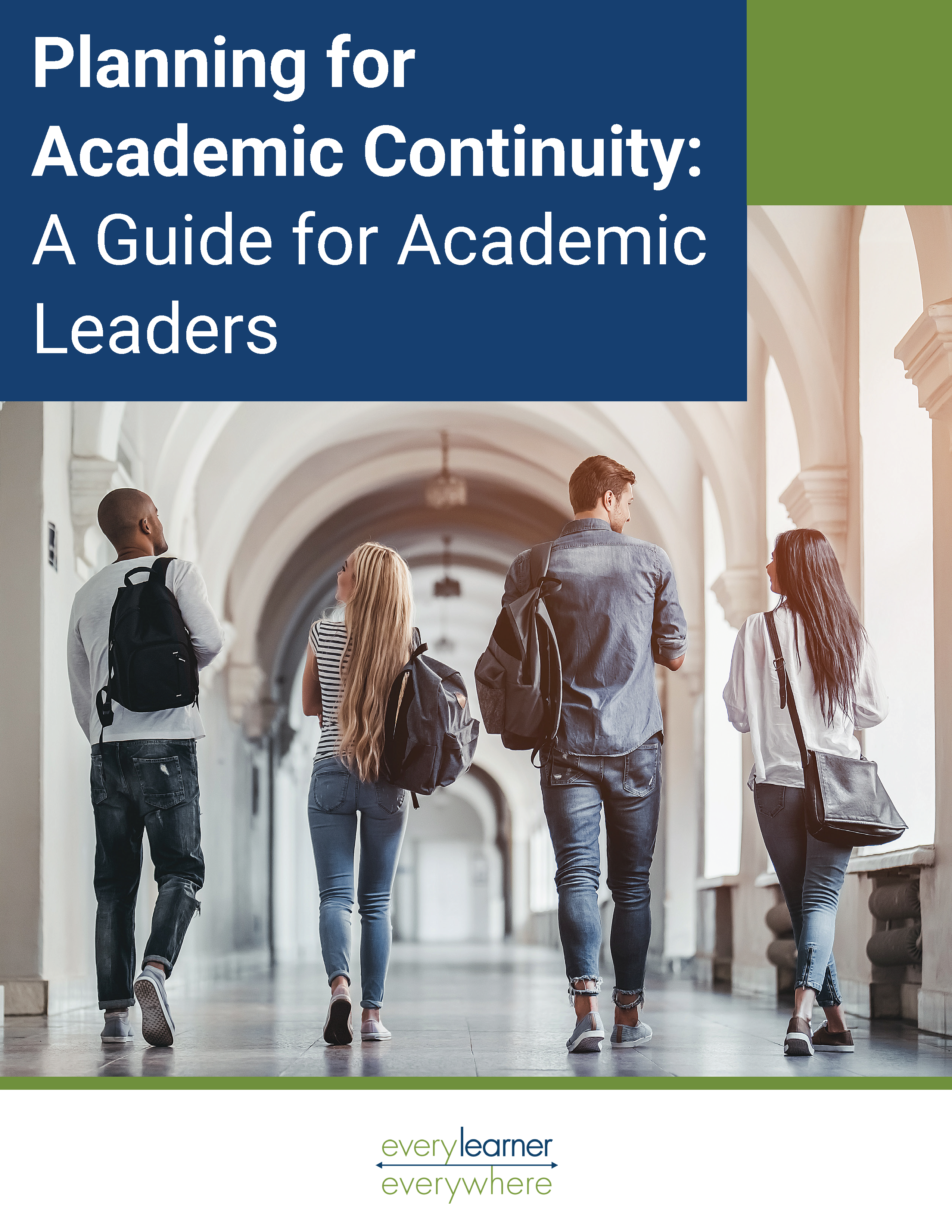
This guide presents results from an analysis of 100 academic continuity plans at U.S. colleges and universities. The results form the basis for recommended academic continuity plan best practices, tools, and templates academic leaders can use to maintain a plan that can be used in both short-term and long-term circumstances.
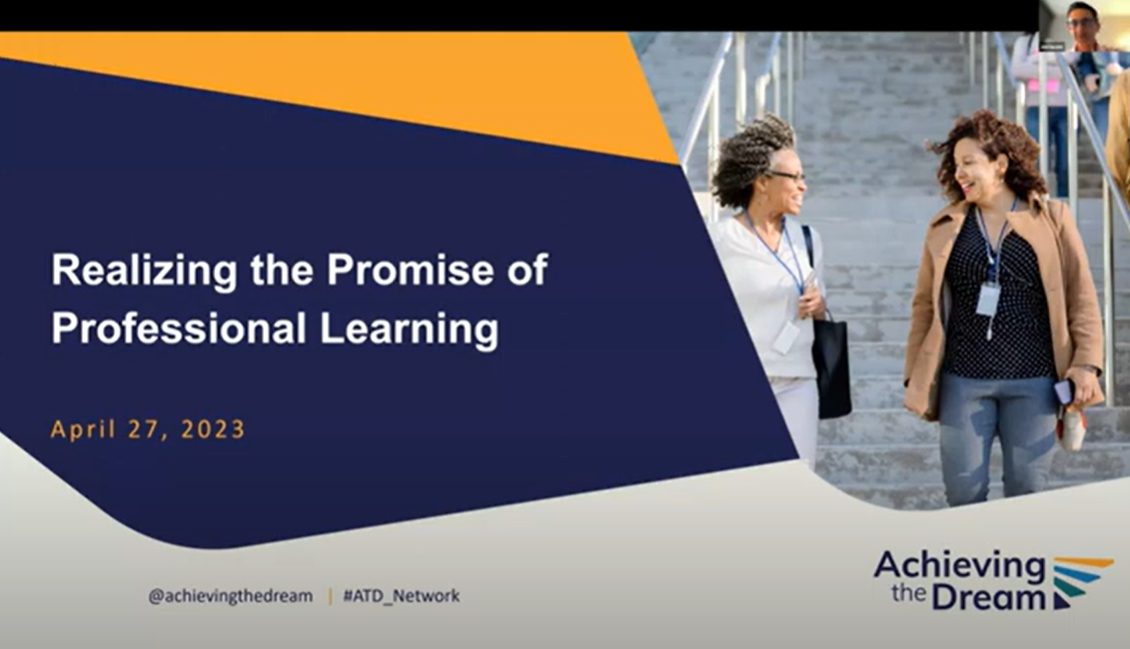
Professional learning, also called Faculty development, in higher education supports student success at the course level.
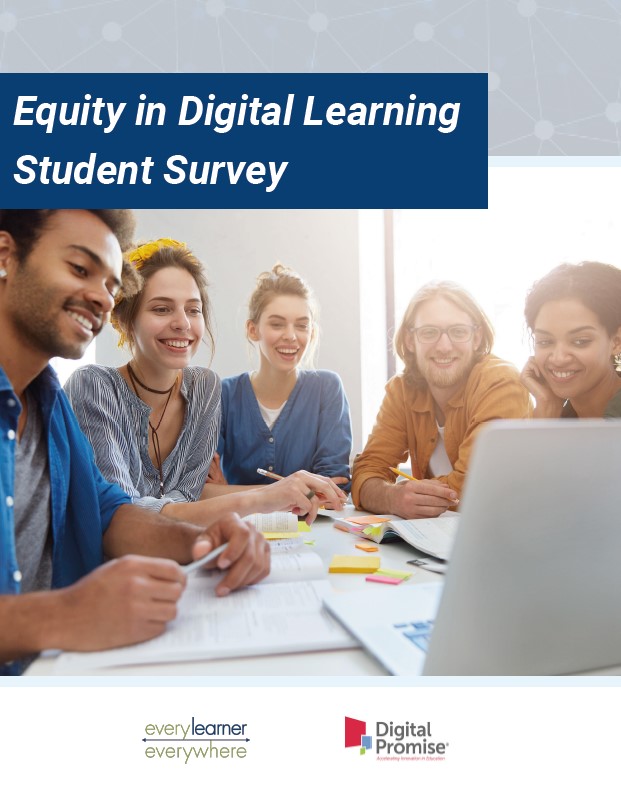
The Equity and Digital Learning Student survey helps higher education departments and faculty self-assess course efficacy.
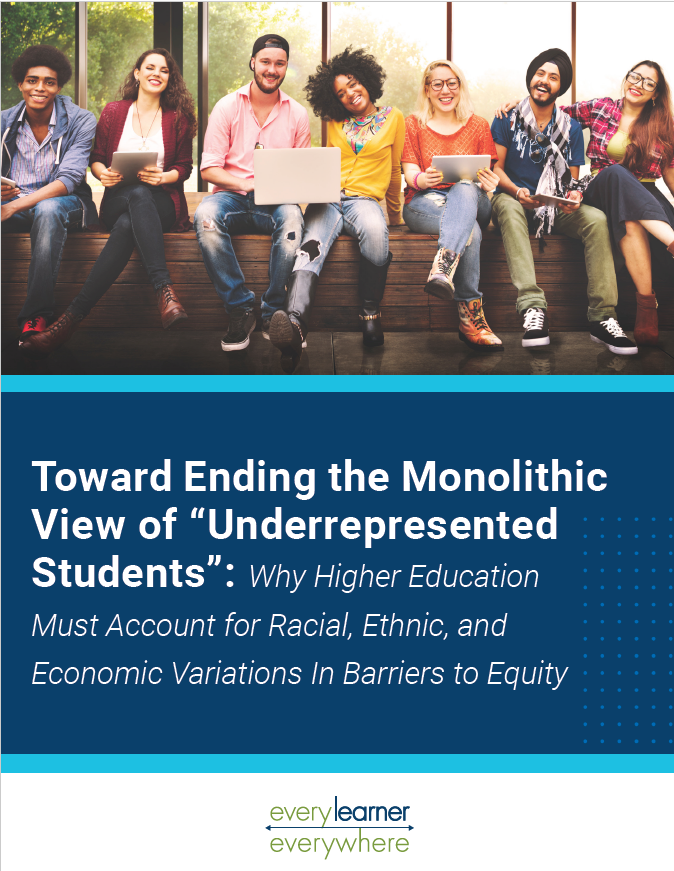
This report synthesizes commentary, research, and original interviews about how higher education has grappled with disaggregating and using student data to confront and close equity gaps for particular student populations.
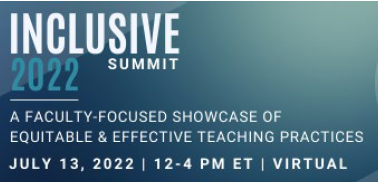
A webinar for faculty support staff and academic leaders who support faculty redesigning courses and leverage educational technologies.
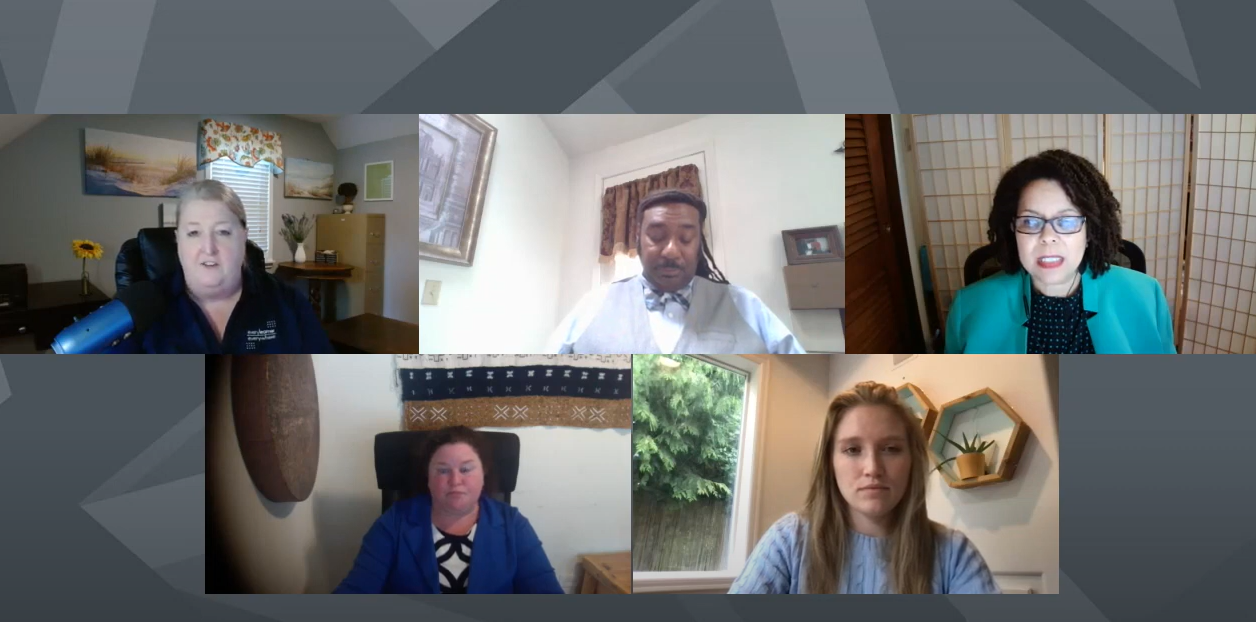
Specialists and practitioners of inclusive teaching answer your questions about strategies and approaches to creating an inclusive learning environment for all students.
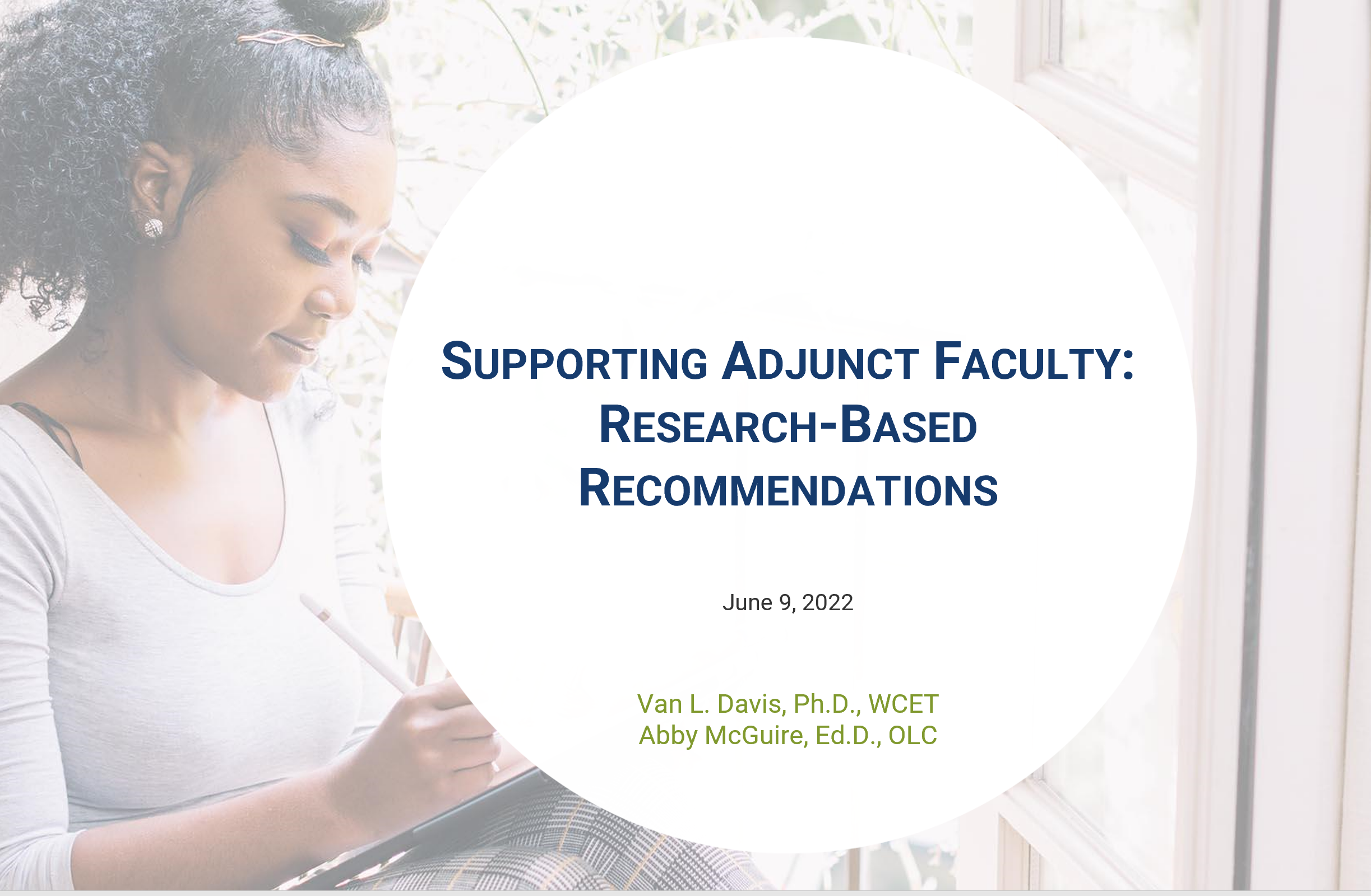
Learn about how institutions can adjust their infrastructure to support online adjunct faculty.
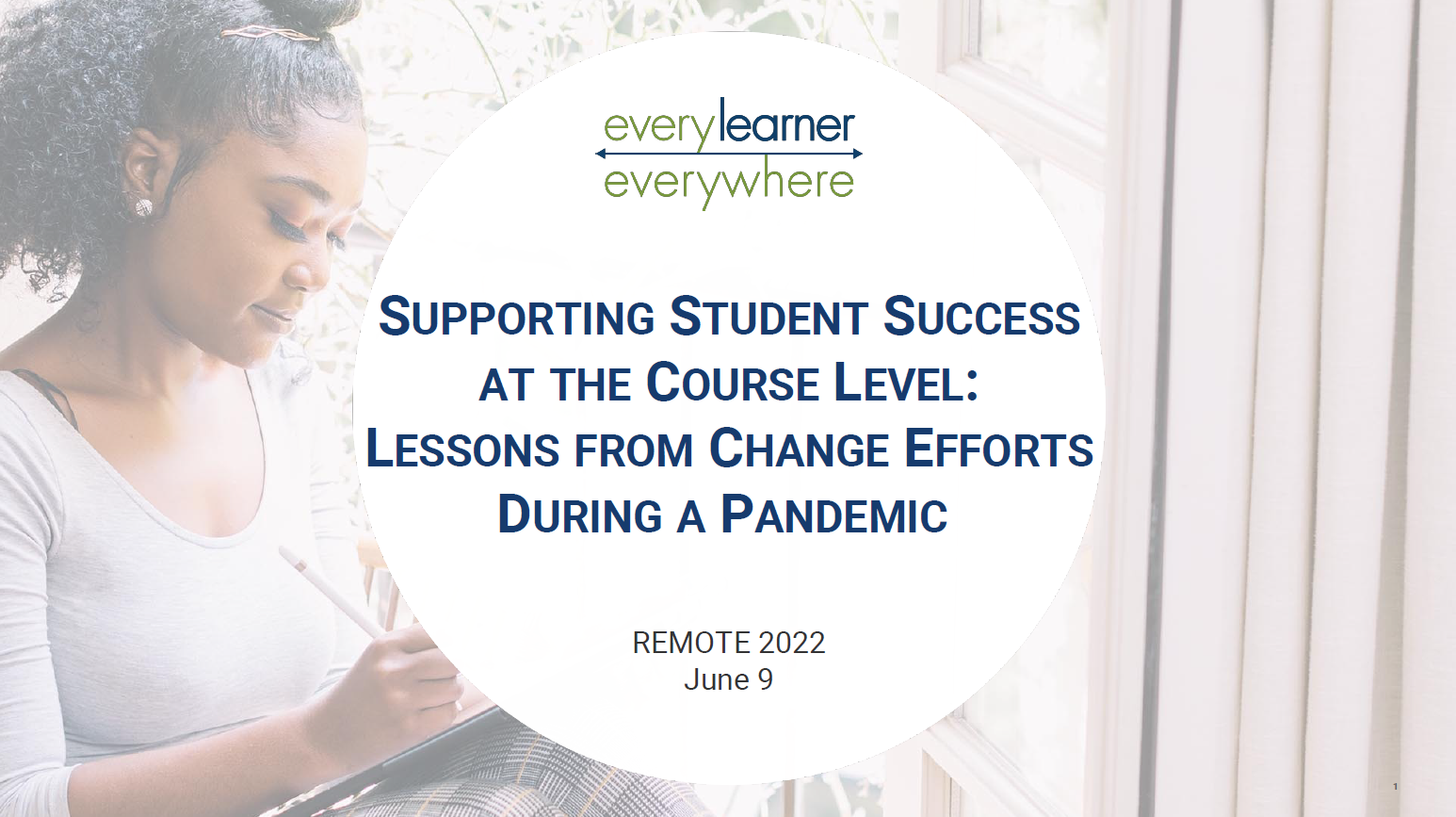
Learn how digital learning tools can give both faculty and students an edge in a time of academic upheaval.
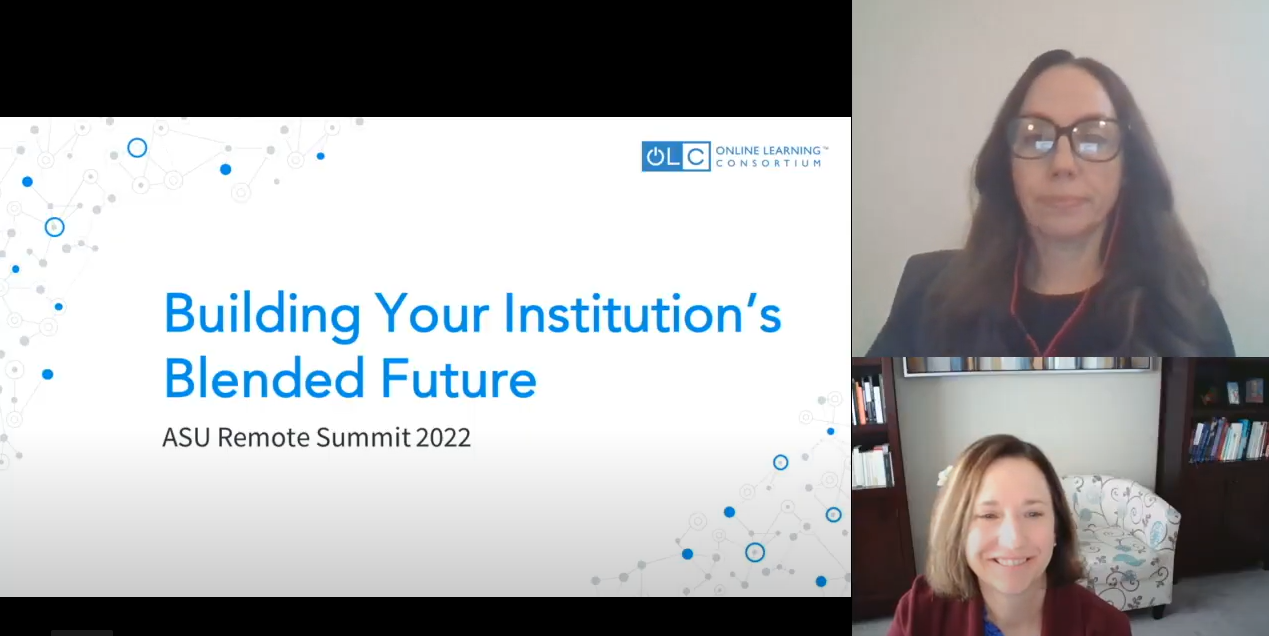
Learn how blended learning supports students and how institutions can future-proof themselves by building the infrastructure for blended degree programs.
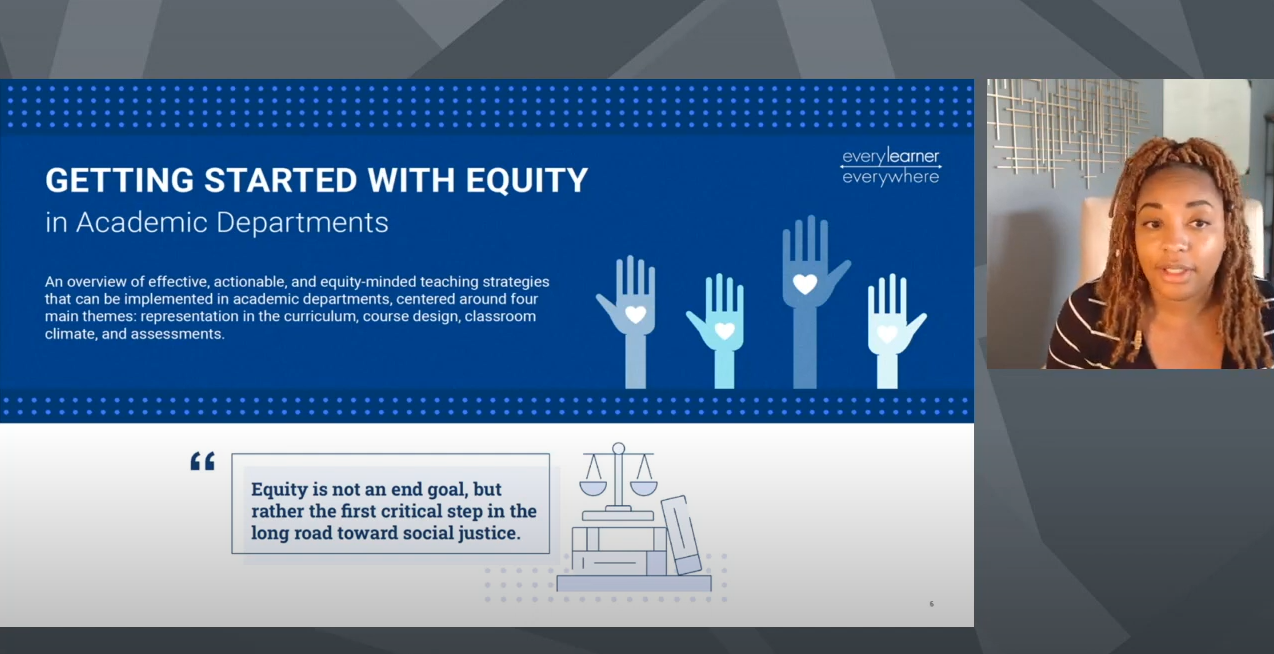
Jessica Rowland Williams talks about various tools and strategies for transforming a department to be more equitable.
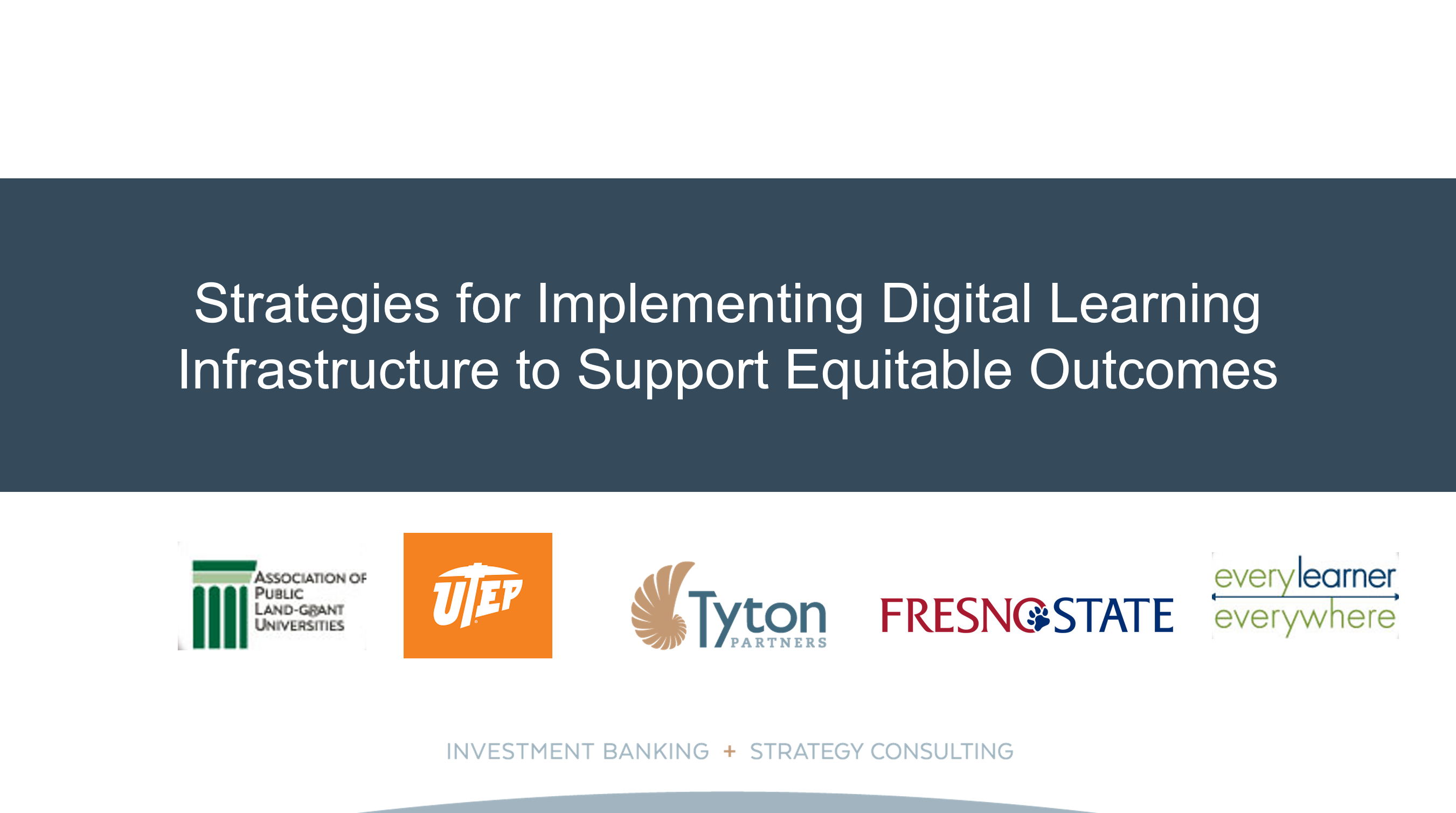
Representatives from institutions that implemented digital learning discuss how these technologies improved student success in lower level courses.
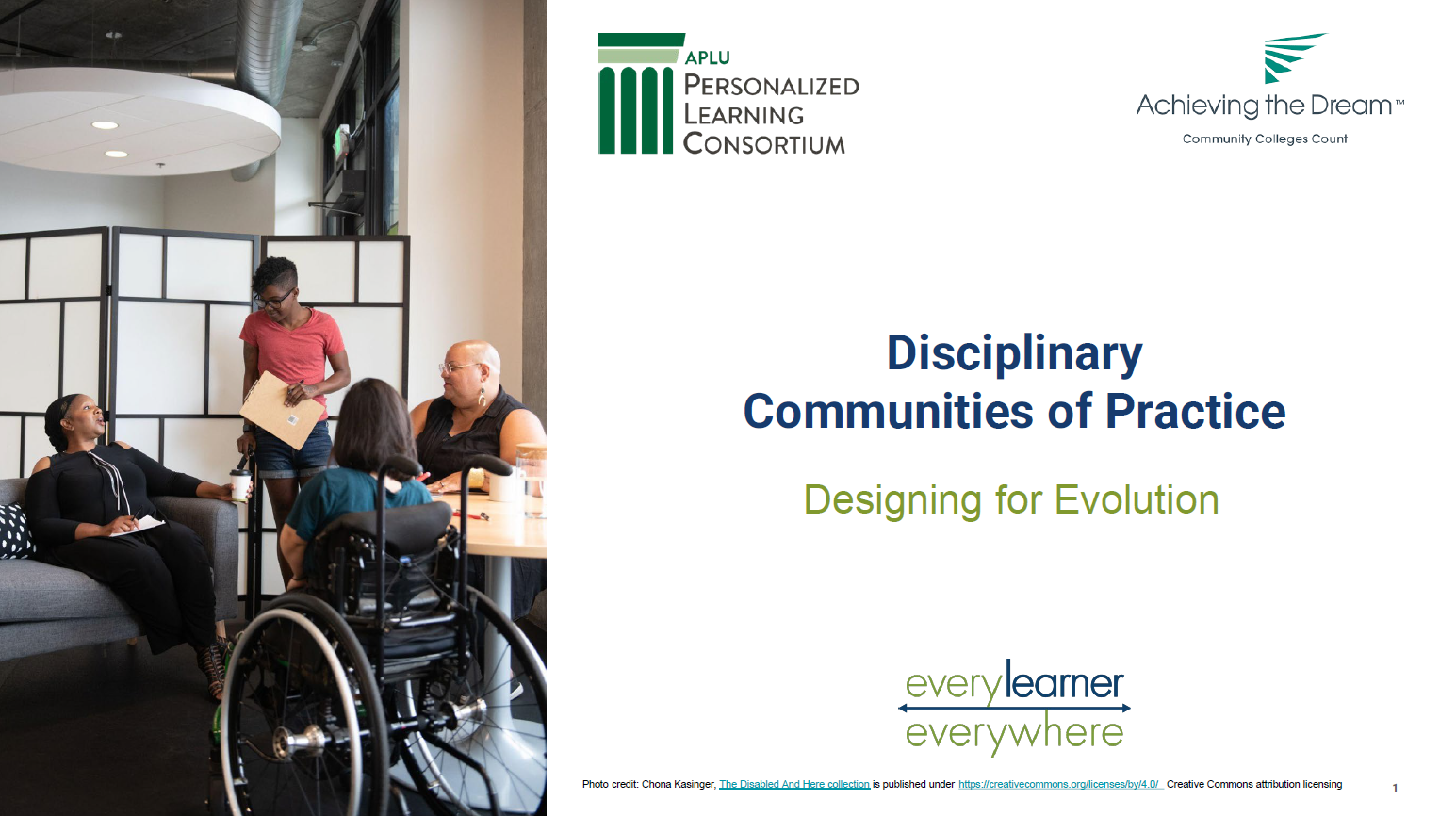
Leaders of various faculty communities of practice discuss what works and what doesn’t.
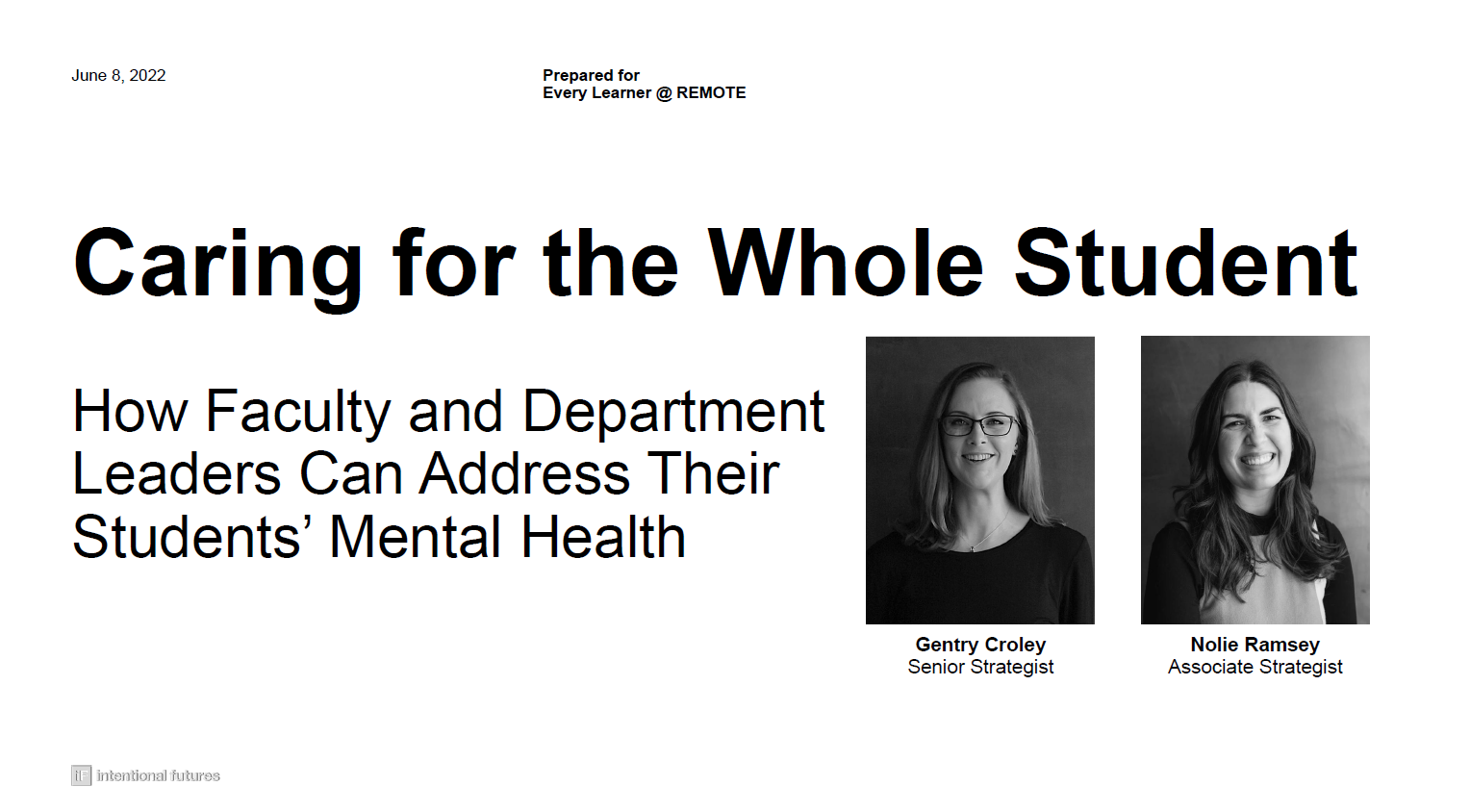
This session provides an overview of the pressures facing today’s students and what faculty and institutions can do to support them.
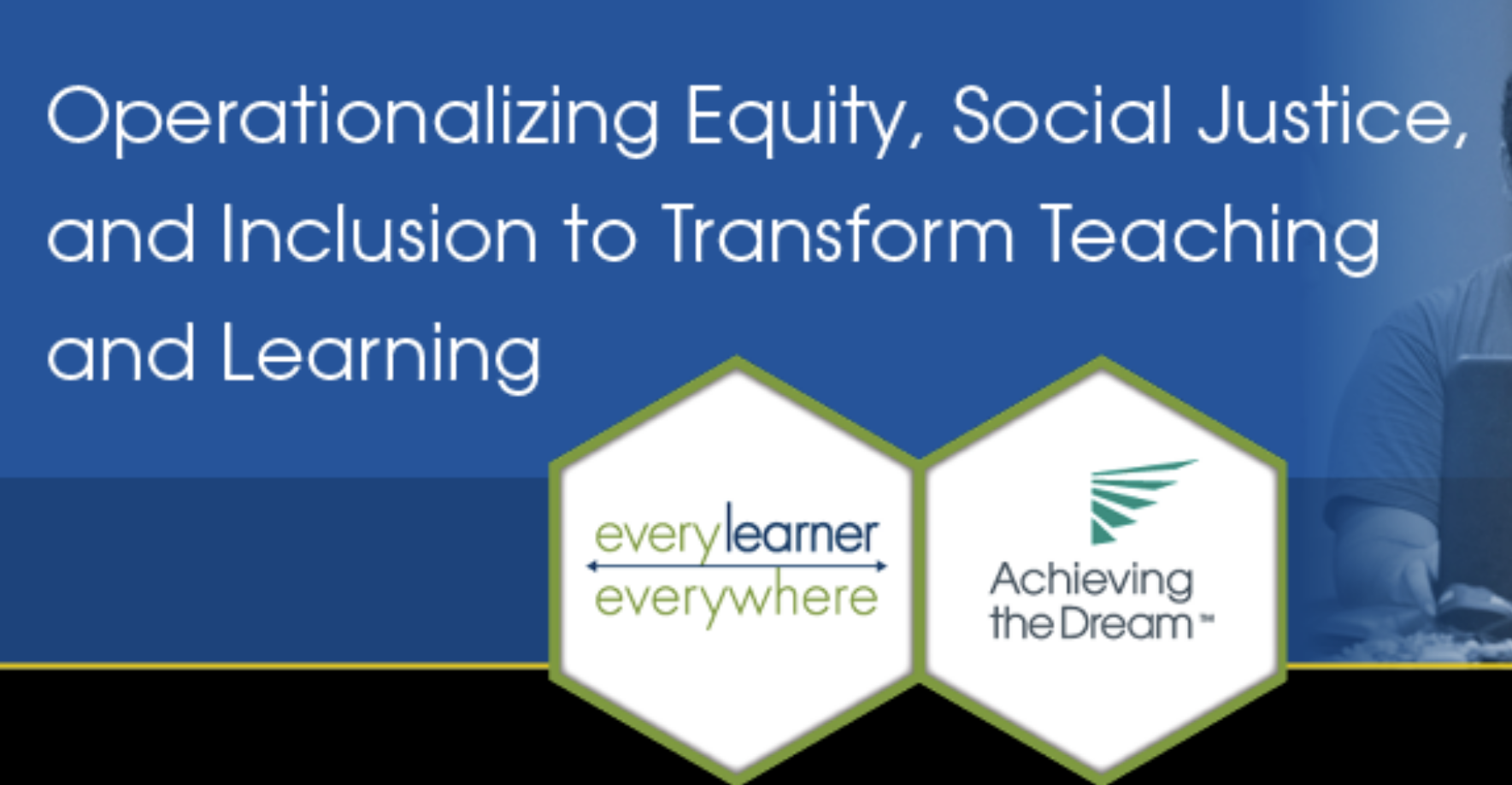
In this webinar, participants engage in dialogue and discourse with panelists about co-creating environments that support and humanize students’ academic experiences while affirming their strengths and potential in the classroom.
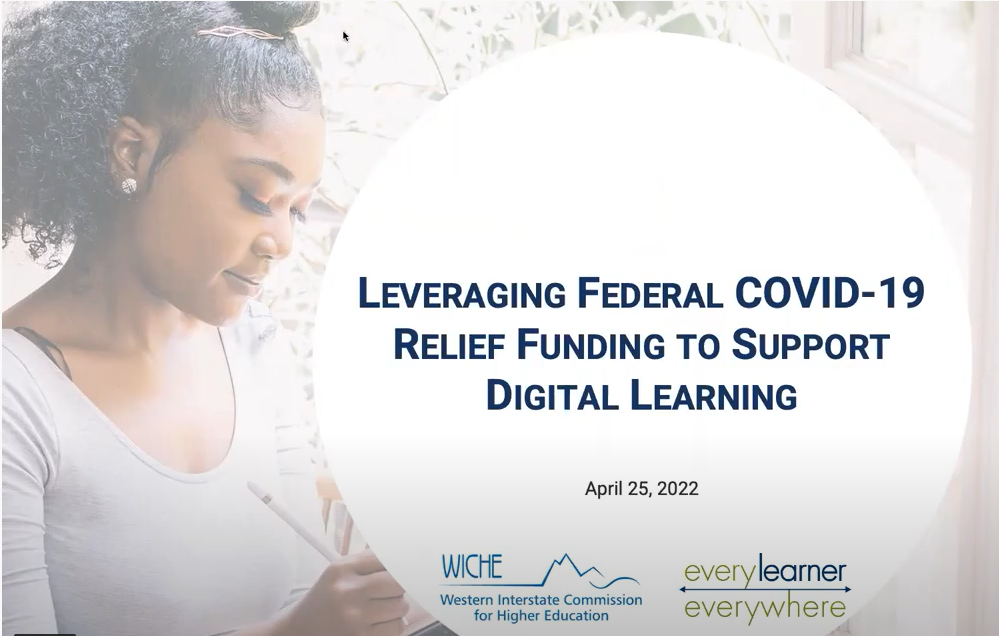
Experts on federal policy and digital learning, and institutional representatives discuss the opportunities afforded by federal Covid resources.
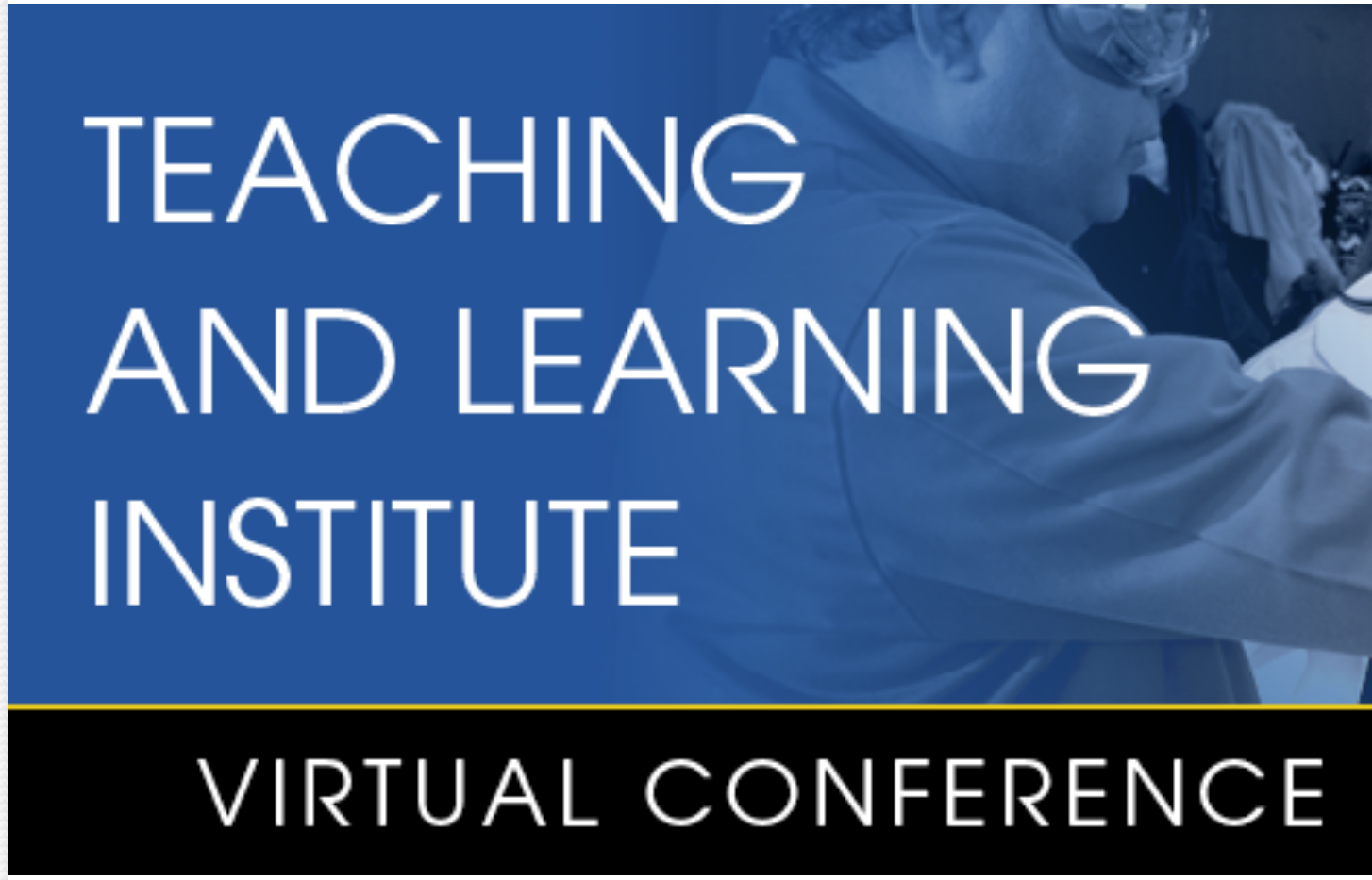
Three students who are ATD fellows share their first-hand accounts of culturally responsive teaching practices and the impact on their learning experiences.

This workshop provides examples of successful innovative and digital assessment approaches that center students and allow for authentic and culturally responsive measurement of student learning.
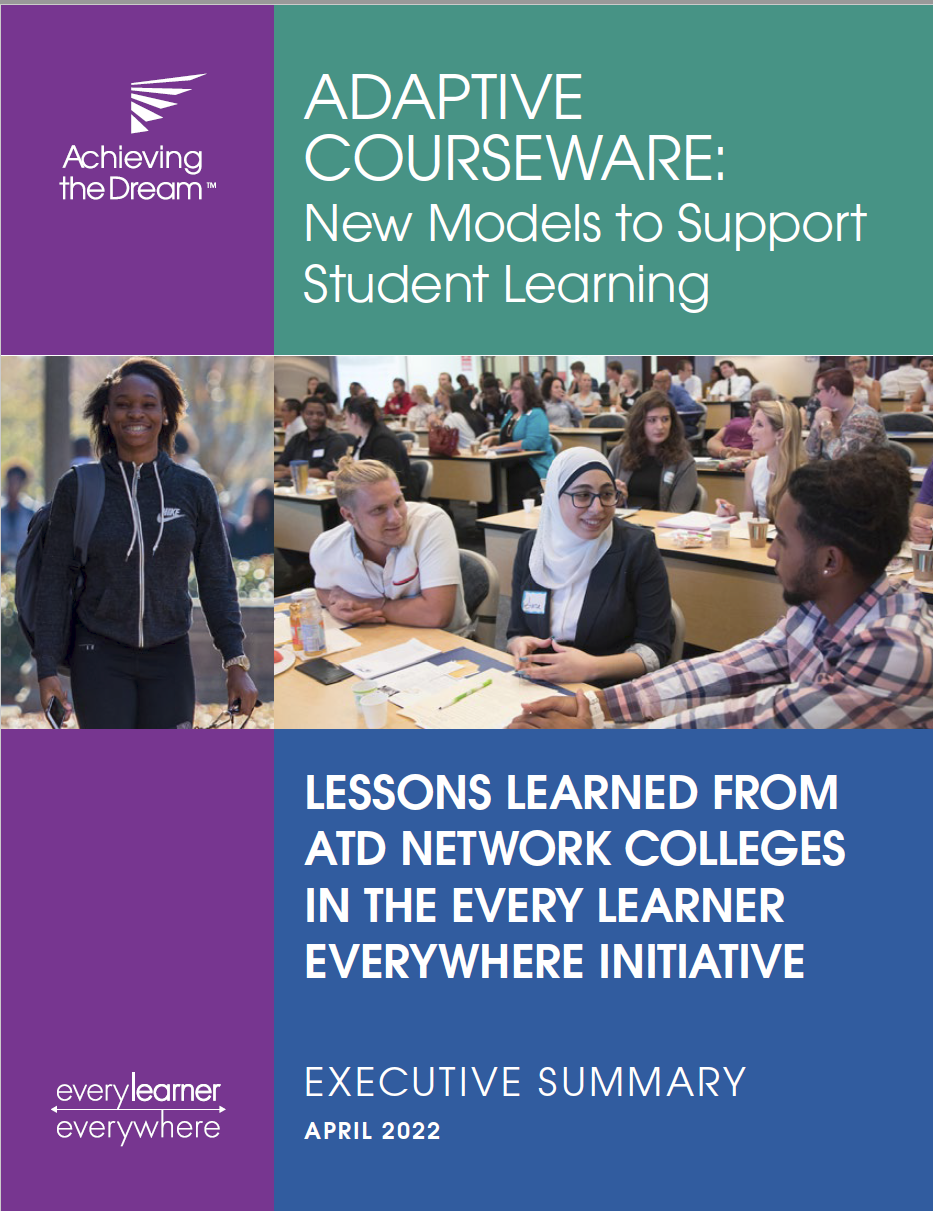
This report is an executive summary of the findingins following the implementation of digital learning tools at seven community colleges.
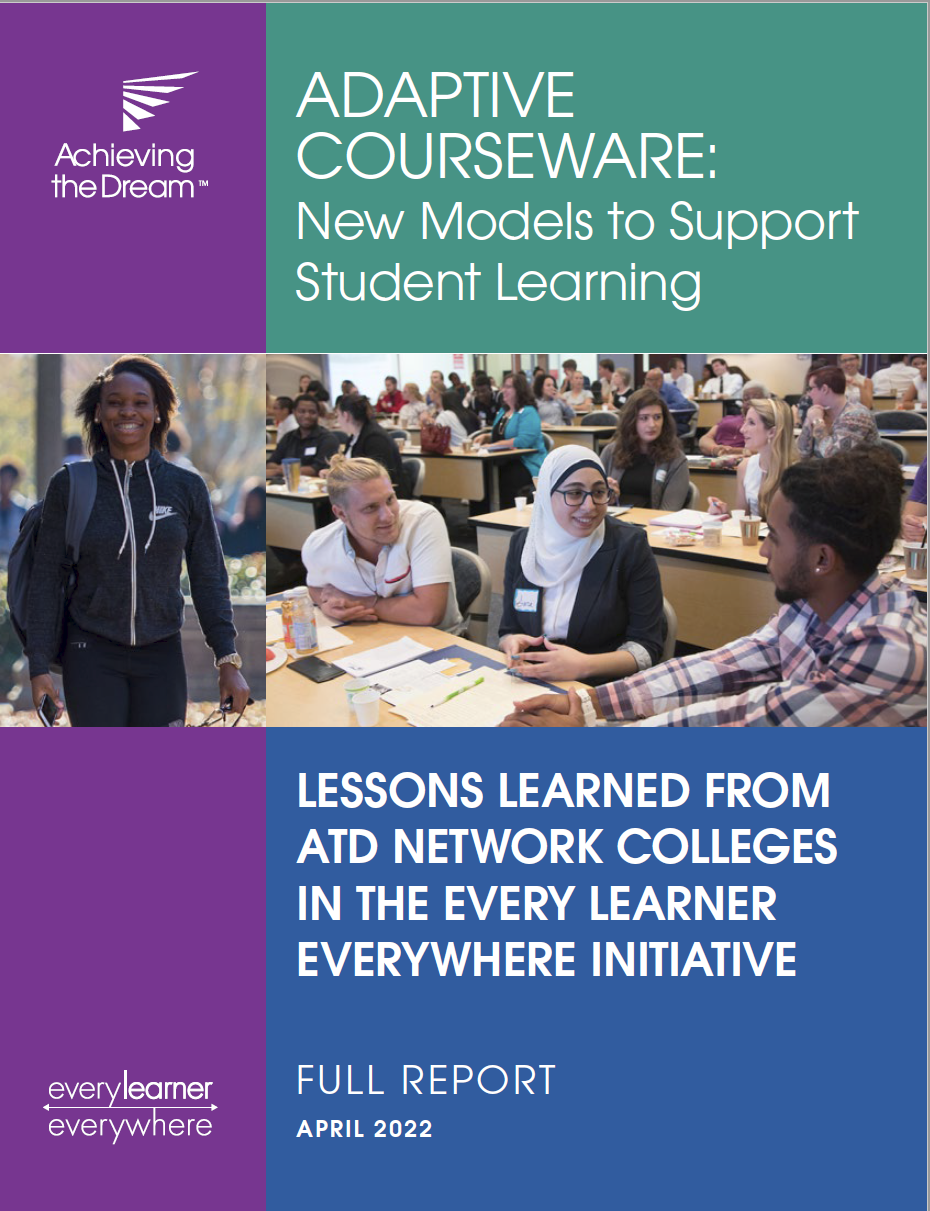
Full report of digital learning adoption in seven community colleges in the ATD network.
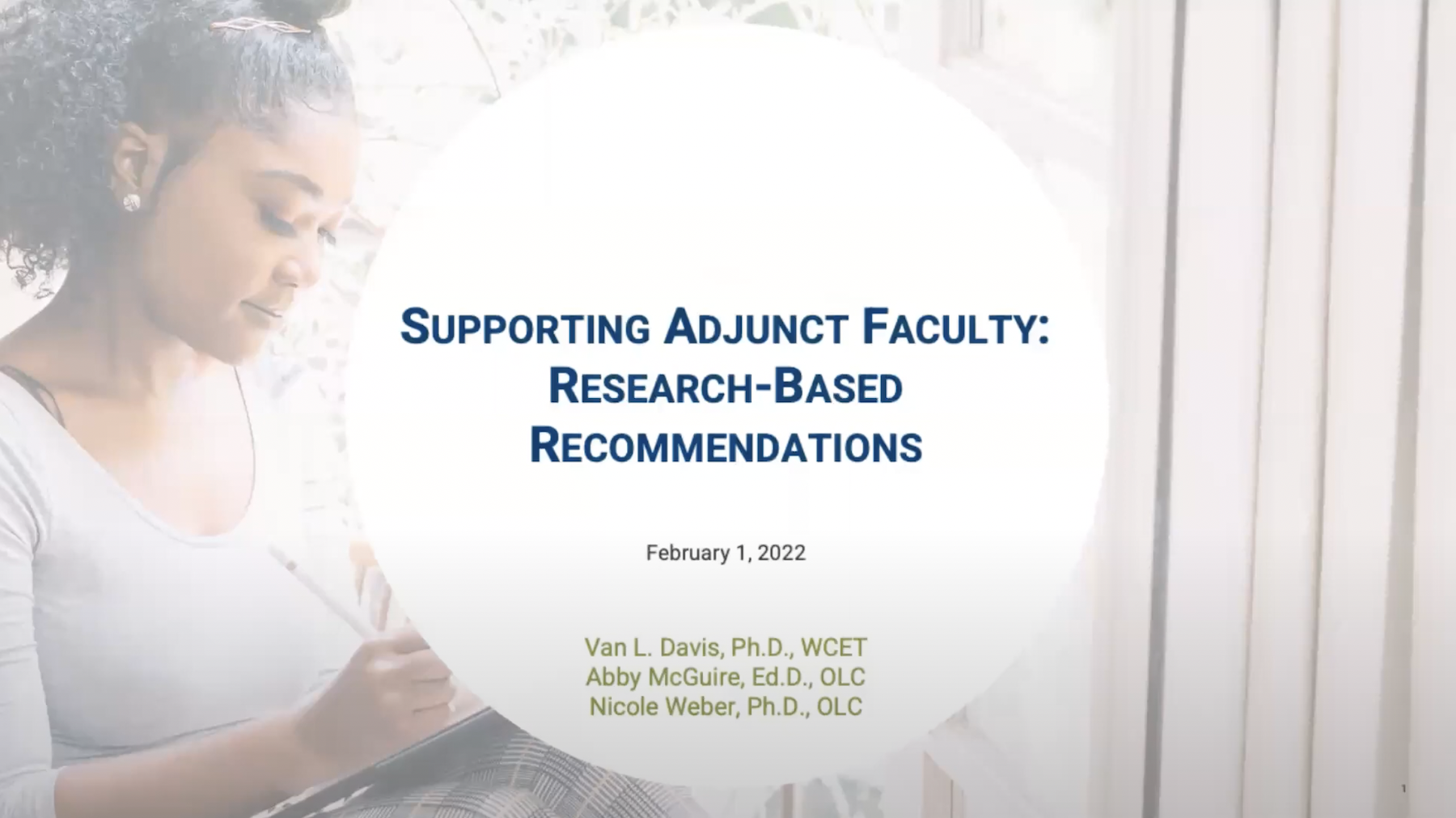
This webinar will highlight the findings of the WCET and OLC Adjunct Faculty Survey and provide research-based recommendations for supporting institutional leaders, support staff who work with adjunct faculty, and adjunct faculty members themselves.
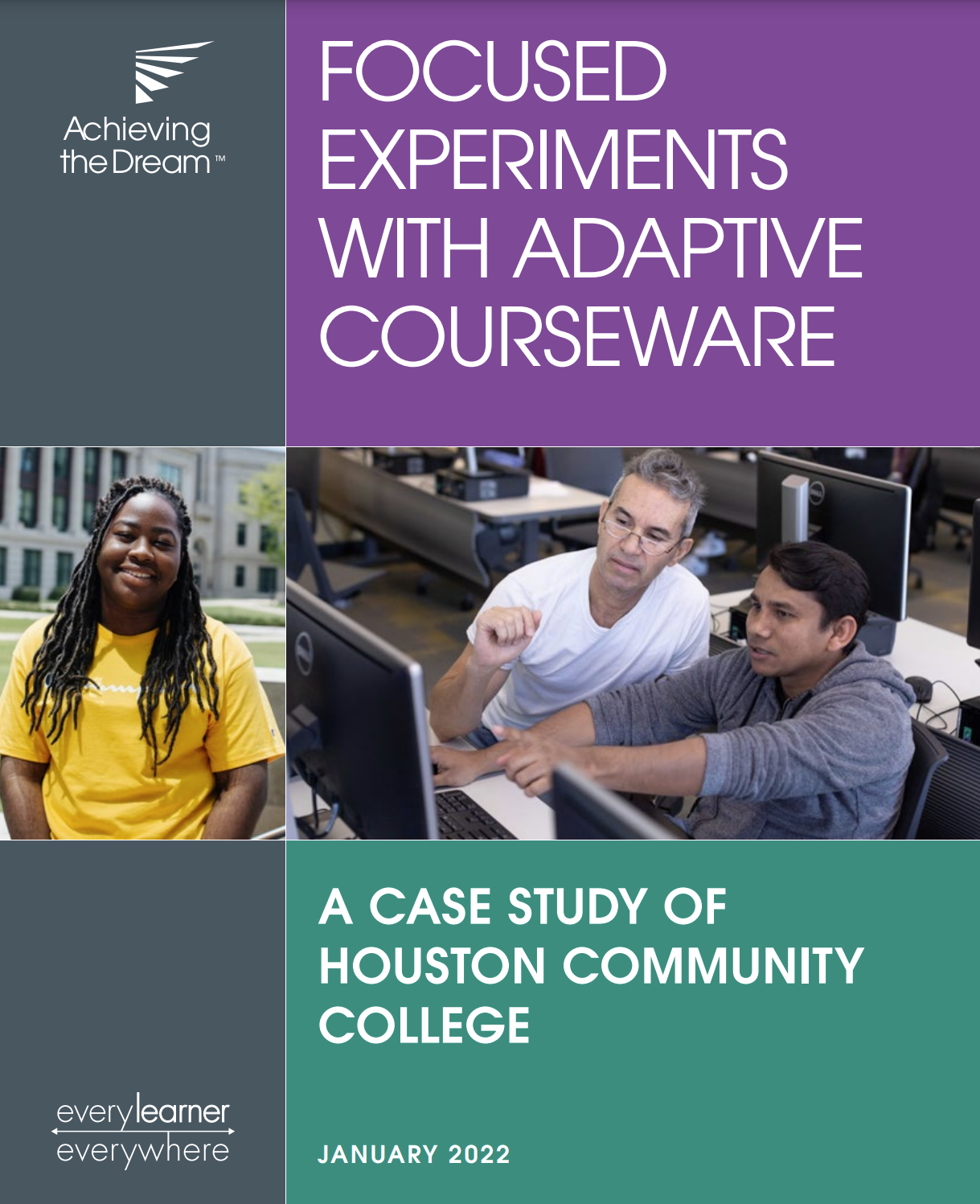
Faculty at HCC led efforts to implement adaptive courseware in introductory mathematics and economics courses.
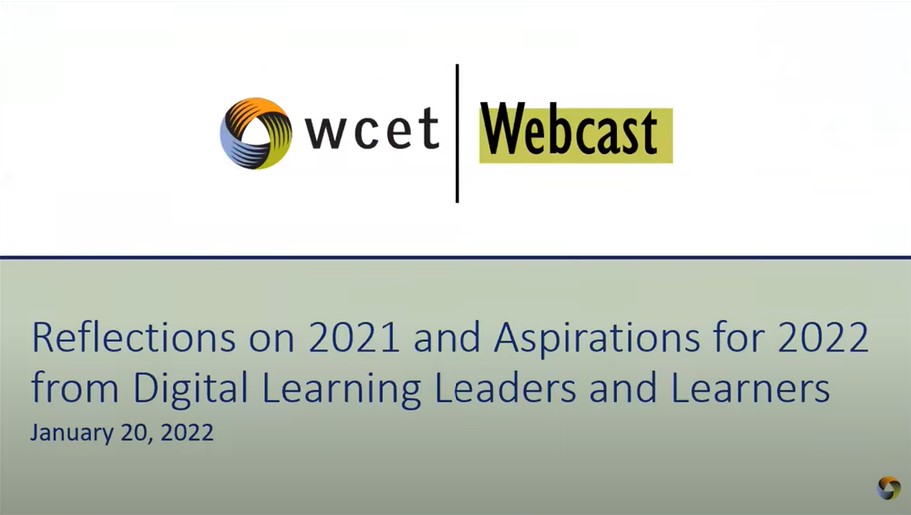
In this webcast, our passionate and inspiring conversationalists shared hopes and aspirations for what’s to come for Higher Education in 2022.

Dr. Jeremiah J. Sims discusses the impact on students of the Washington State Guided Pathways Initiative in Diversity, Equity, Antiracism, and Leadership (IDEAL) Fellows Program.
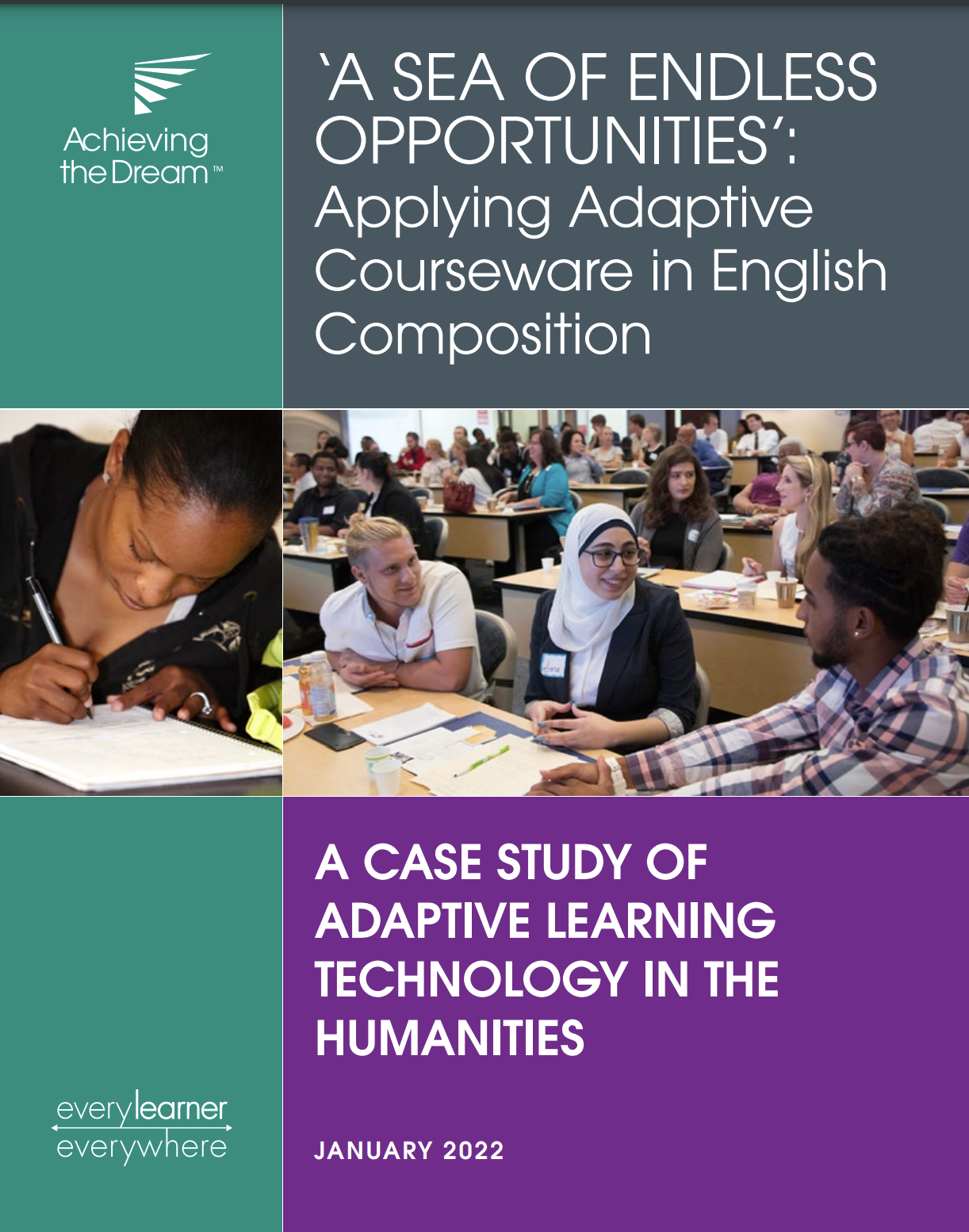
A case study on applying adaptive learning technology in English Composition to help more students persist and succeed.

A case study on integrating adaptive tools into course redesign provides instructional design support and integrated adaptive technology.
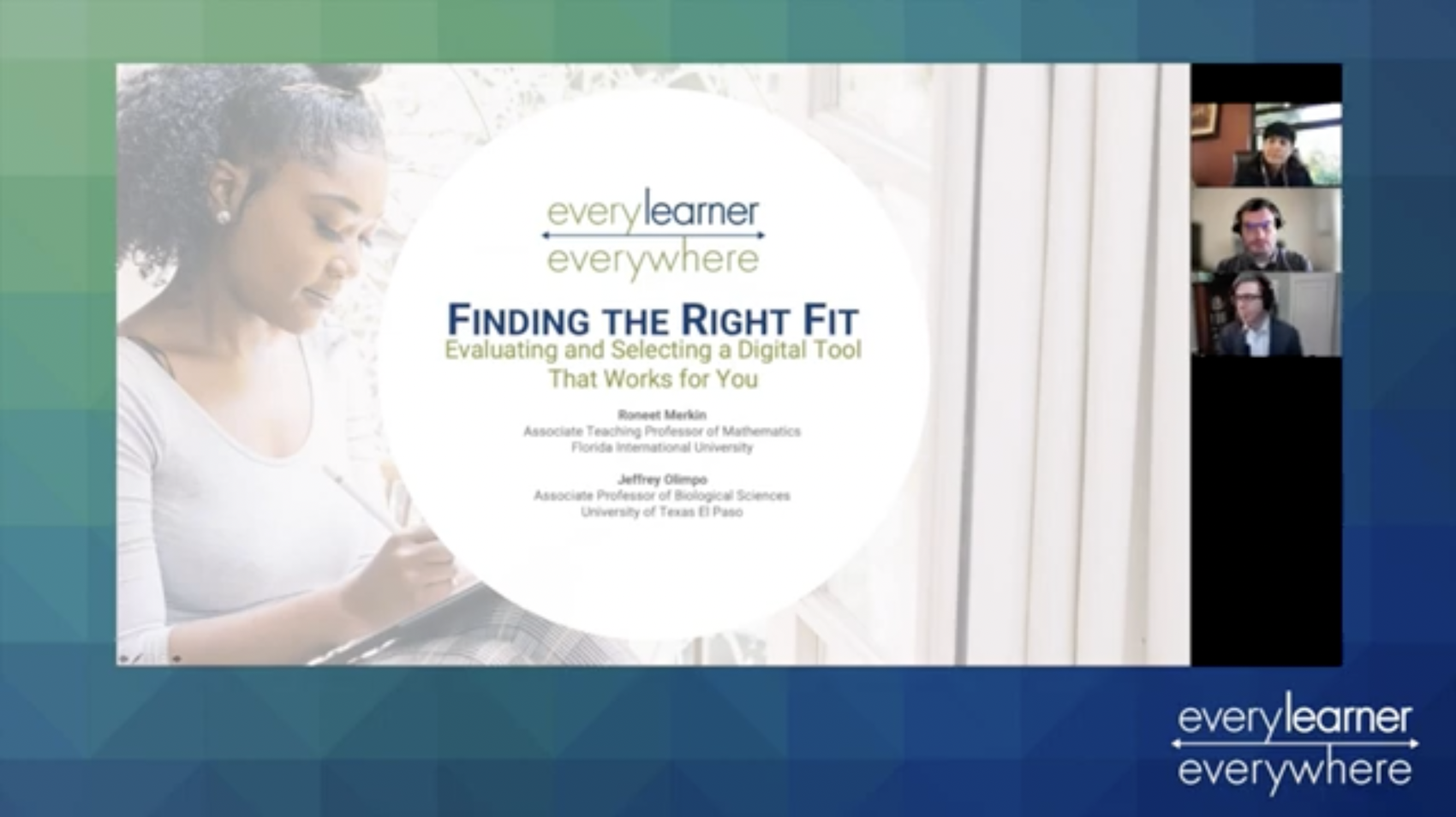
In this session, faculty and academic leadership share the process of evaluating, selecting, or building adaptive courseware to be implemented in their courses and on their campuses.
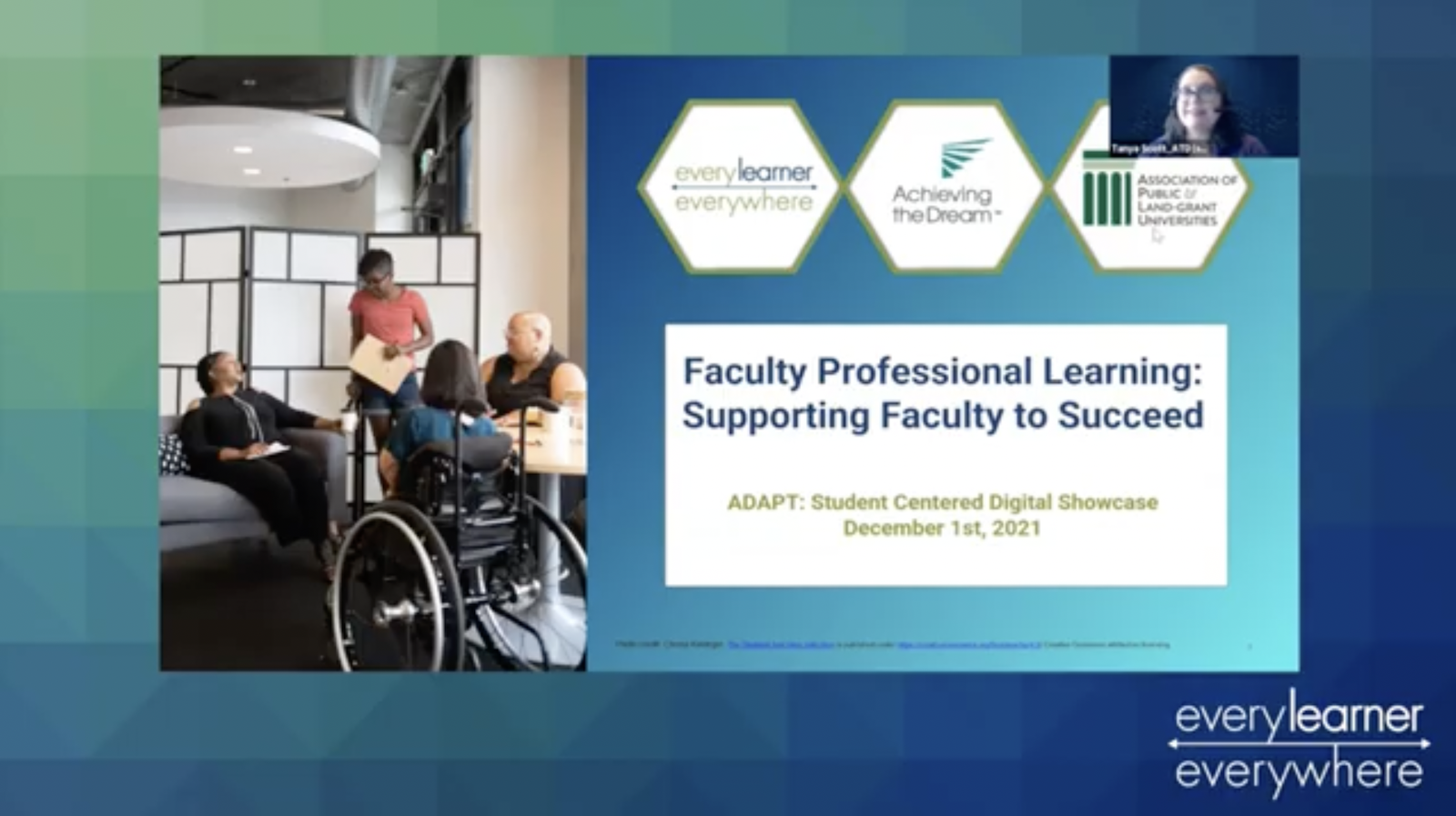
This faculty professional learning session helps faculty and educators to identify and engage a strategic set of stakeholders to support a strong implementation plan for adaptive courseware.
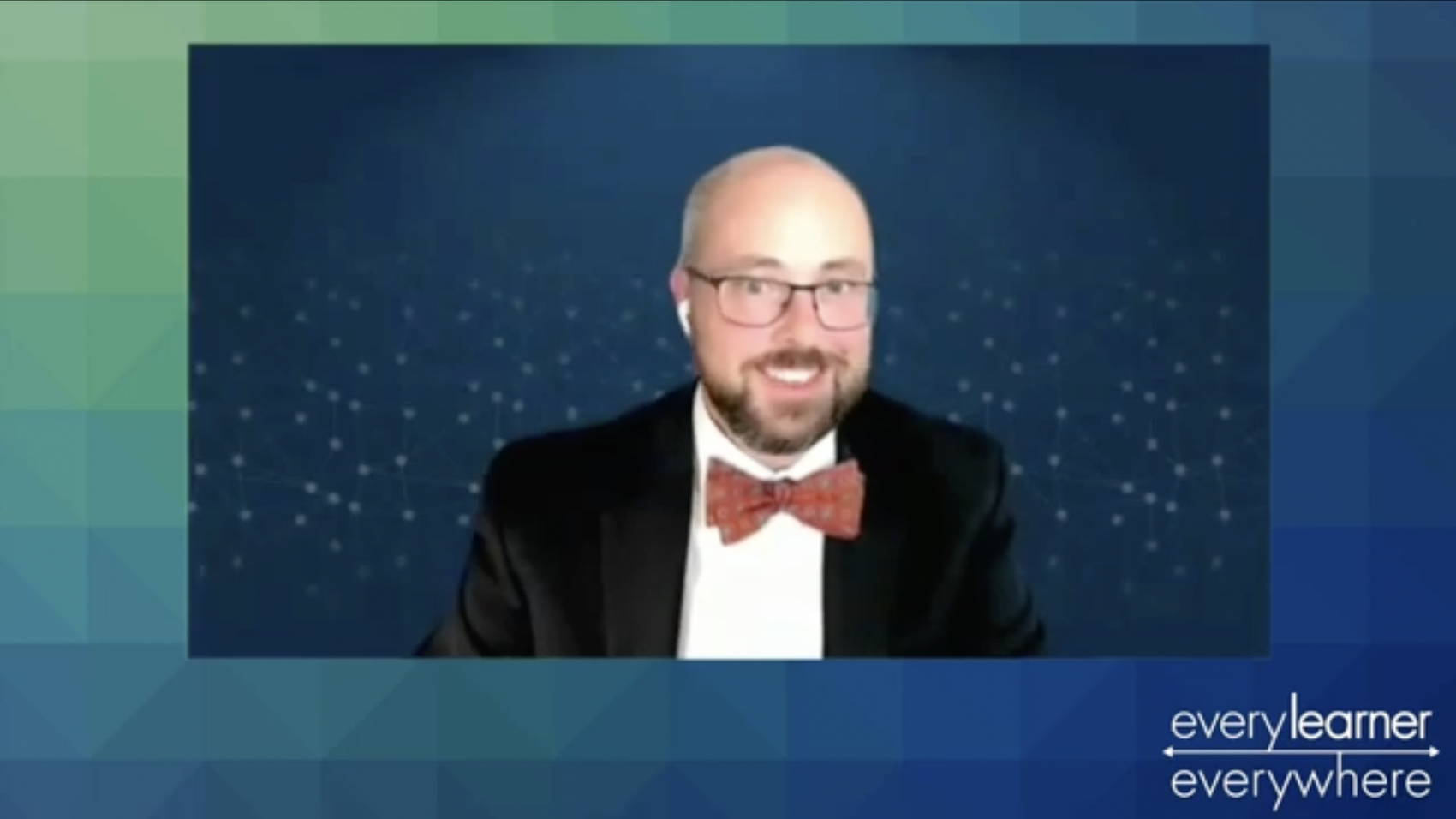
Van Davis, Every Learner Everywhere shares Key Takeaways & Call to Action from ADAPT 2021.
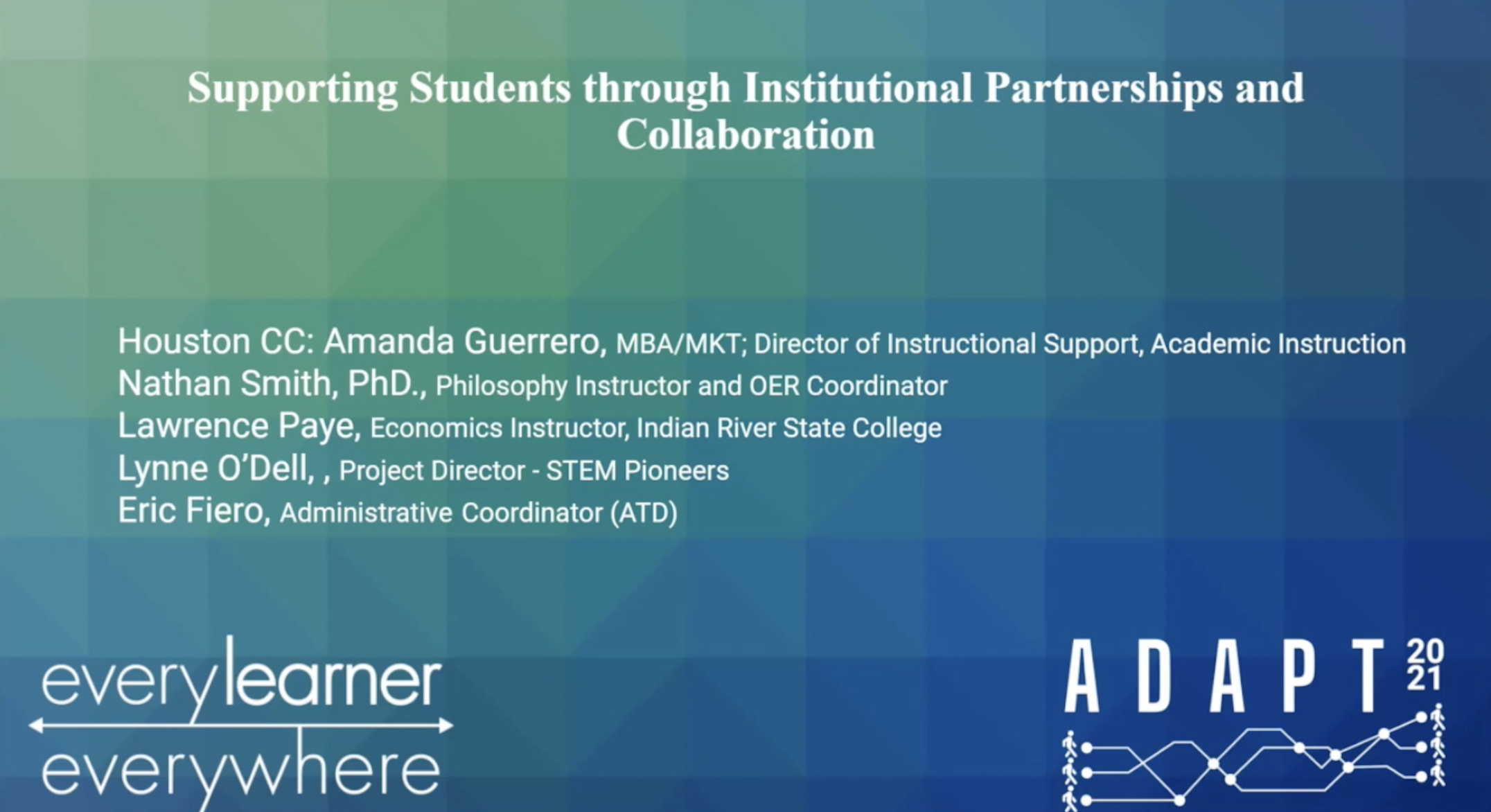
Panelists discuss how adaptive courseware supported broader institutional and faculty-led efforts to improve student outcomes.
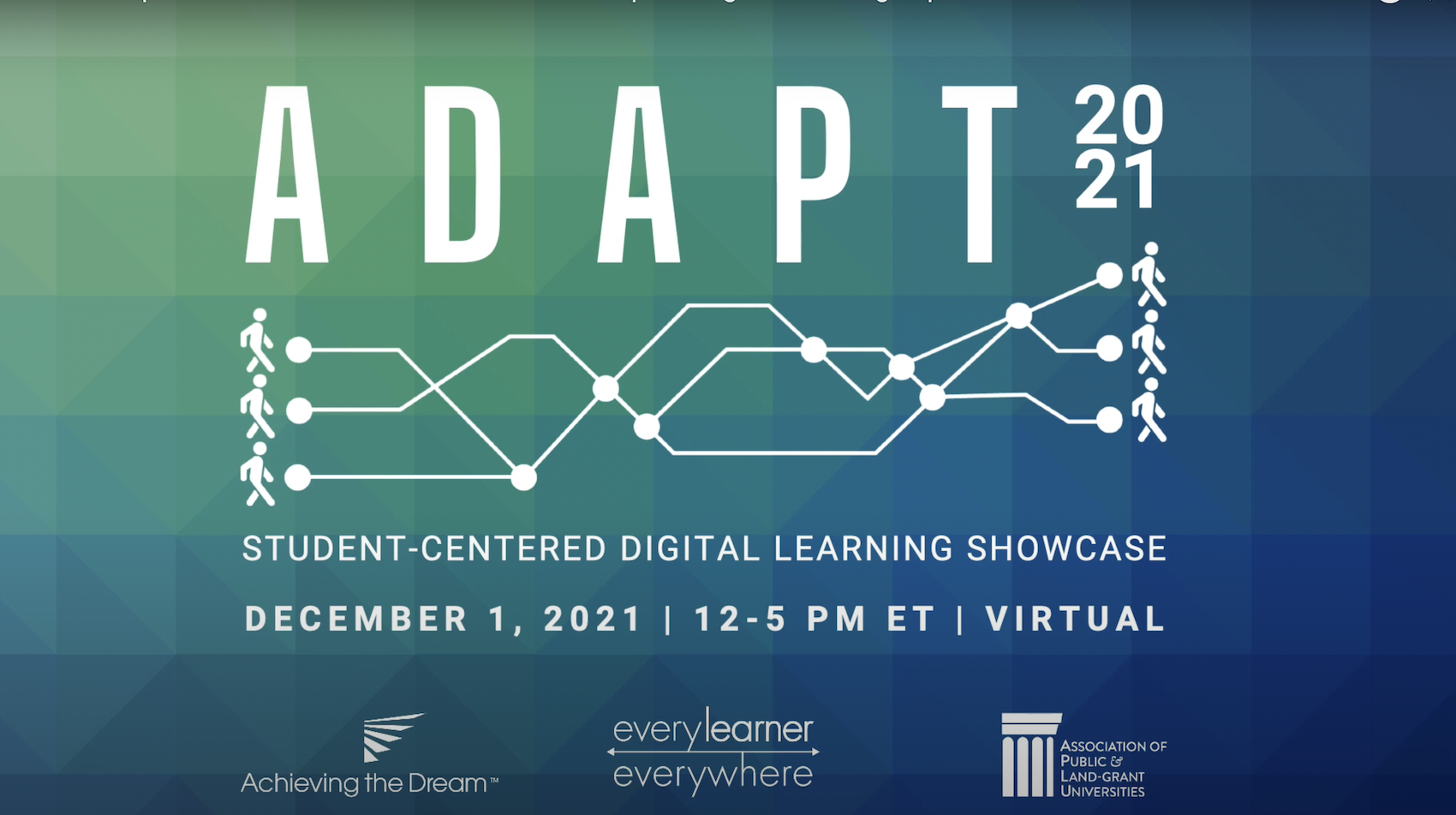
Students discuss their experiences with adaptive courseware and other learning technologies, and how these have affected their learning in different courses.
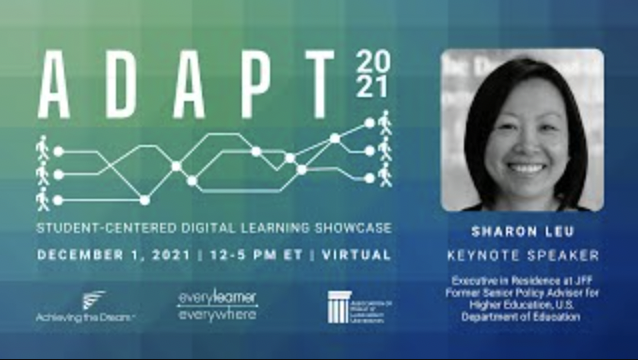
An opening plenary on the critical role technology plays in increasing access to educational and employment opportunities for post-secondary learners.
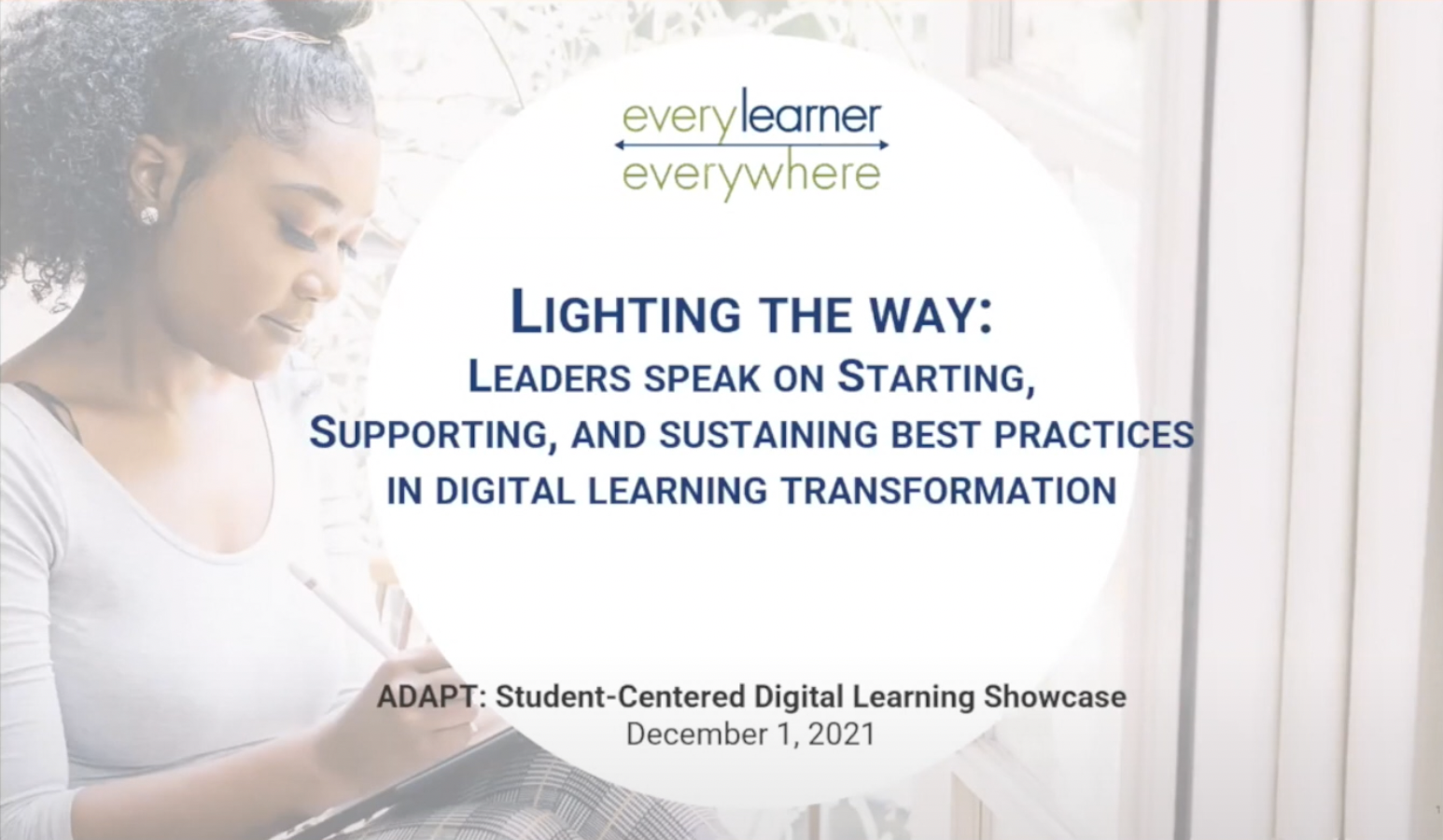
Academic leaders share their experiences and advice for approaching, sustaining, and scaling best practices with adaptive learning.
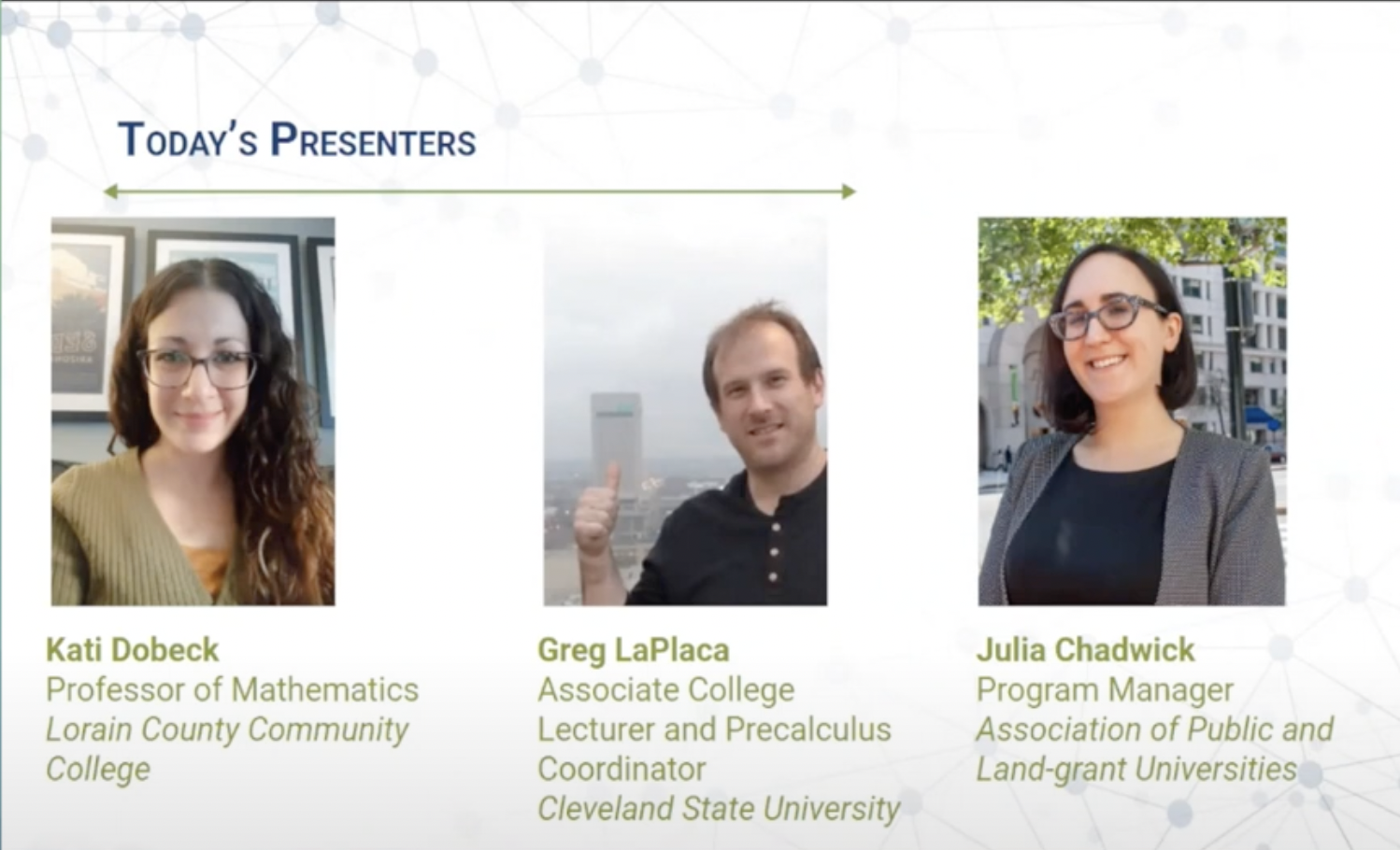
This session will explore how faculty leverage real time learning data analytics from adaptive courseware dashboards to guide their instruction.
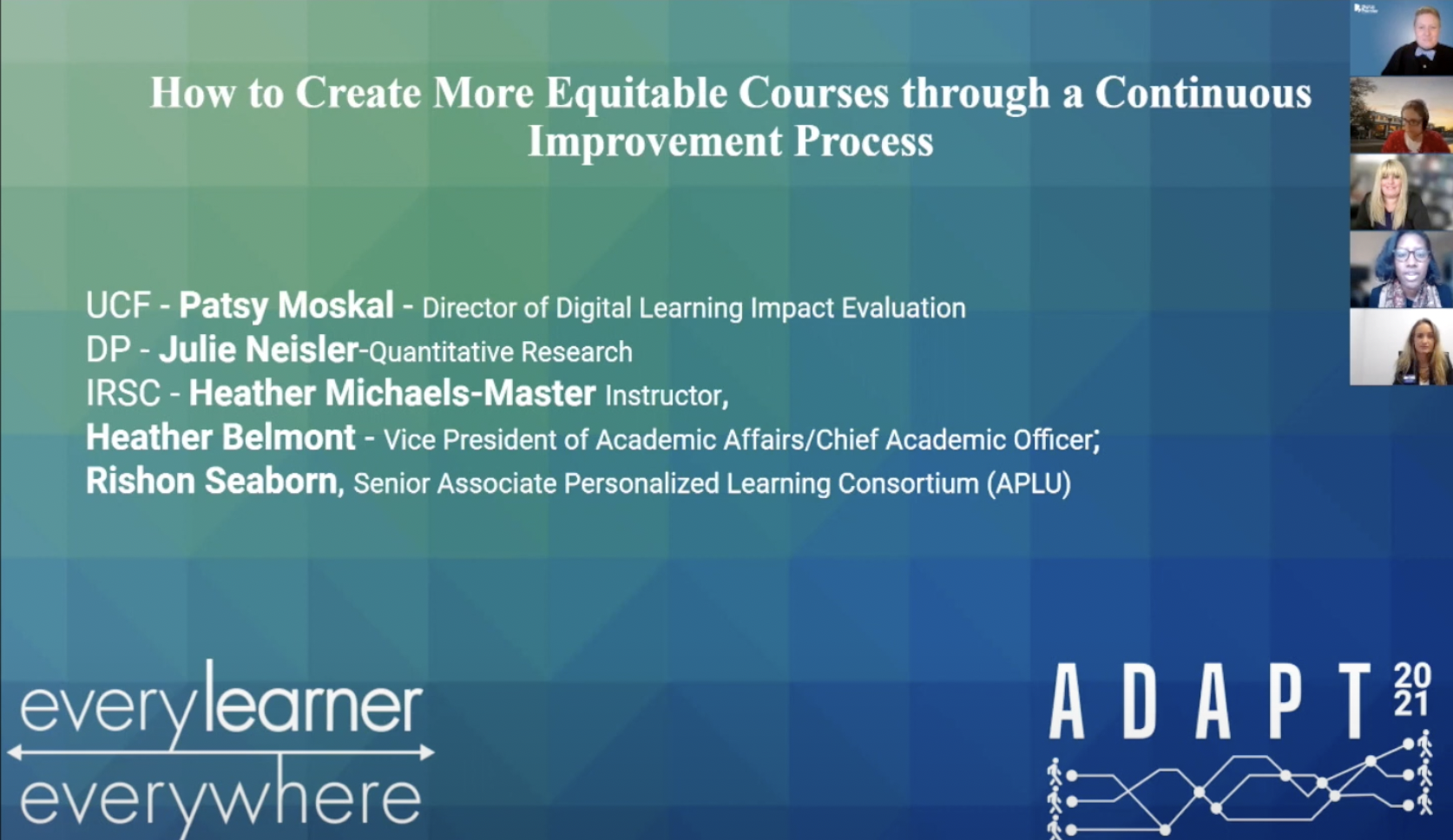
Faculty and educational researchers describe how to refine and improve courses; evaluate the impact of pedagogical changes; and center quality research design.
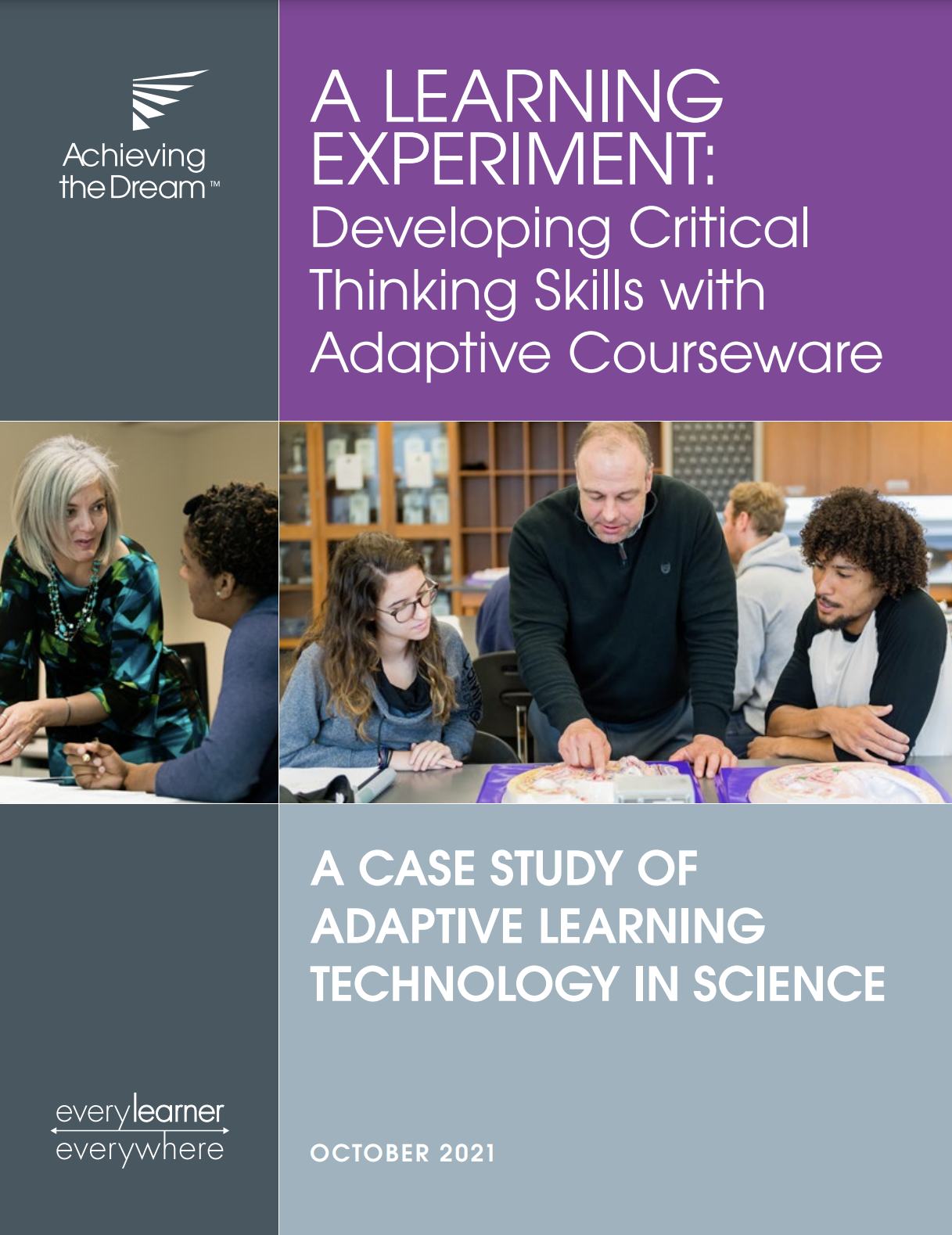
The study suggests that adaptive learning technology helped students who need support with prerequisite concepts, provided tools to help guide students through complex, multistep processes, gave faculty insights into concepts students were struggling with, and reduced the cost of course materials.
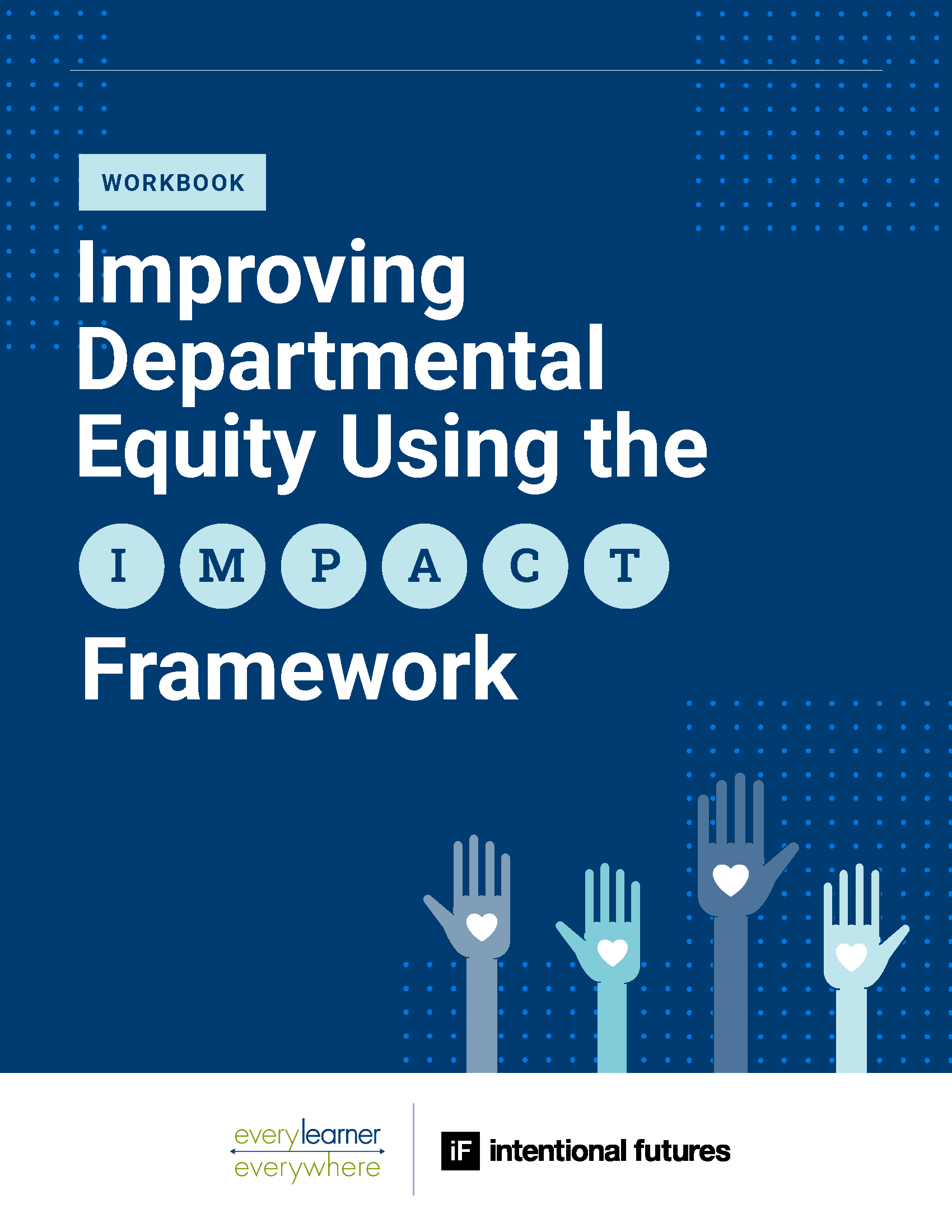
This resources includes instructions and worksheets to redress racism perpetuated by academic departmental policies and practices.
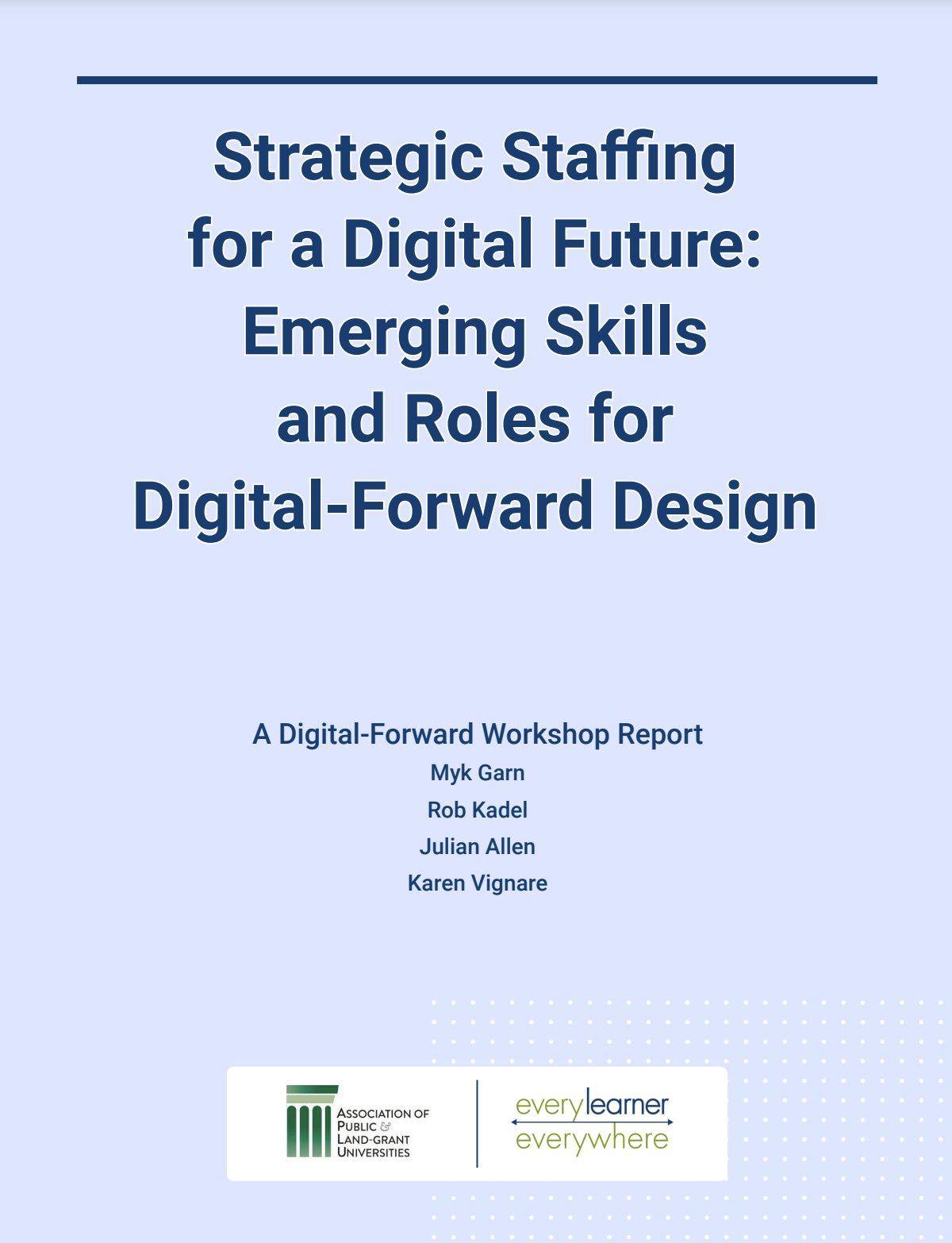
An overview of the APLU Winter 2021 Digital-Forward Skills and Roles Workshop, which identified and described emergent digital-forward skill sets and roles.
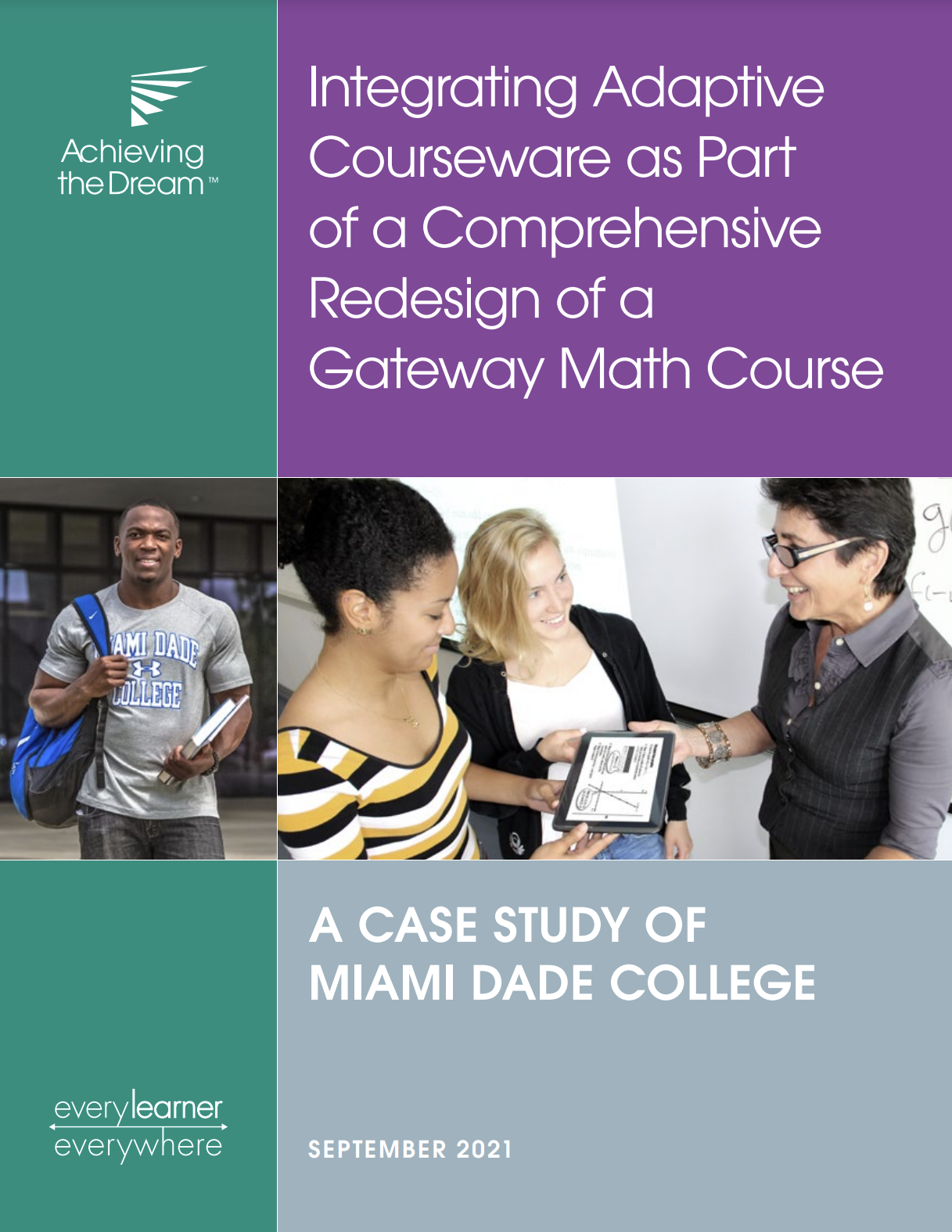
Miami Dade College: Integrating Adaptive Courseware as Part of a Comprehensive Redesign of a Gateway Math Course
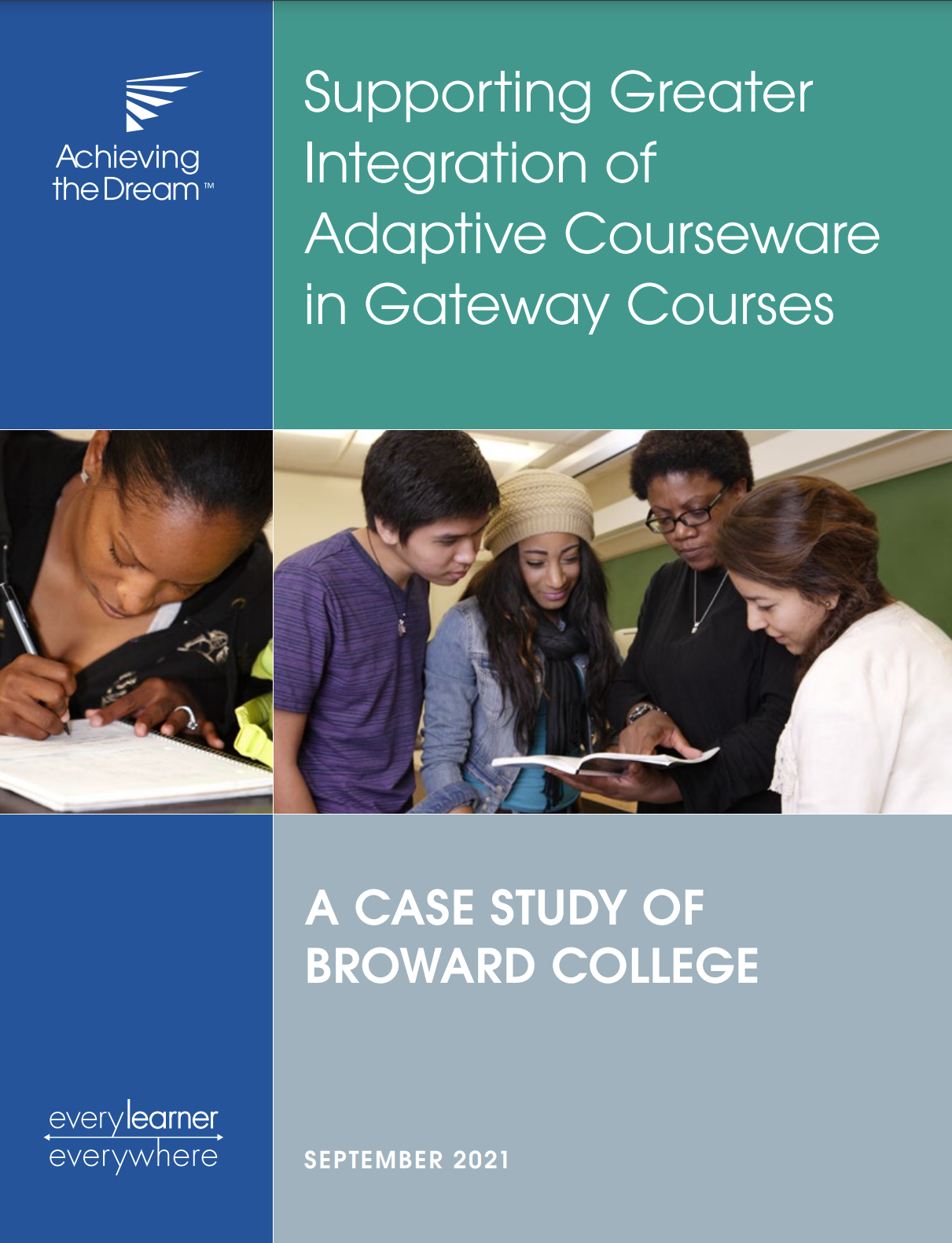
Faculty at Broward College led implementation and integration of adaptive courseware efforts in introductory course design and activities.
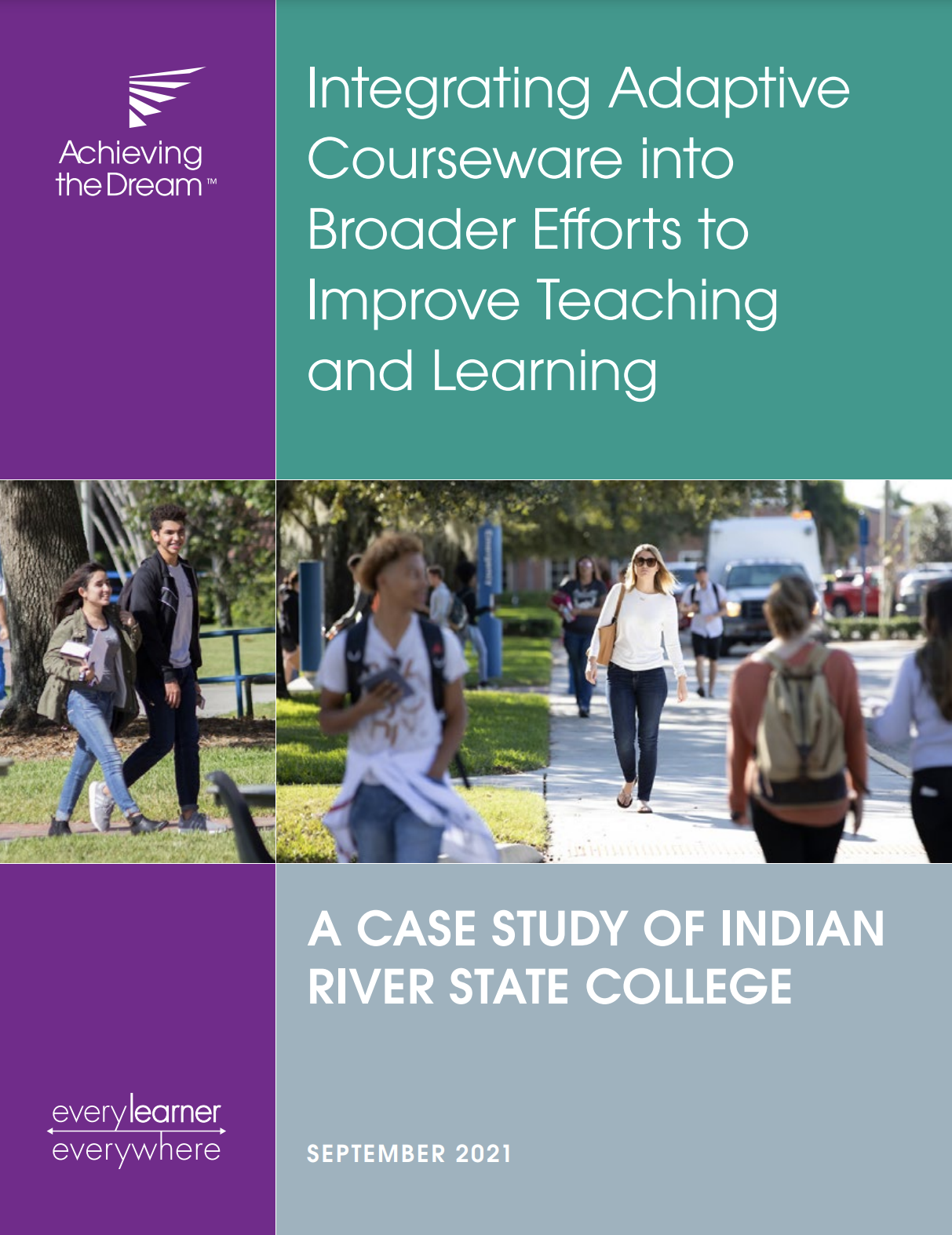
Indian River State College considered adaptive courseware a potentially powerful tool in its ongoing efforts to improve teaching and learning in online instruction and overall engagement and outcomes for students in math, physical sciences, and English.
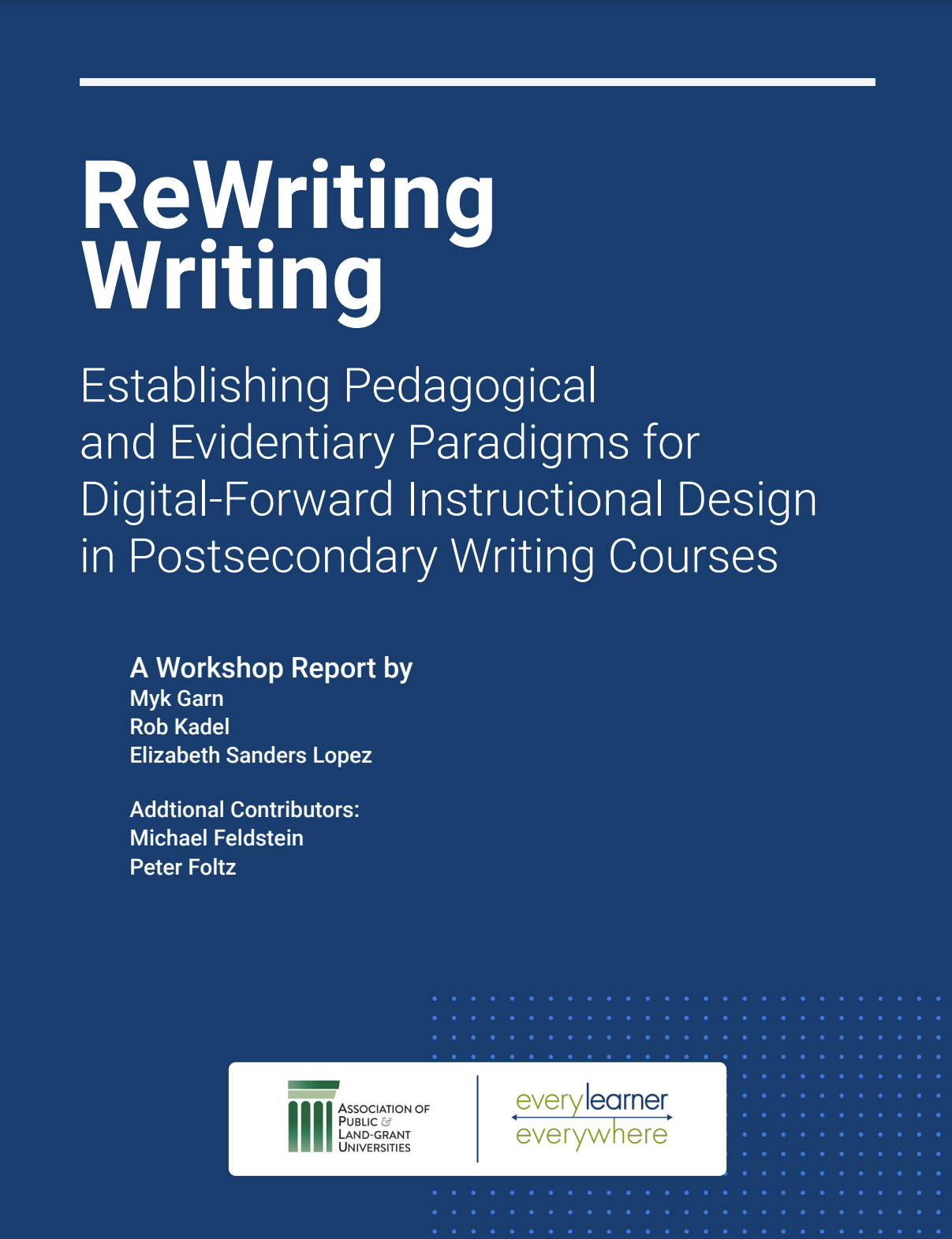
This report summarizes the work of the Re-Writing Writing workshop where we invited a diverse range of digital learning experts to bring their distributed knowledge of digital tools to a four-session virtual workshop.
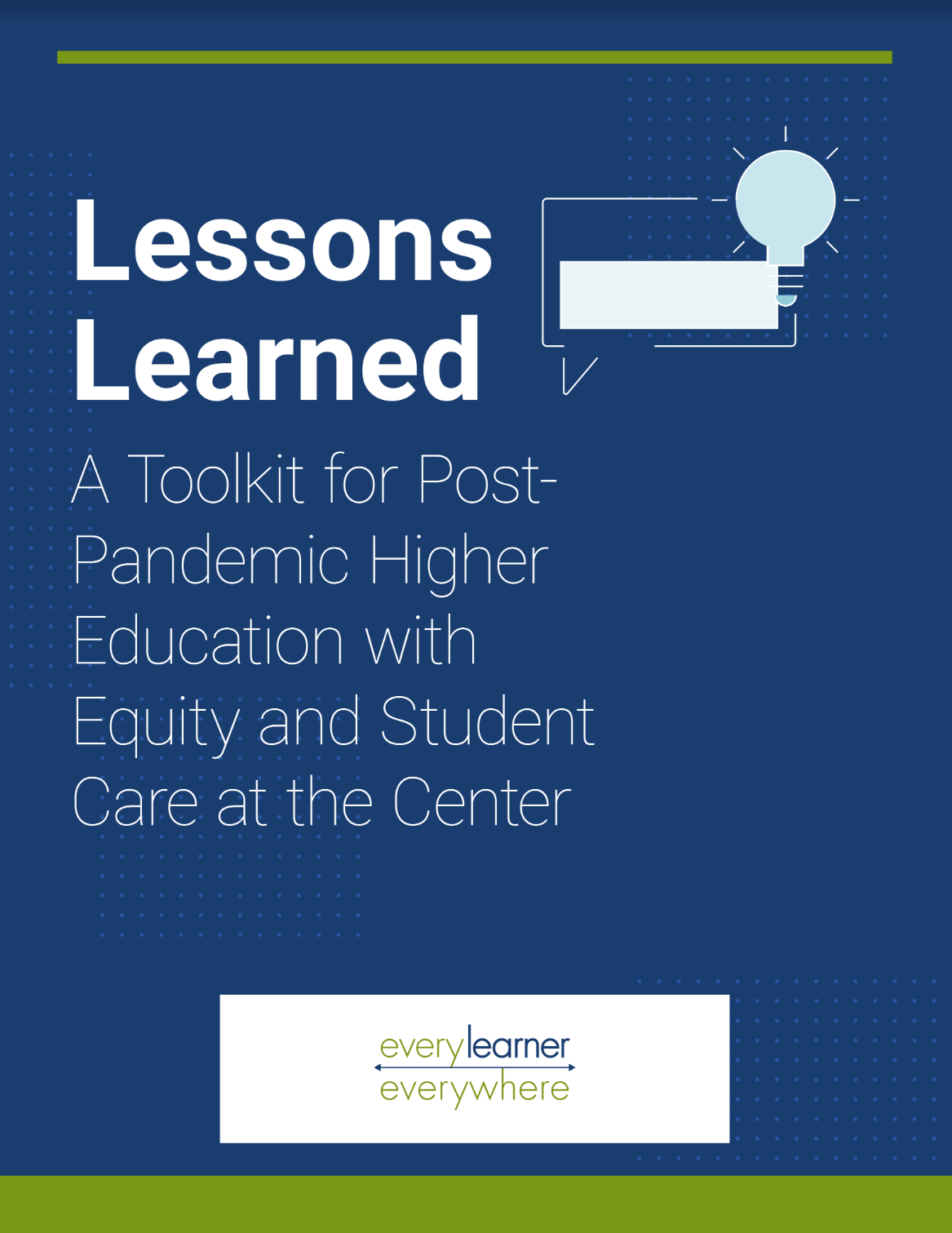
Lessons Learned is made up of over 30 recommendations for improving practices in higher education. It asks where unexpected benefits showed themselves among the forced necessity of emergency remote teaching, and it encourages faculty, administrators, and academic and student support colleagues to continue collaborating to remove barriers, improve access, and update methods and tools.
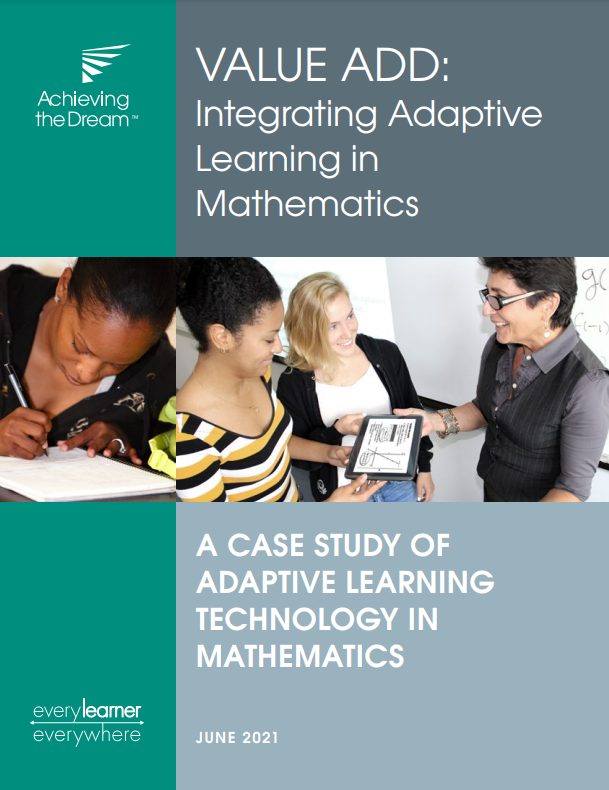
Seven colleges implement adaptive courseware in gateway math courses and find it is a necessary corequisite in supporting student success.
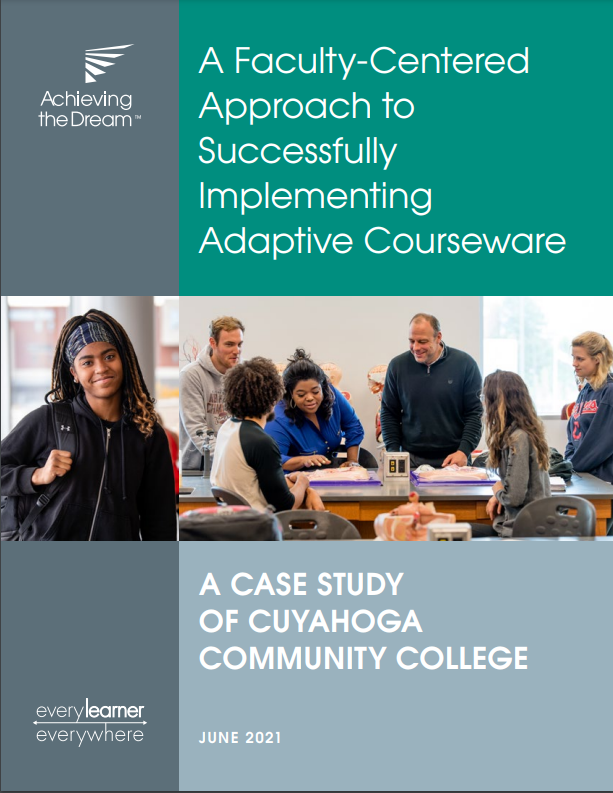
Faculty at Cuyahoga Community College led efforts to implement and then scale adaptive courseware for gateway courses in more than a half-dozen disciplines.
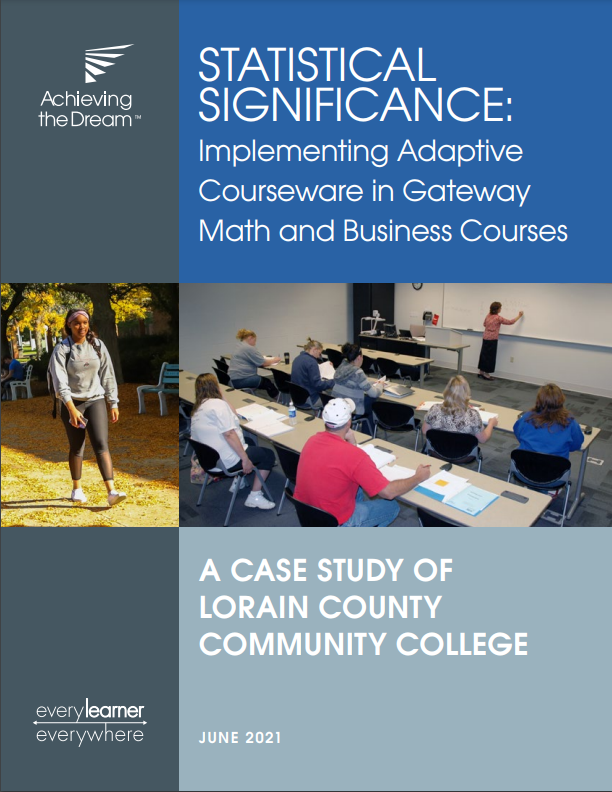
Faculty in several disciplines at Lorain County Community College explored the use of adaptive courseware, ultimately implementing it in a gateway statistics course and several business courses.
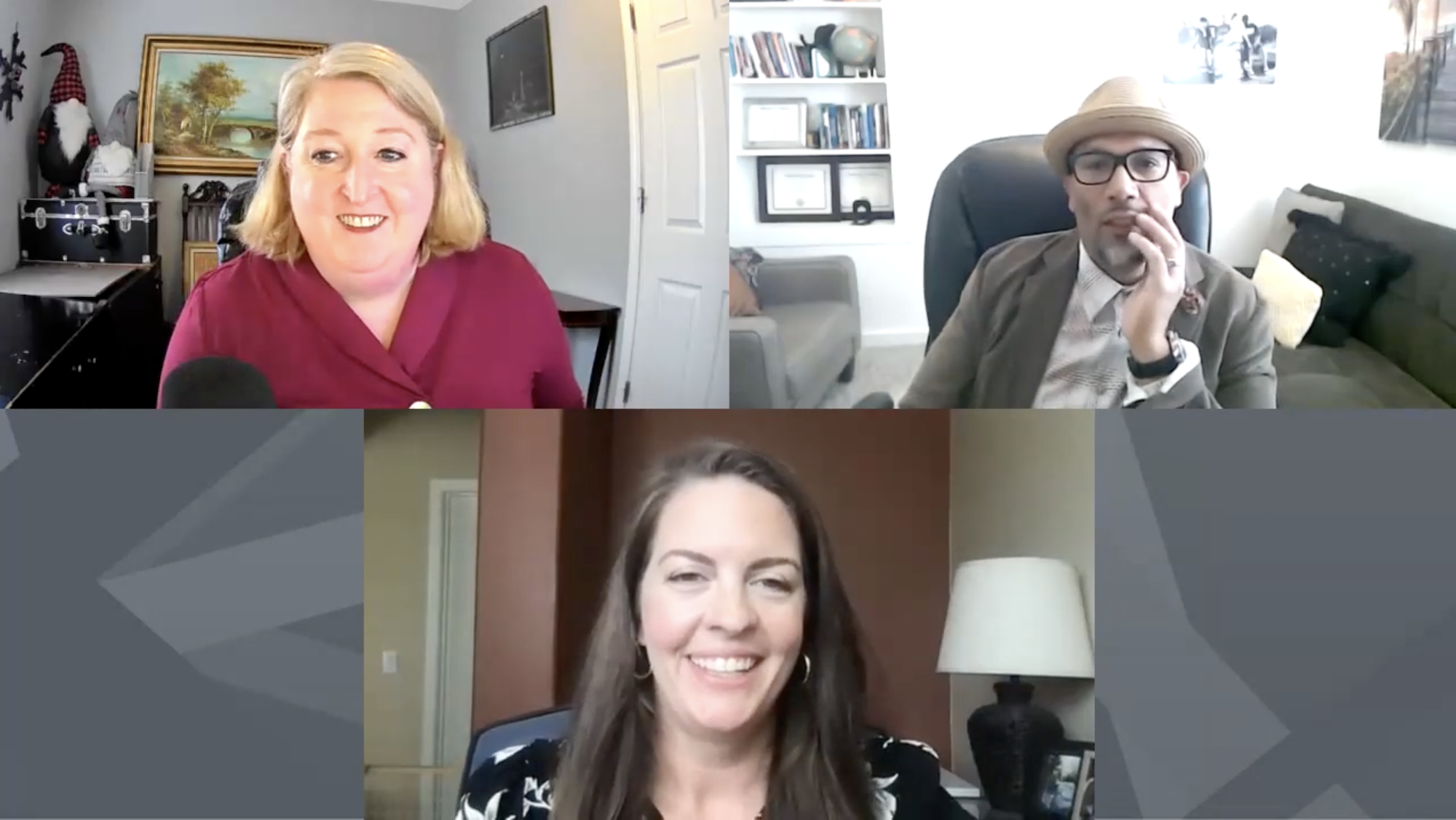
An overview of the tips and best practices for initiating an intentional movement to improve equity in gateway courses within your department.
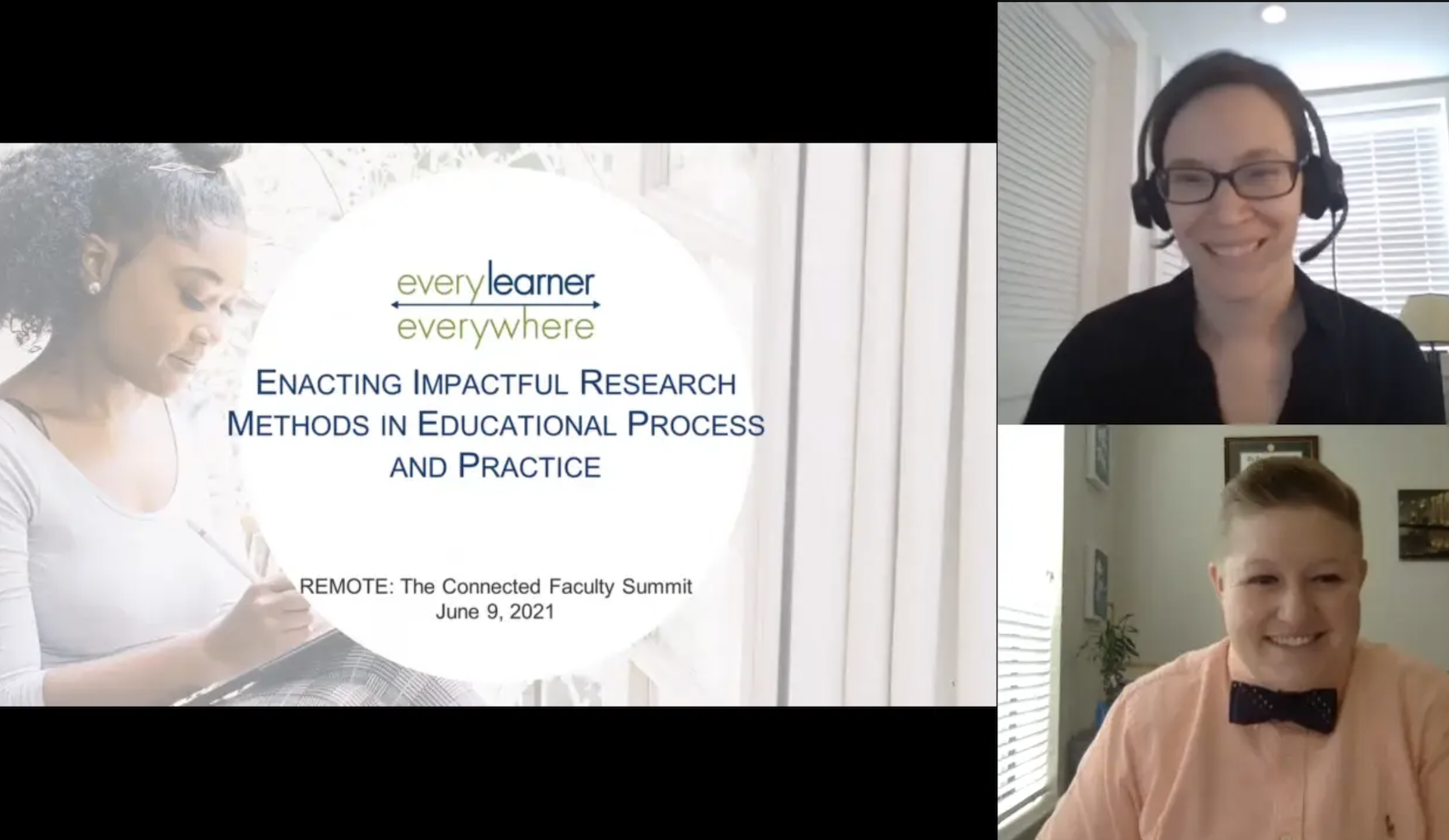
An overview of how continuous improvement strategies in our educational process and practice can be used to improve student engagement and increase academic success.
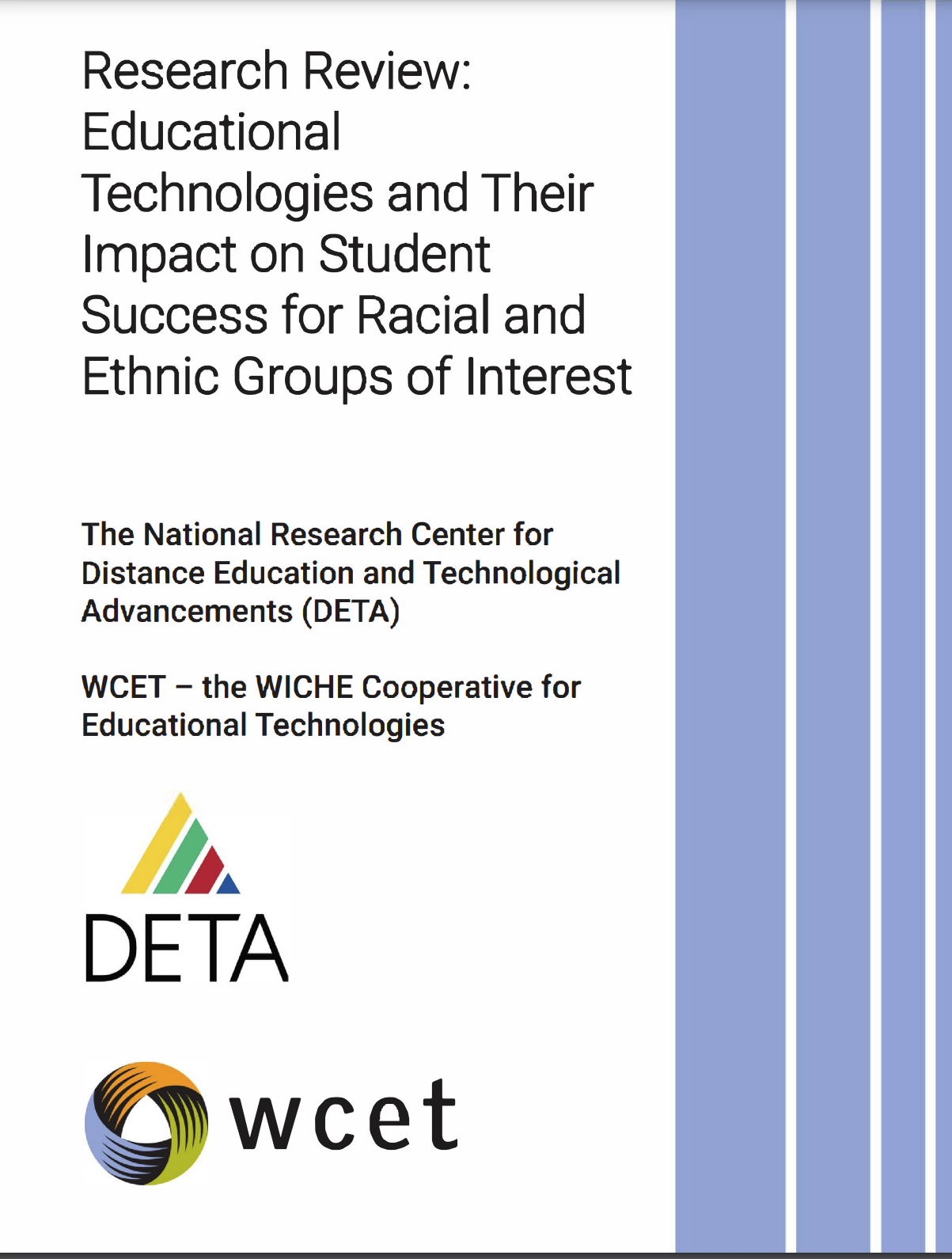
The purpose of the review is to identify institutional, instructional, and learning practices mediated by educational technologies that positively influence the success of certain racial and ethnic groups of American students.
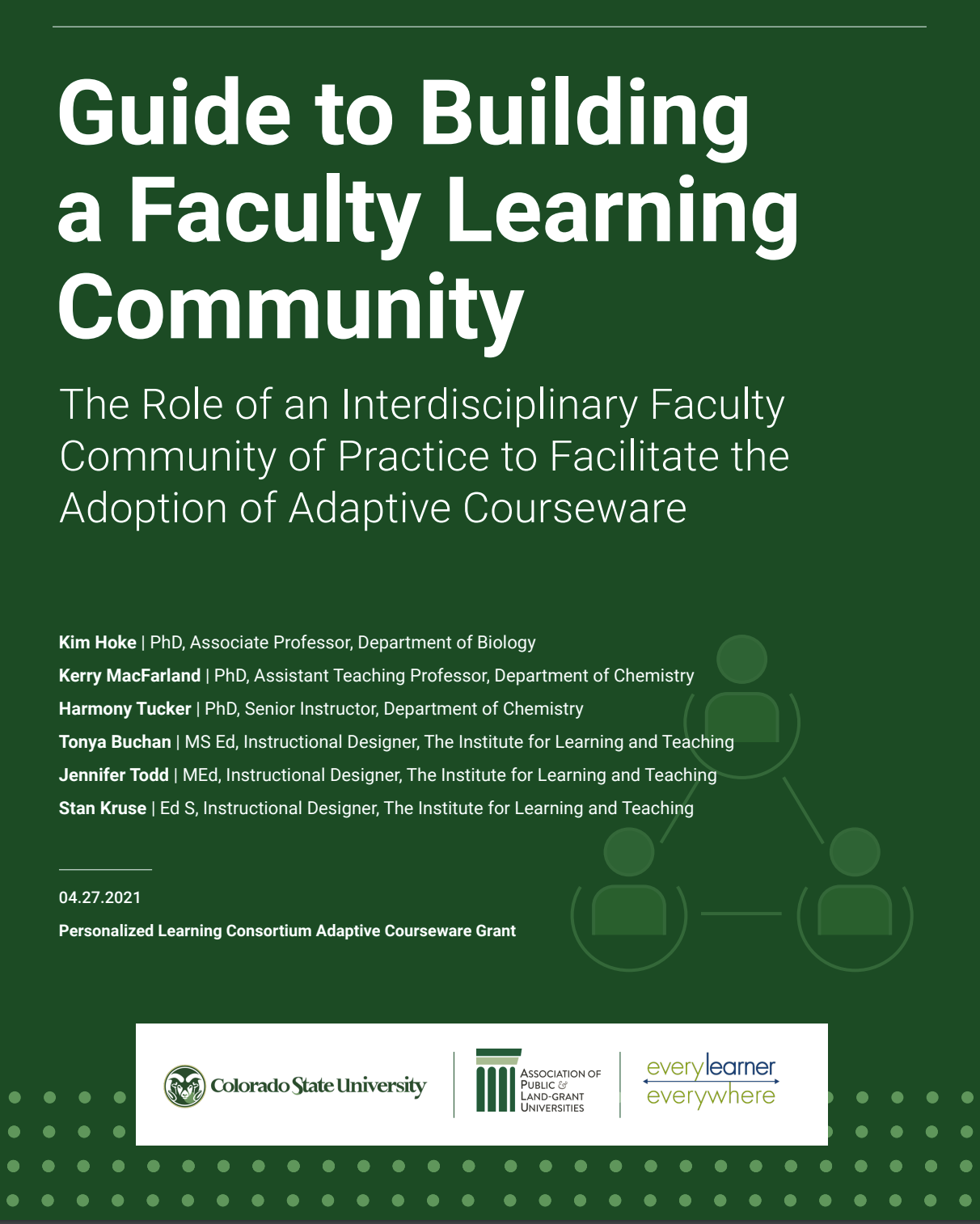
This resource describes how to build and maintain faculty learning communities, details some logistics, and provides a case study from Colorado State University along with testimonials from instructors.
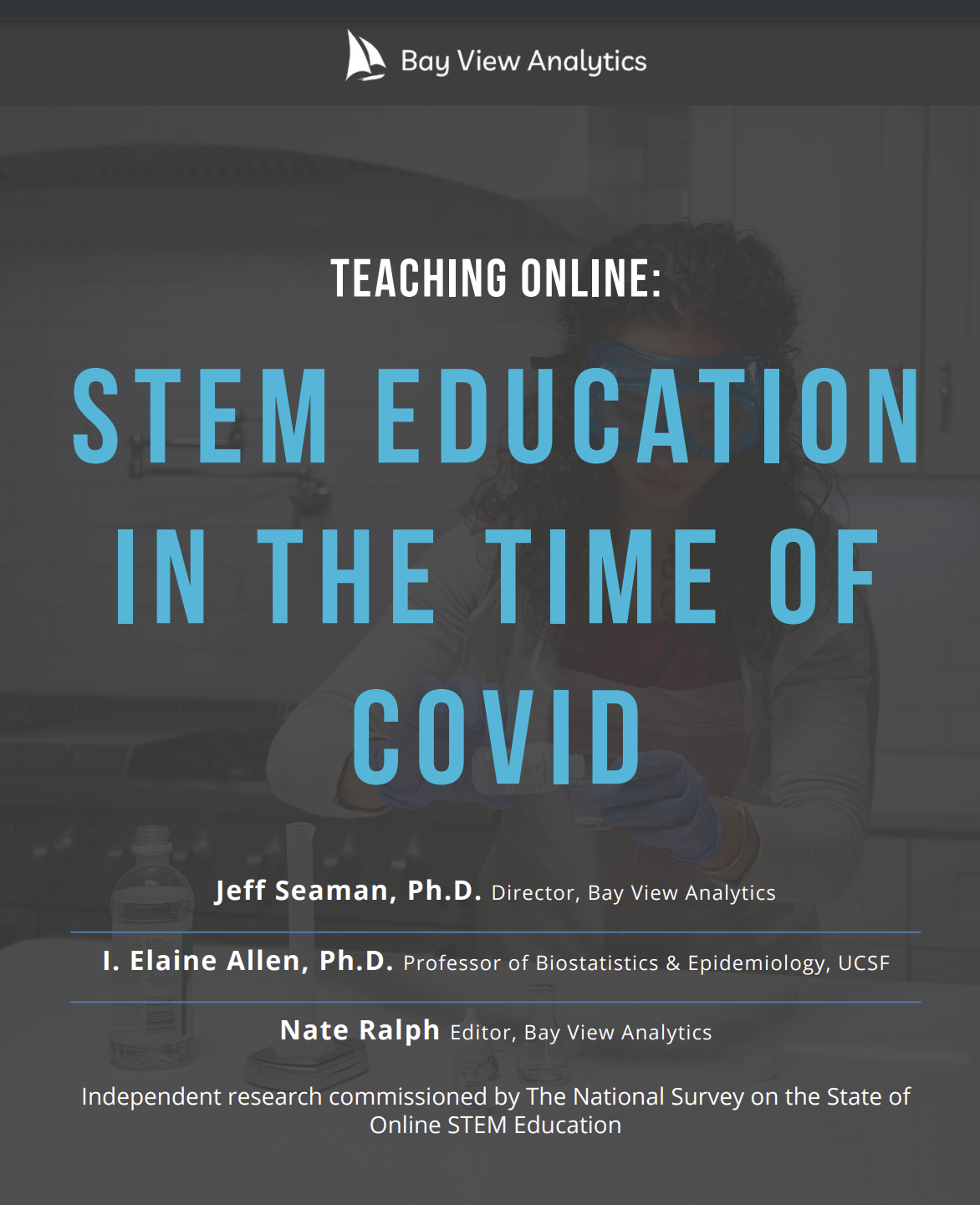
This fall 2020 survey explores the impact COVID had on higher education faculty in STEM fields and how that experience informed their opinions of online education’s effectiveness..
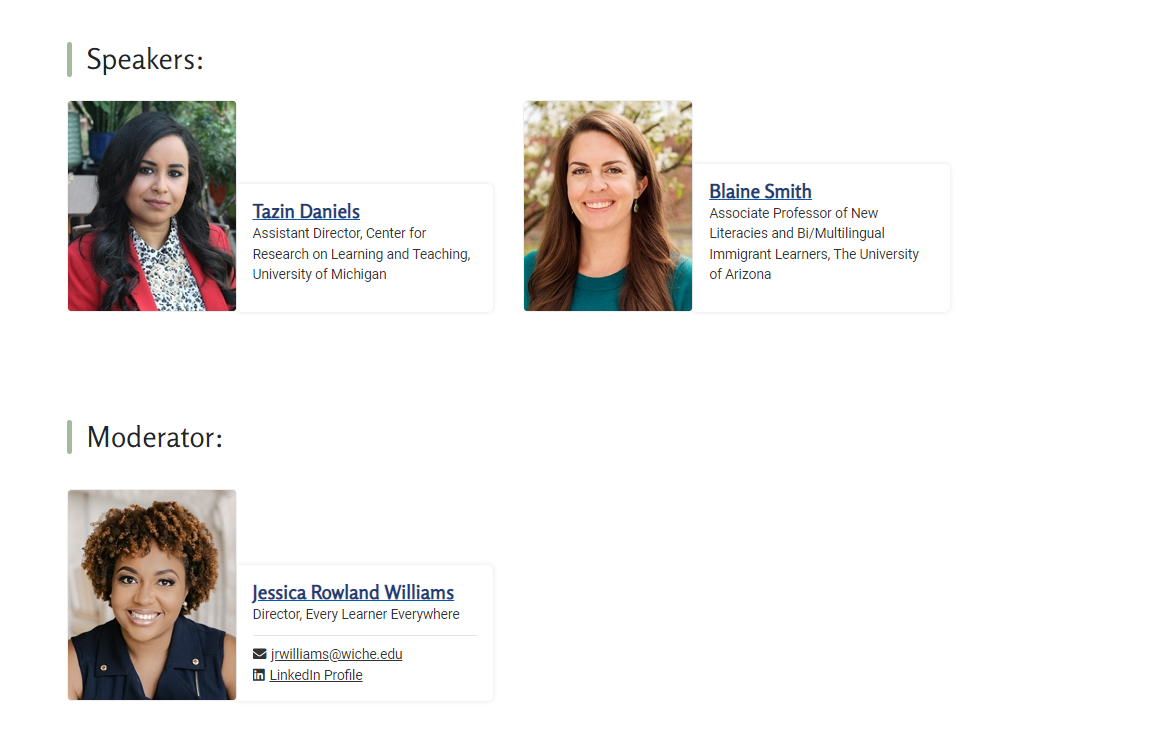
Panel discussion of equitable teaching practices and digital learning that foster student-centered learning and cultivate a culture of inclusion.
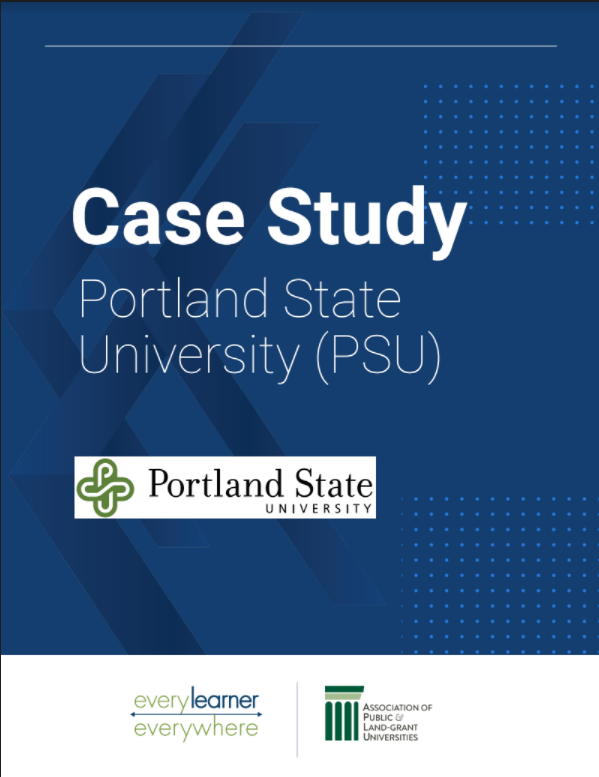
Combining active learning with adaptive courseware leads to a statistically significant reduction of DFW grades in foundational courses.
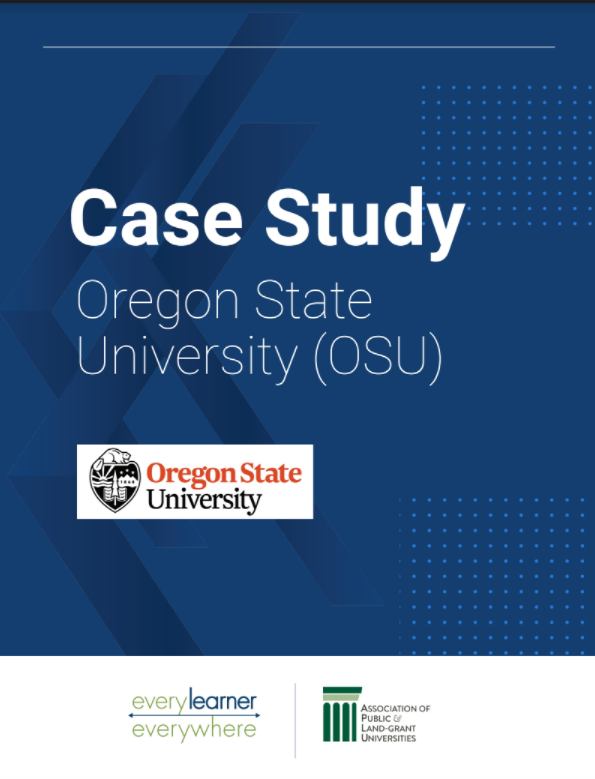
Stakeholder engagement and close collaboration important to the adaptive courseware implementation process.
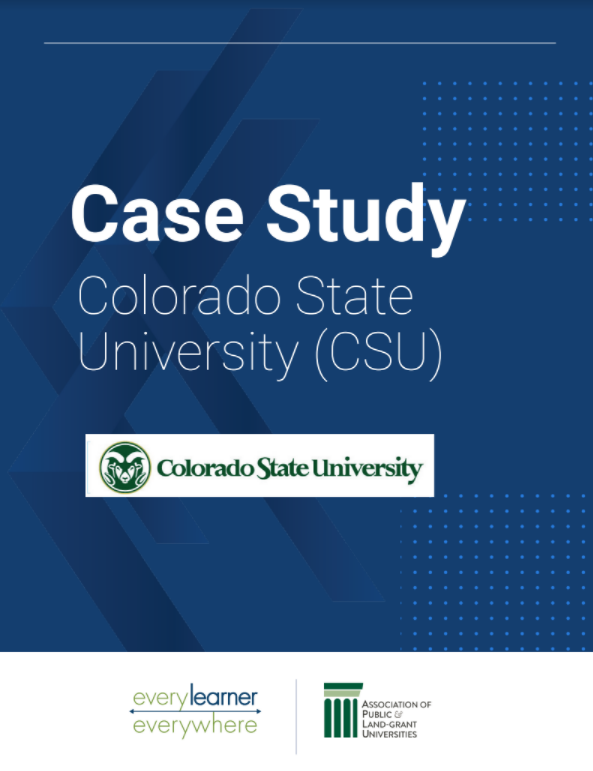
A case study at Colorado State University (CSU), found the use of active learning and adaptive courseware, along with an intentional faculty development program, are key in the implementation of adaptive courseware.
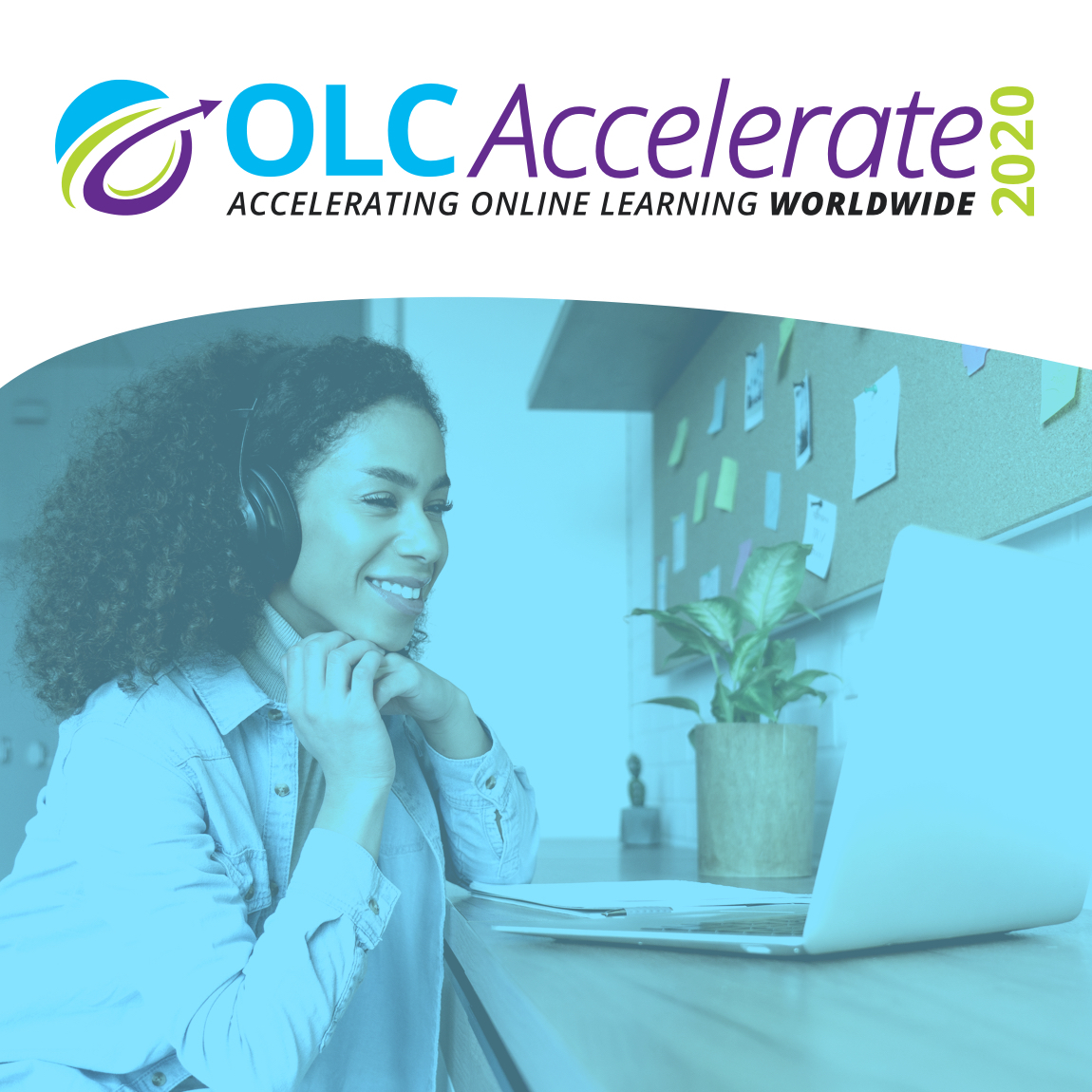
How advances in digital courseware paired with evidence-based, equity-first, innovative teaching can better serve today’s students.
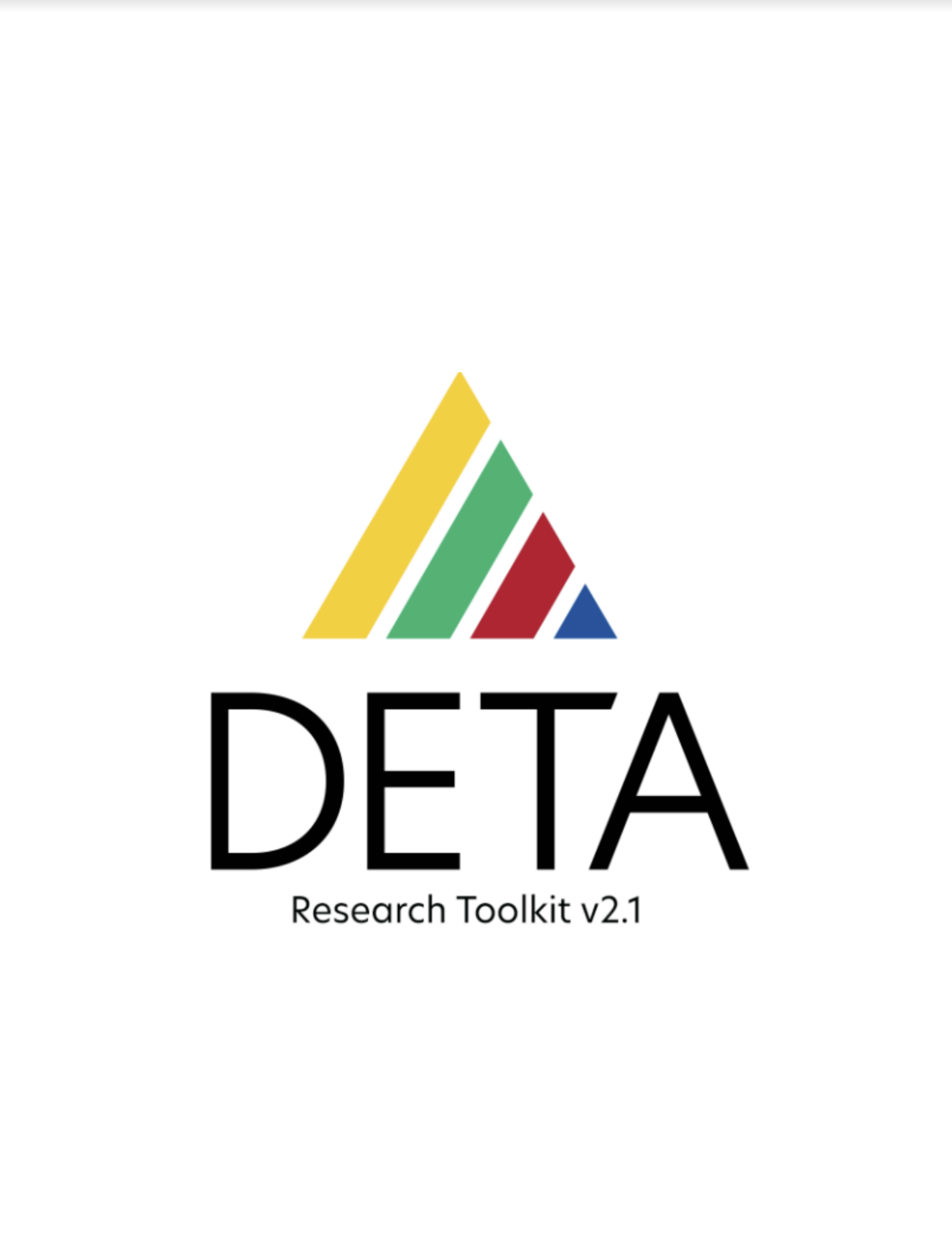
The DETA Research Toolkit 2.0 provides resources and tools to move research beyond the traditional paradigms and to explore innovative methodologies.
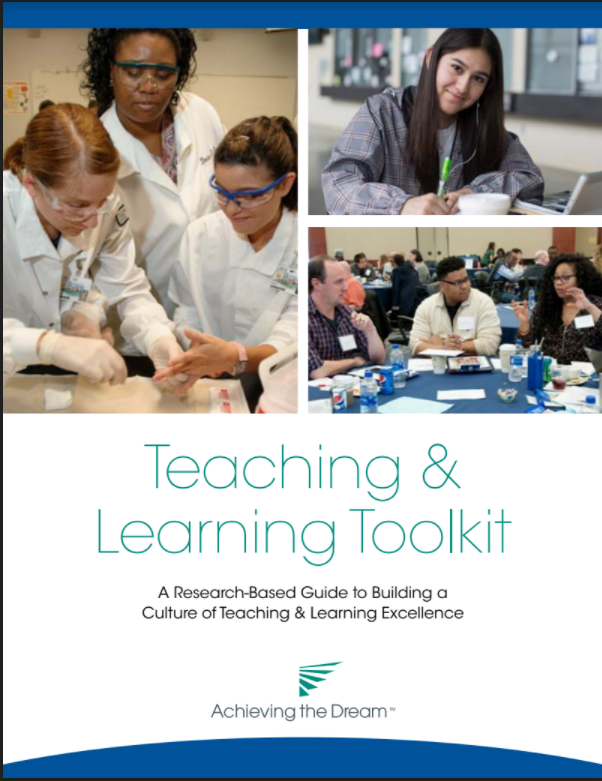
Grounded in research, this resource supports college teams in building institutional capacity in teaching and learning.
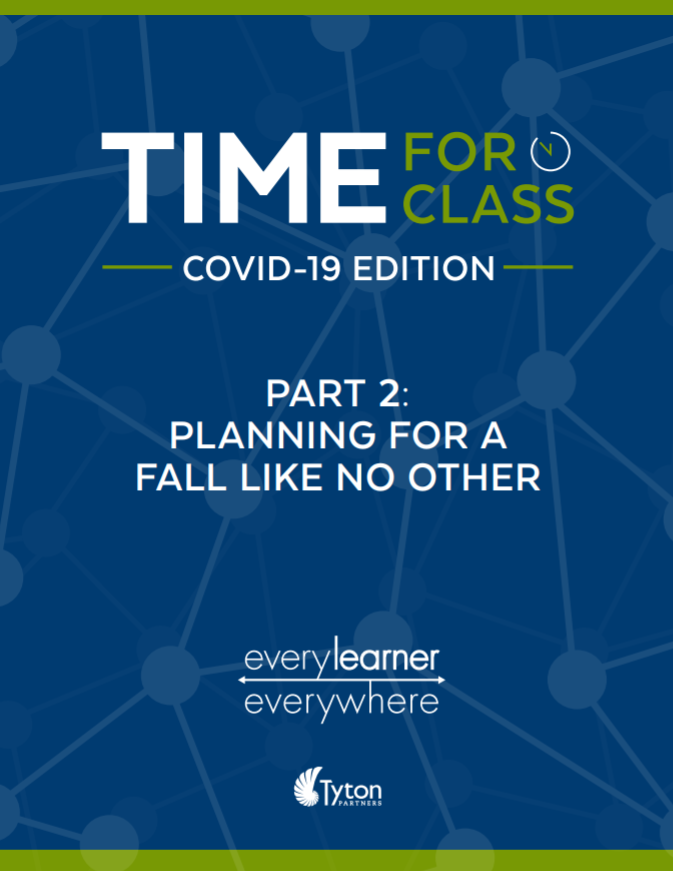
This is the second report in an ongoing series designed to understand the ongoing impact of the COVID-19 pandemic on teaching and learning in higher ed.
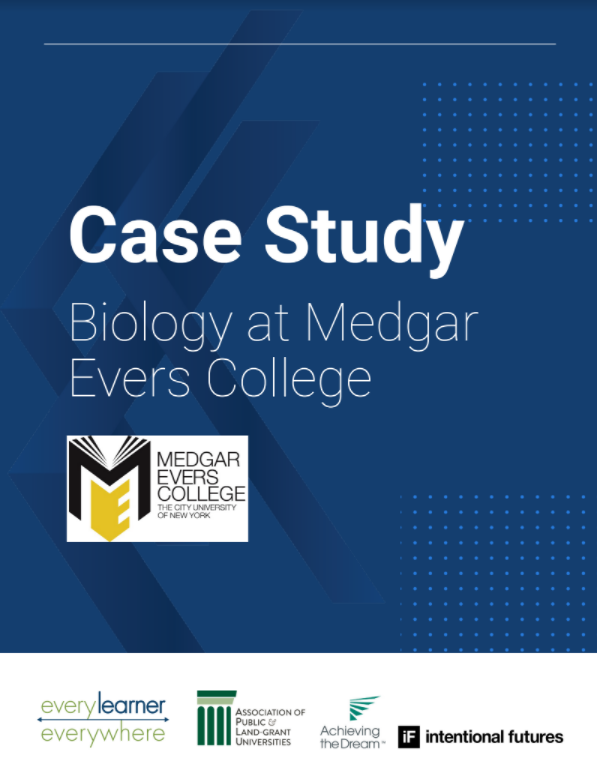
This case study looks at how active learning and learning analytics can improve student success in biology courses.
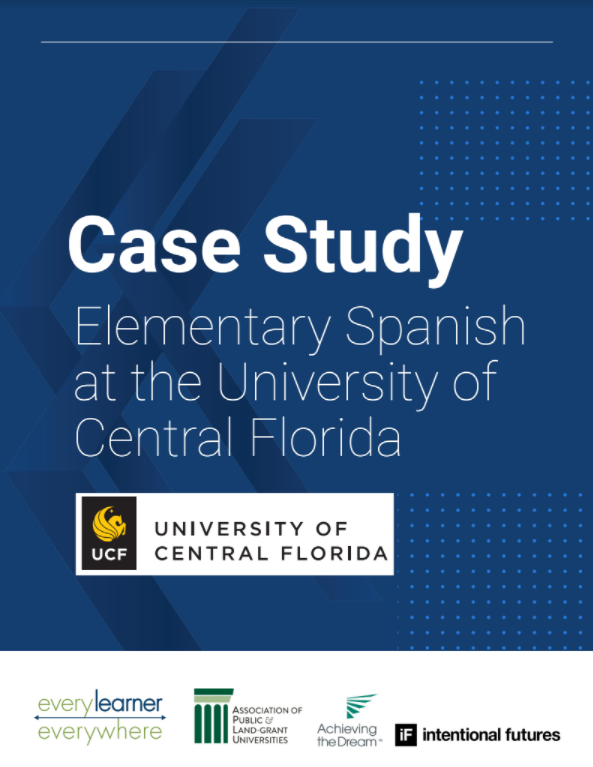
This case study on elementary Spanish looks at how to customize a course for a students by involving them in review and updates.
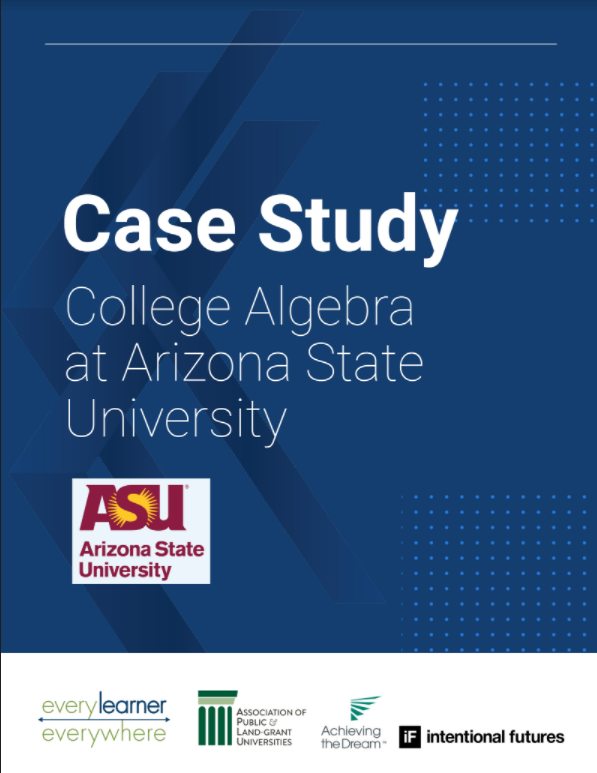
This case study looks at removing barriers and increasing student success in college algebra.
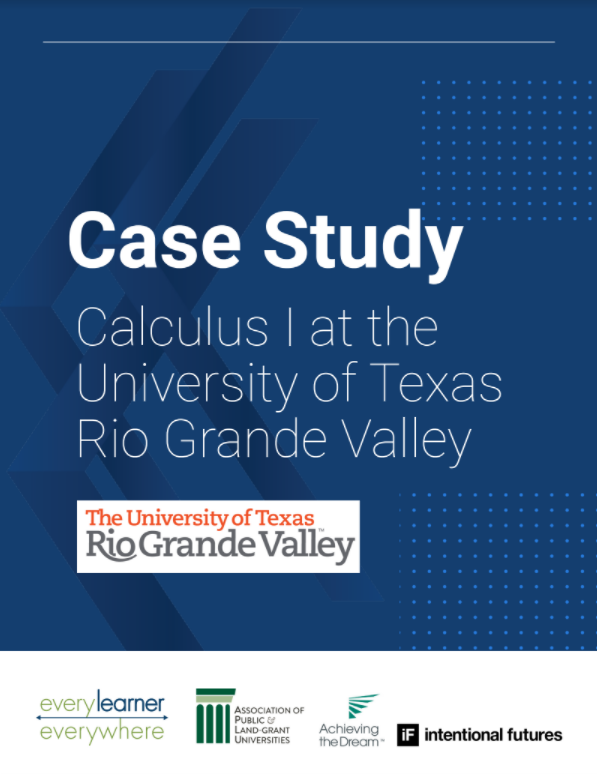
This case study looks at how Calculus faculty are improving student success through multi-section coordination.
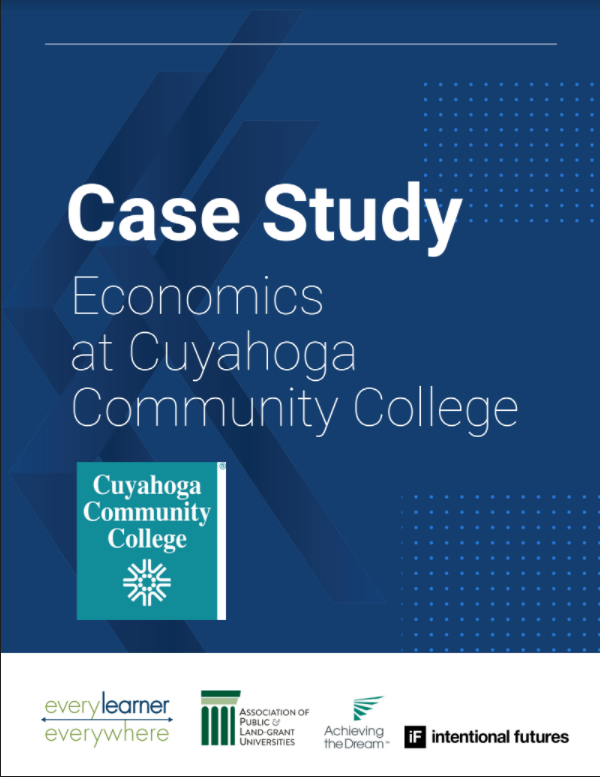
This case study looks at how one professor is increasing Course Success in economics through Student Engagement and Active Learning.
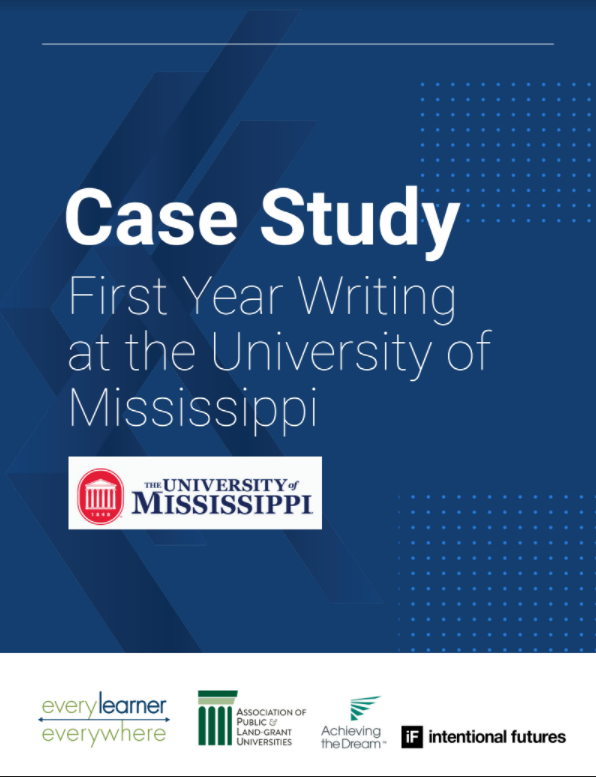
This resource provides suggestions for breaking down those barriers to international students in online learning.
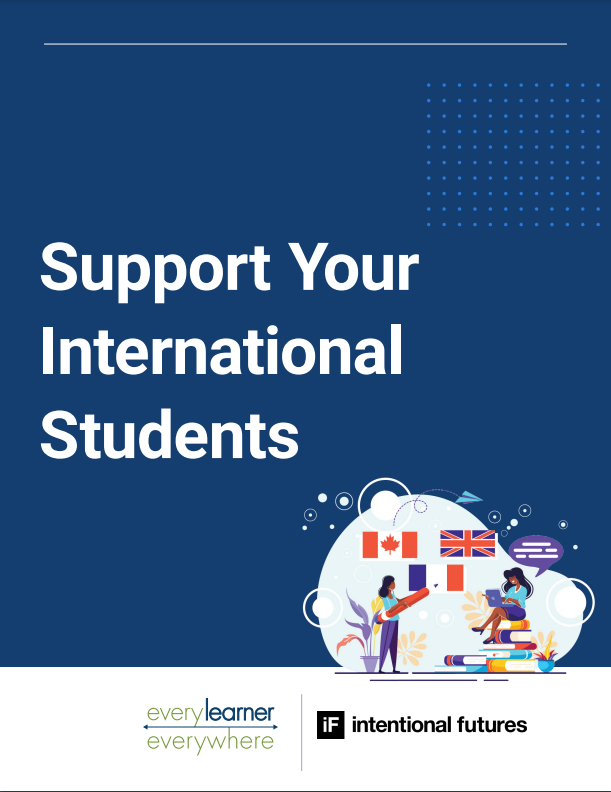
This resource provides suggestions for breaking down those barriers to support international students in online learning.
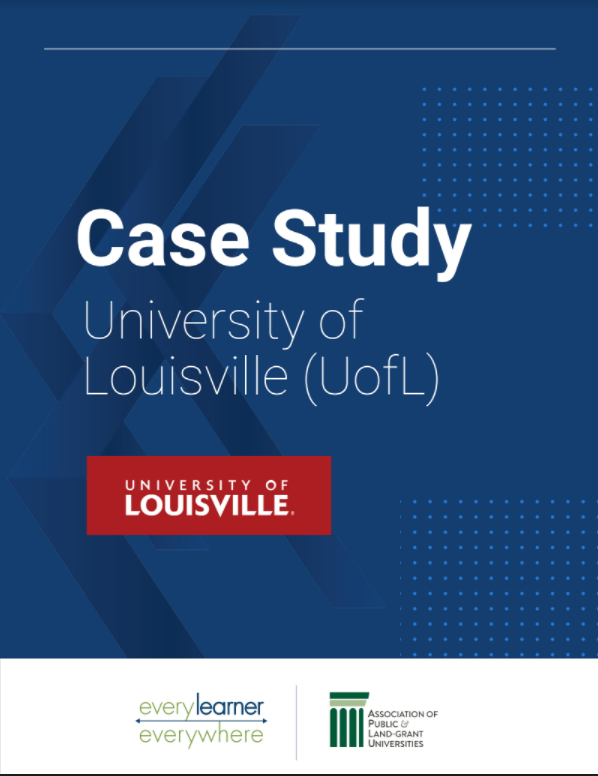
This case study from the University of Louisville demonstrates their approach to leveraging adaptive courseware to improve course design.
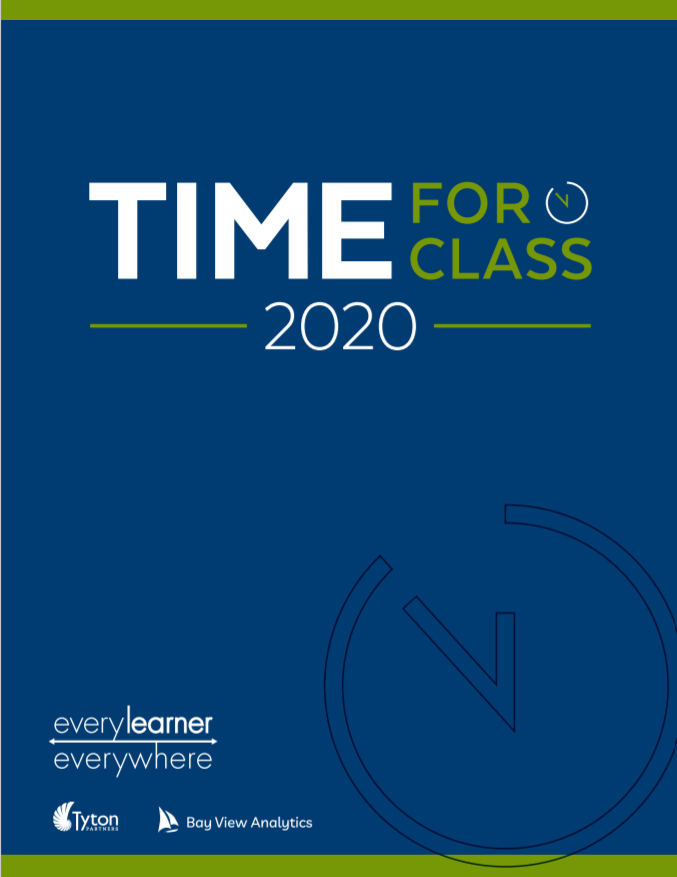
This survey is designed to help higher education stakeholders gain an understanding of digital learning tools for increasing affordability and accessibility for students.
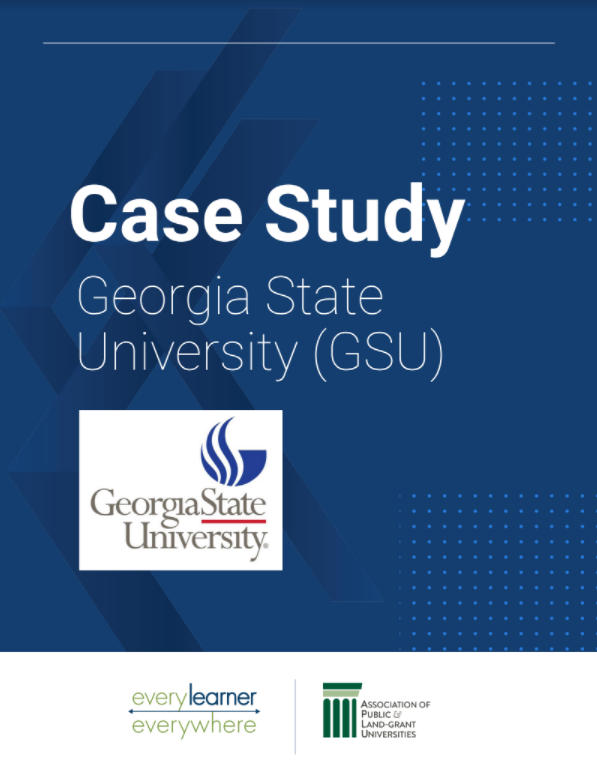
This case study from Georgia State University demonstrates their approach to scaling adaptive courseware and the effective use of analytics.
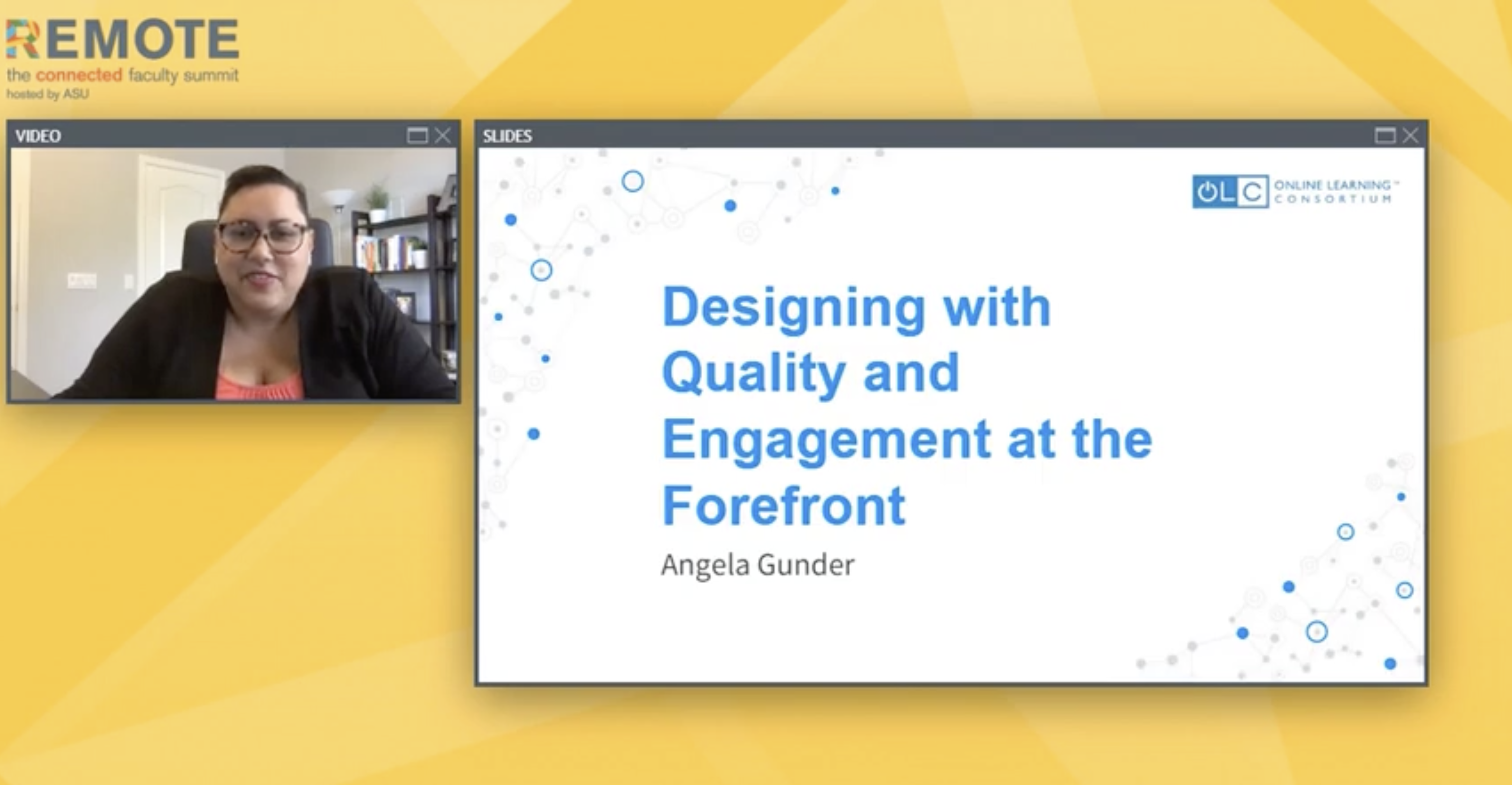
Angela Gunder of OLC and Alisha Mendez of EdPlus ASU discuss equitable practices and outcomes-based approaches to designing with quality instruction online.
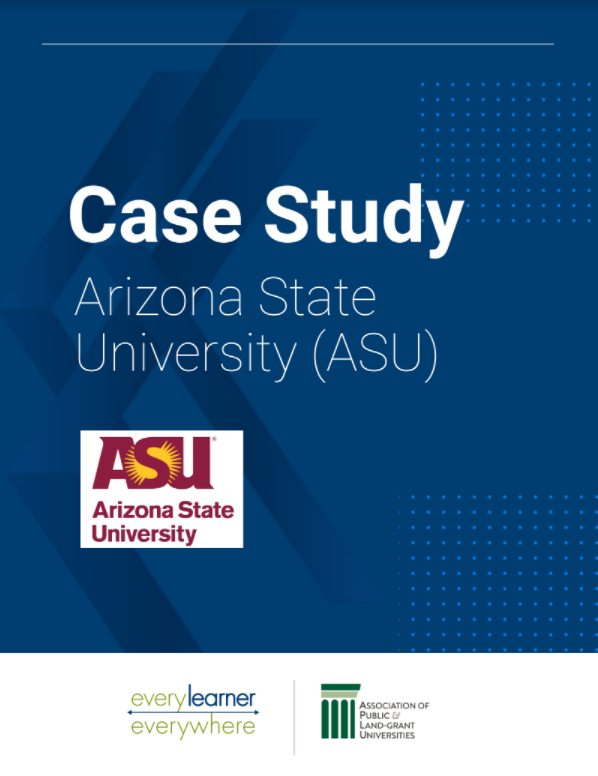
In this case study, Arizona State University shares the progress of their adaptive courseware implementation.
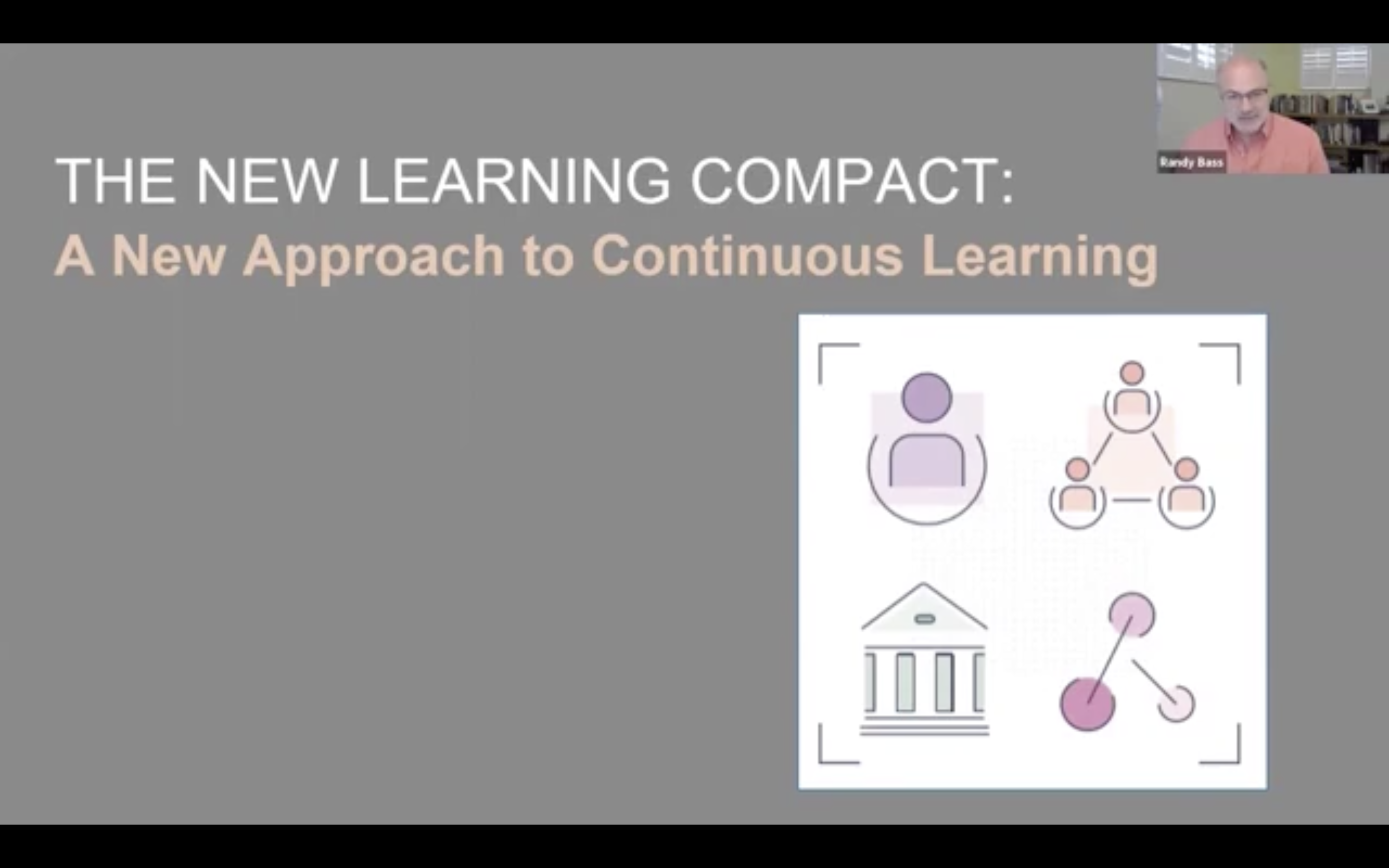
Faculty developers discuss the New Learning Compact Framework and the importance of professional learning and development during a crisis and beyond.
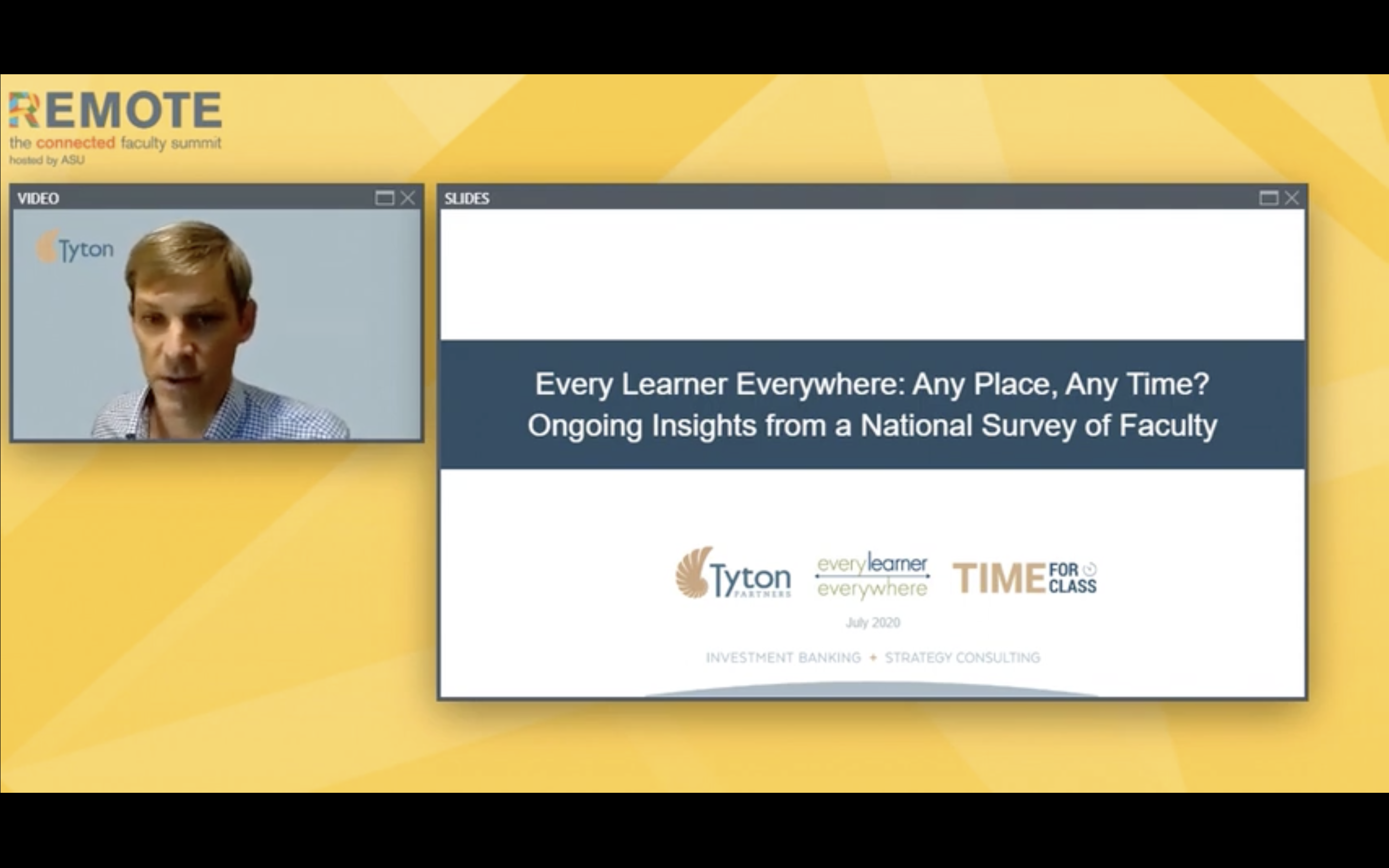
Researchers discuss recent findings in a survey of faculty teaching remotely during the Covid pandemic leaving faculty with a more positive perception of online learning.
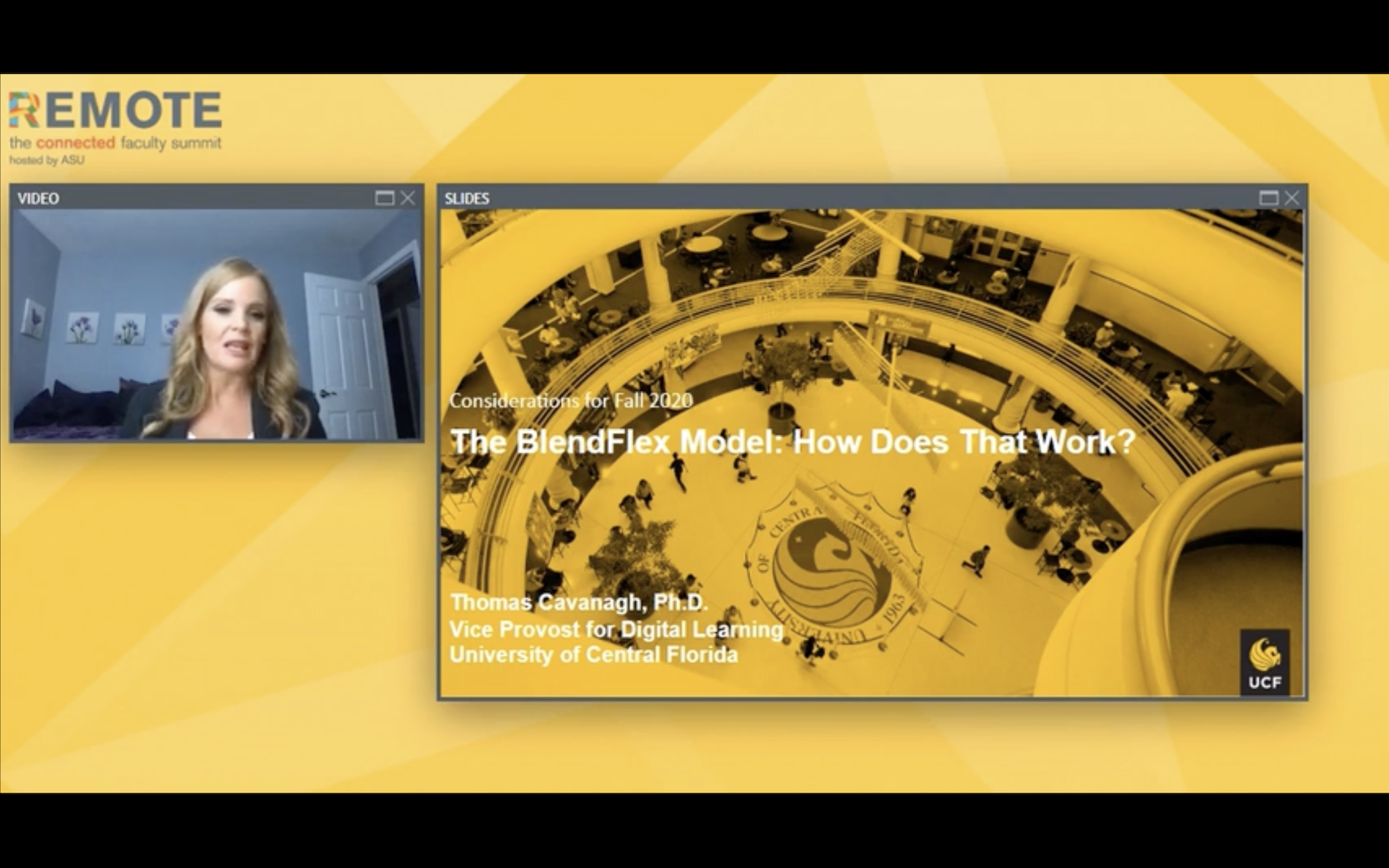
Thomas Cavanagh of UCF and Athena Kennedy of Purdue University Online explain the BlendFlex delivery model for remote teaching.
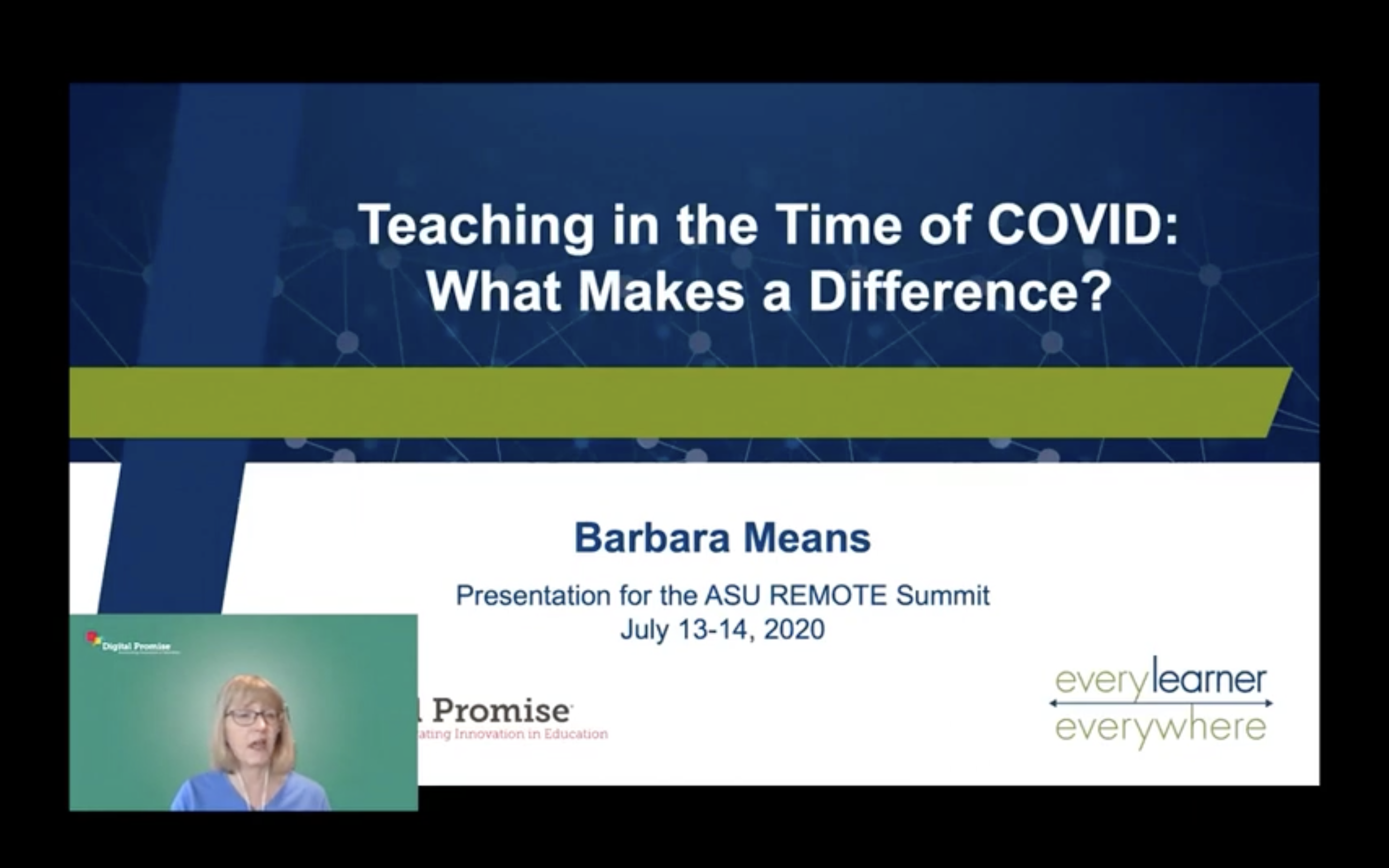
Barbara Means of Digital Promise discusses survey results of students’ experience of the rapid shift to all-online courses in Spring 2020.
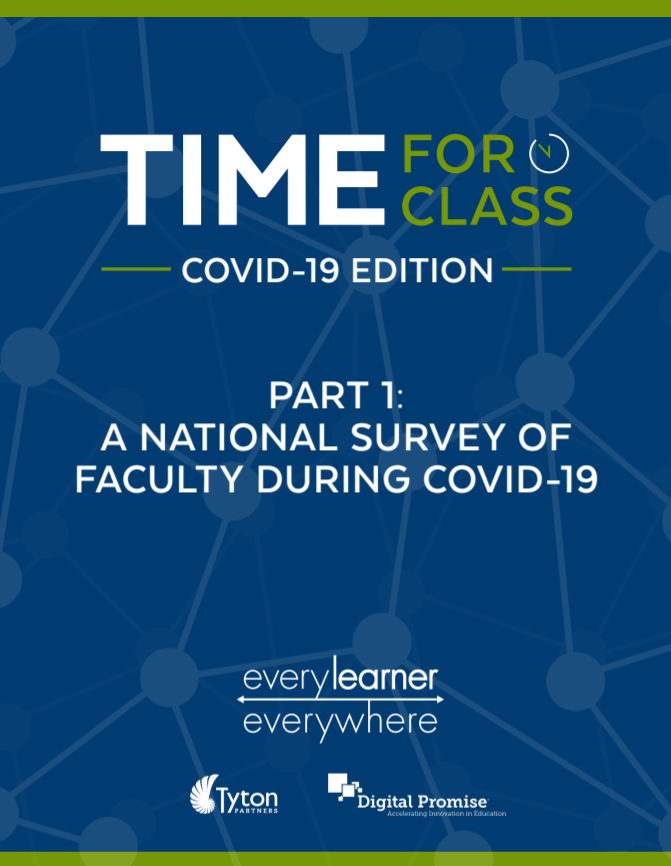
The report presents first results from an ongoing series of surveys and focus groups with faculty designed to understand the impact of COVID-19 on higher ed.
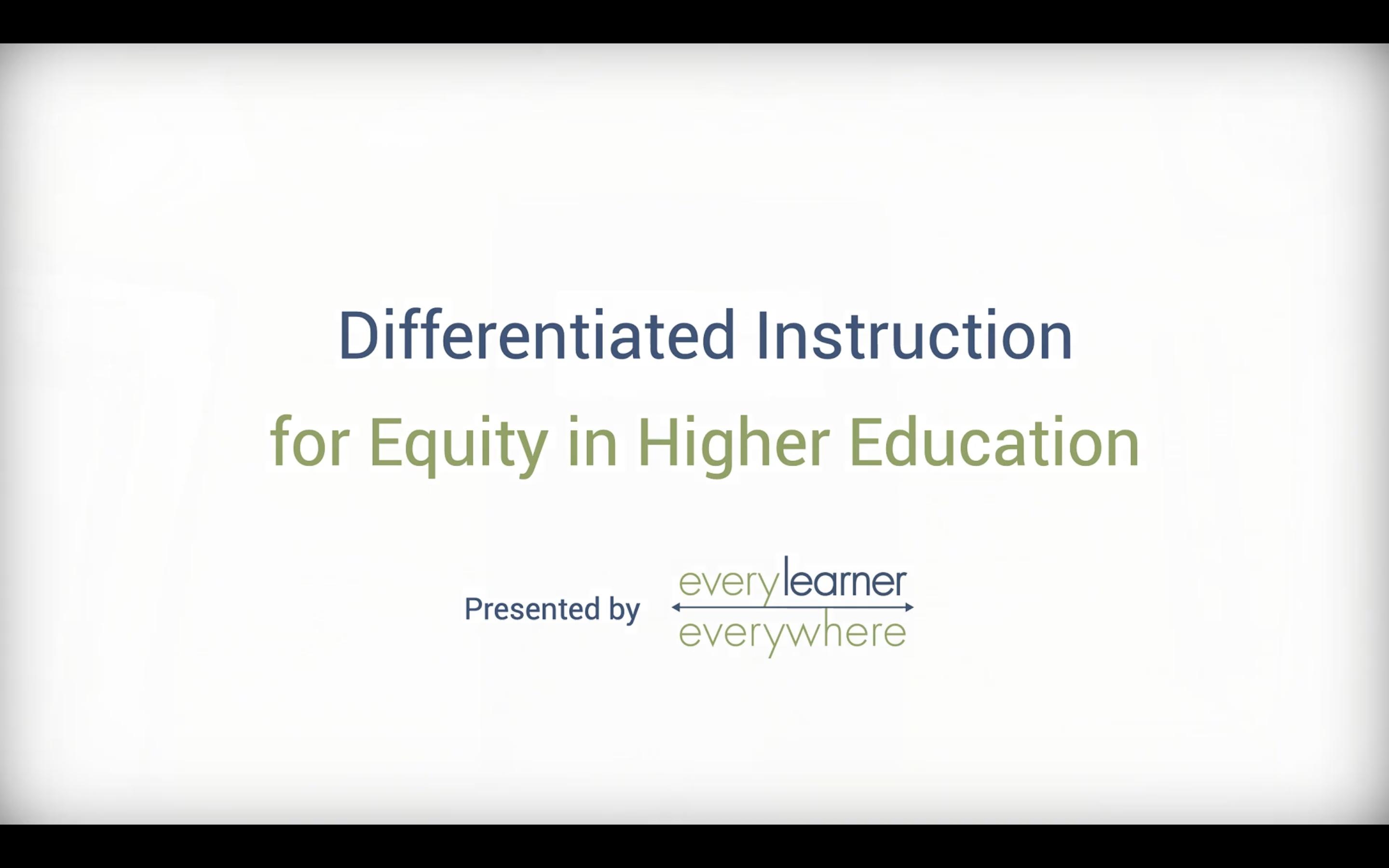
This video provides an introduction to differentiated instruction as a means to enhance the quality learning environments and to engage students in relevant and meaningful education.
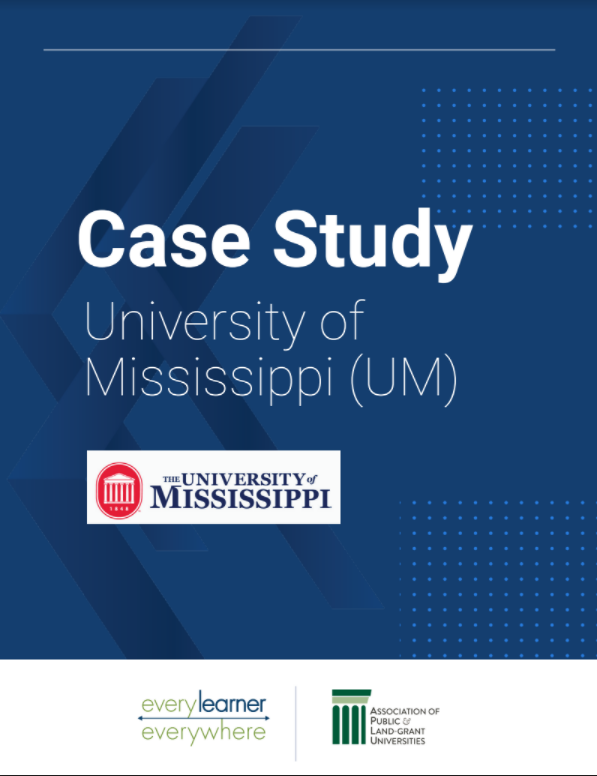
This case study looks at faculty support and buy-in and draws on valuable insights from student focus groups.
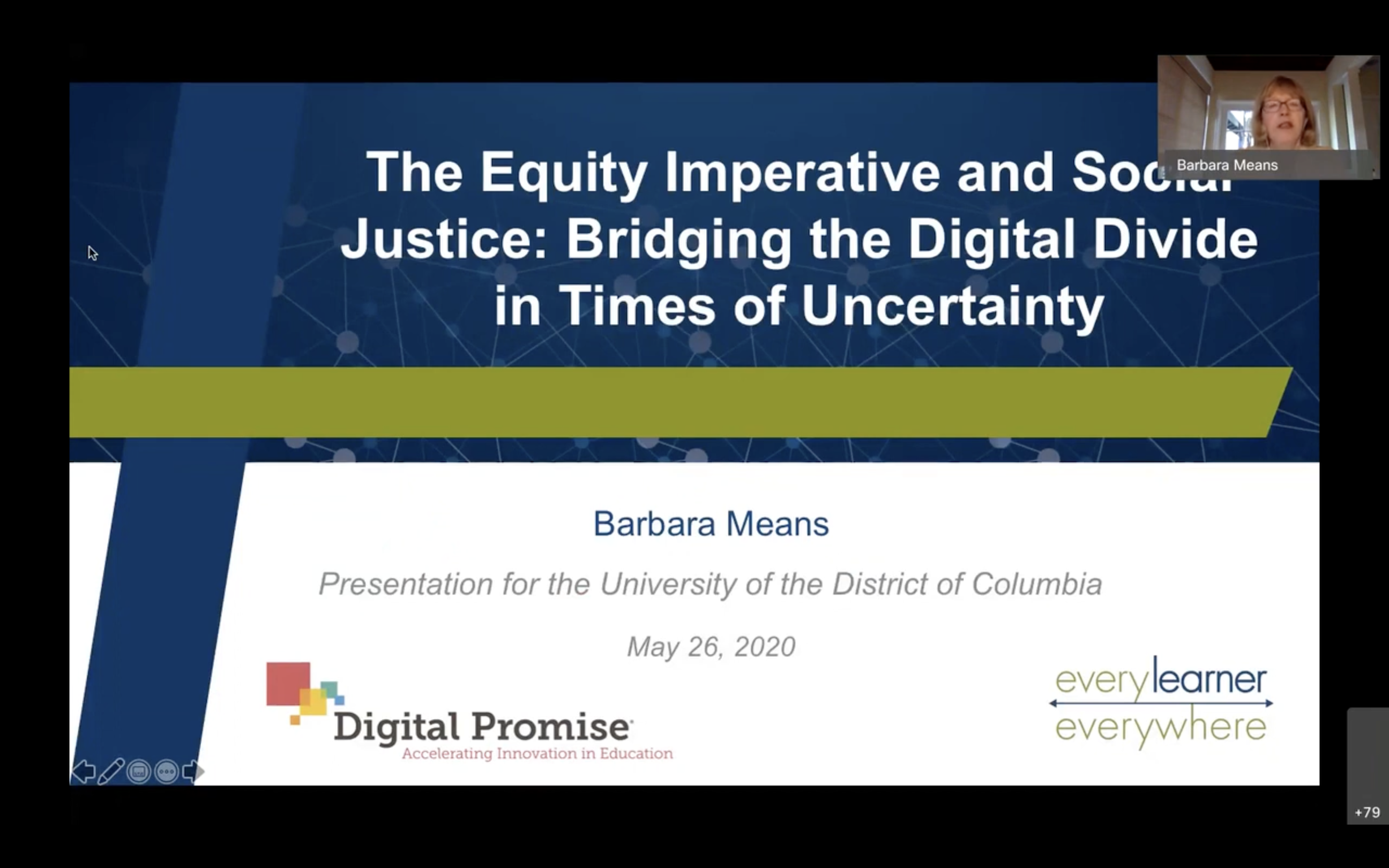
Barbara Means of Digital Promise presents findings from a survey of students learning remotely and offers solutions for bridging the digital divide at the University of the District of Columbia.
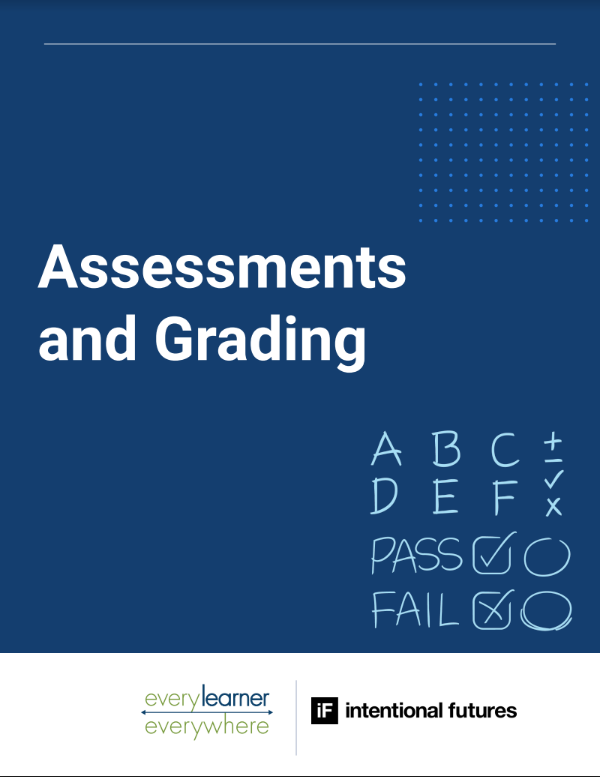
This resource offers adjustments to make to your assessment practices that can help you adapt your assessments during academic disruption.
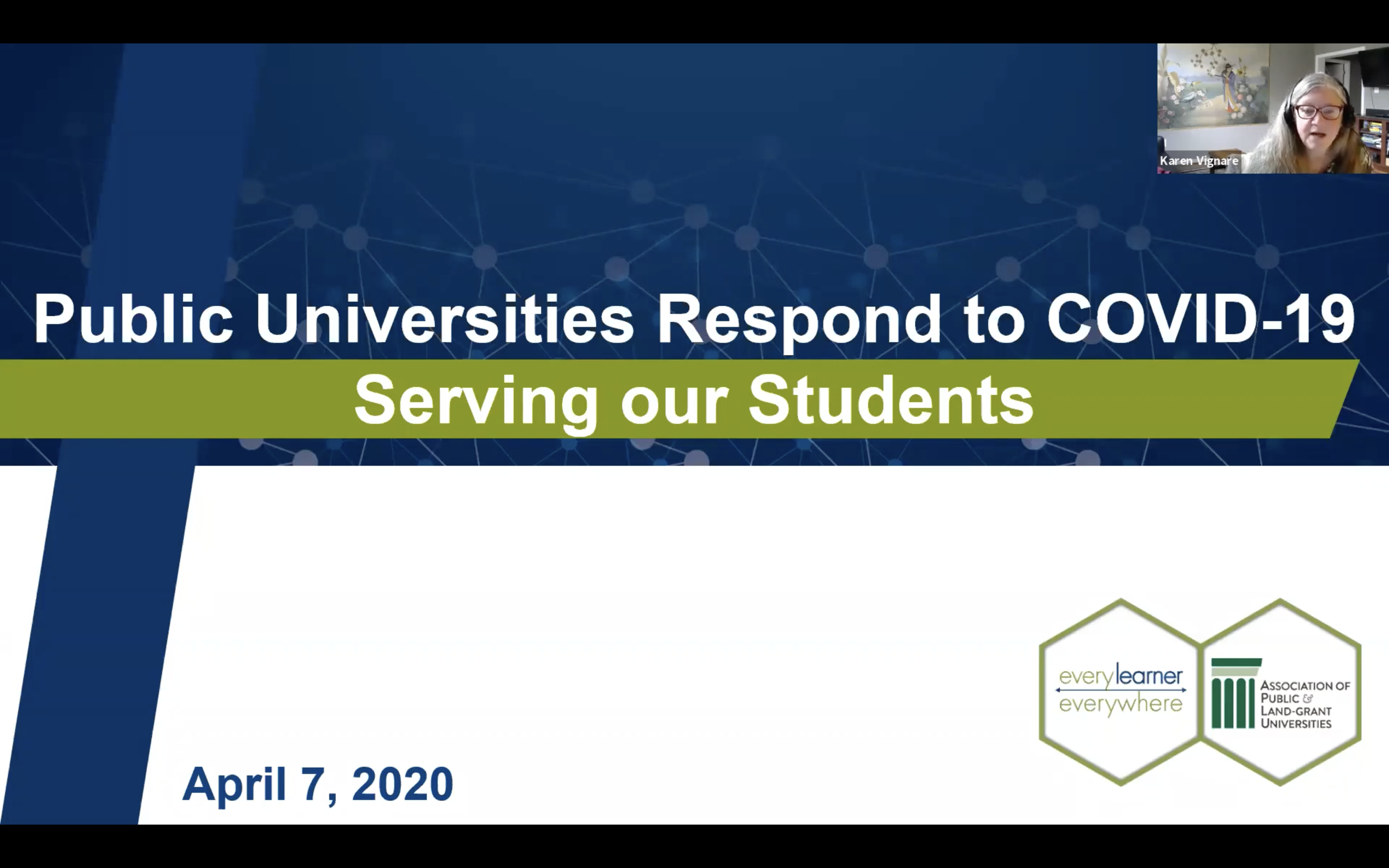
In this webinar, the APLU follows up with two provosts four weeks into the pandemic and how they’re planning for teaching remotely in the summer and fall terms.
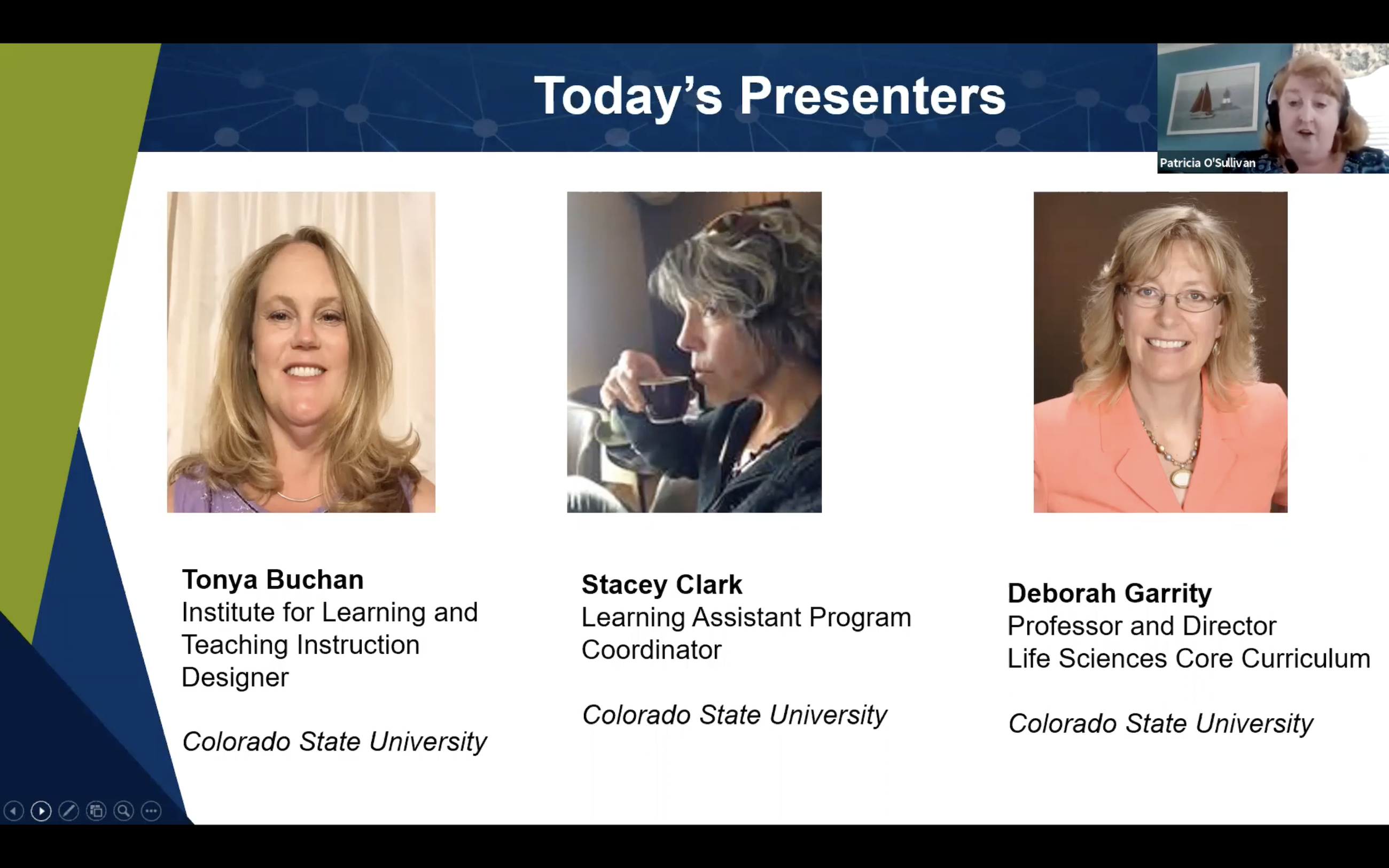
In this webinar, faculty and instructional support staff share a model for student success with undergraduate learning assistants.

This resource provides an introduction to the processes, challenges, and considerations involved in running impact studies in postsecondary institutions.
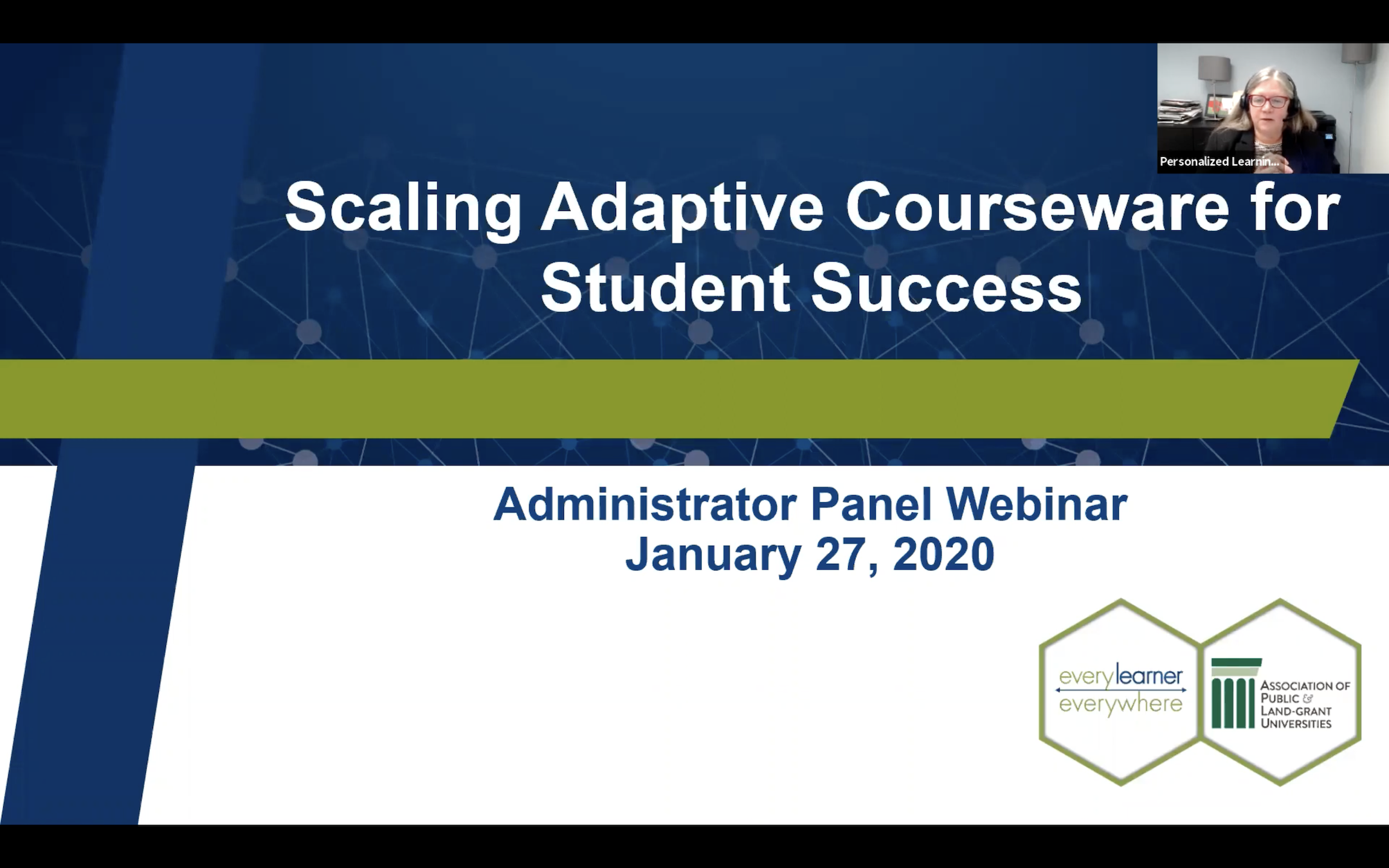
In this webinar, faculty share their experiences at scaling adaptive courseware, reducing section variability, and supporting the implementation of adaptive courseware through Centers for Teaching & Learning.
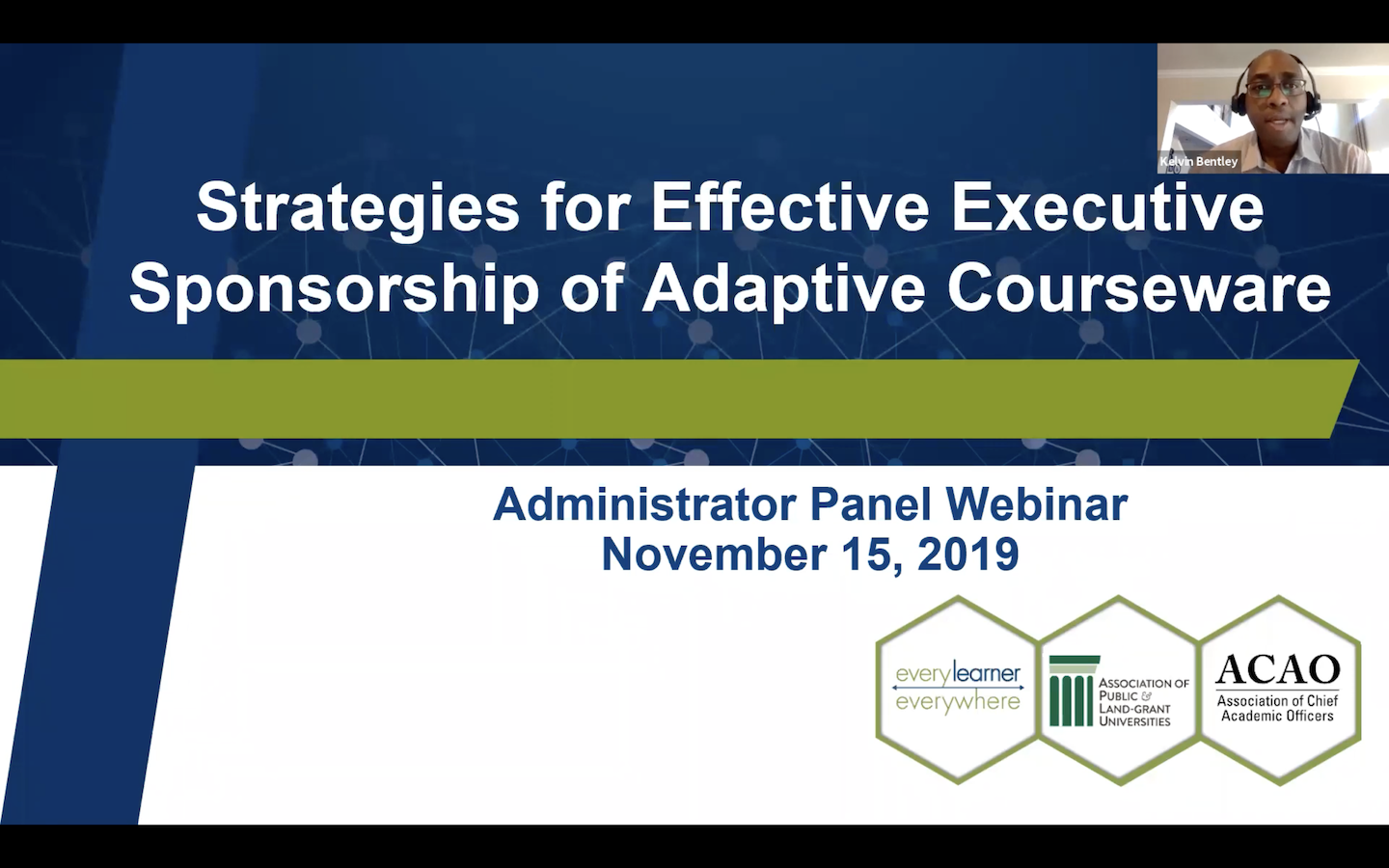
Academic leaders share their experiences working on the adoption and deployment of adaptive courseware initiatives and digital learning resources at their institutions.

In this webinar, faculty share how student experiences and feedback has improved their overall use of adaptive courseware.
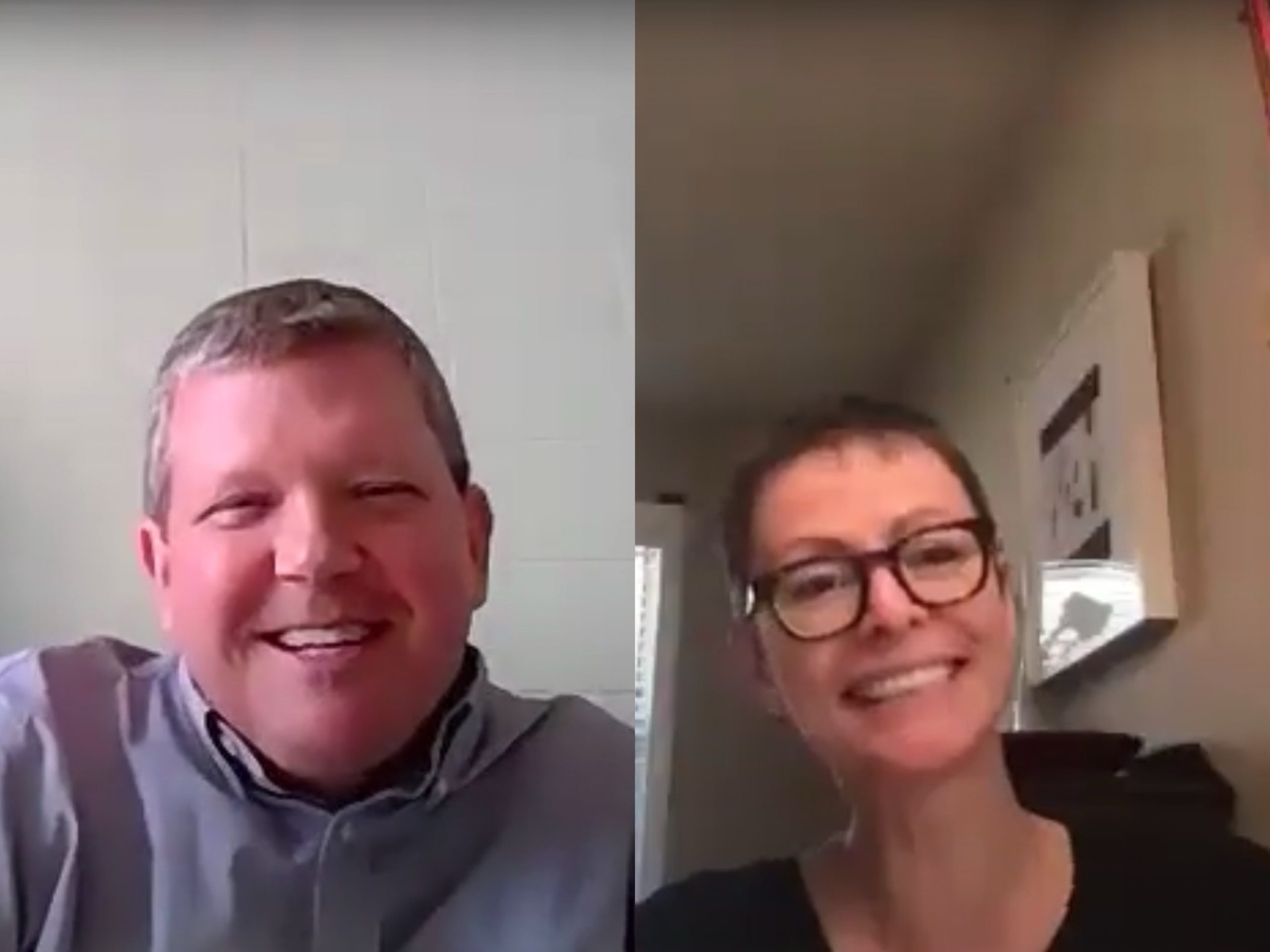
In this webinar, faculty discuss the resources needed for a successful implementation of adaptive courseware and the importance of the relationship with a courseware vendor.

This brief provides an overview of the current research on the effectiveness of adaptive courseware broadly and in the discipline of Chemistry.
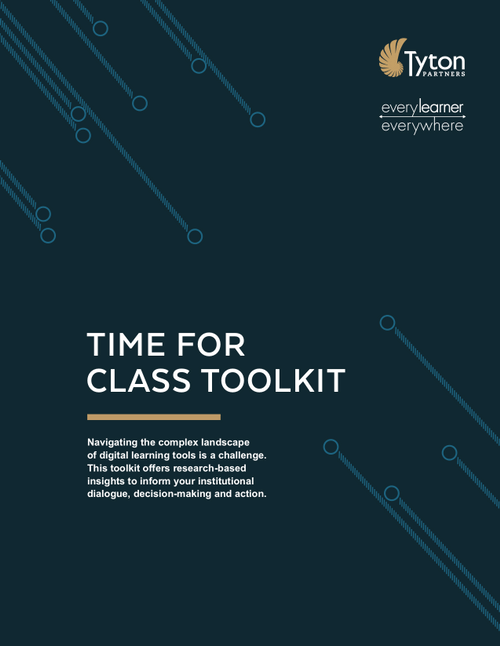
The Time for Class 2019 Toolkit is a set of research-based action briefs and tools designed to support institutional dialogue, decision-making and action.
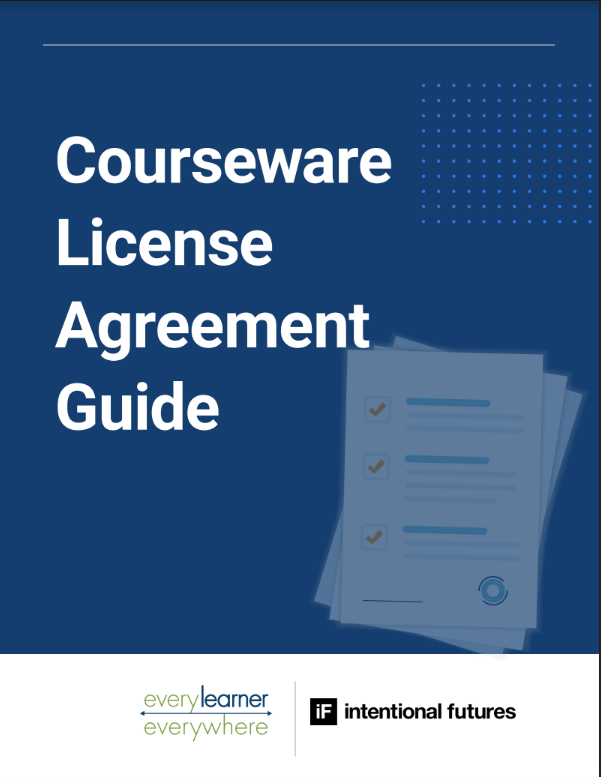
This resource is a set of tools to help you review your adaptive courseware license agreement.

























































































